
























• Farm business & estate management • Planning & development • Subsidies & grants • Land sales & acquisitions • Viticulture • Succession • Biodiversity net gain • Ecology • Natural capital • Residential and commercial property letting and management 01892 770339 www.c-l-m.co.uk Farm business consultants with our roots in the South East Full review begins on page 16 Est 1982 NEW YEAR, NEW OPPORTUNITIES FARM CONSTRUCTION Investment in new infrastructure must balance cost and value CATTLE SHOW REVIEWS 2022 NEW THE INDUSTRY COMES TOGETHER TO TACKLE ABATTOIR CAPACITY ISSUES









































































































































































































































































































































































































































































































































































































































































































































































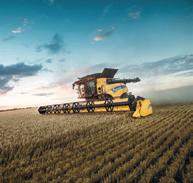

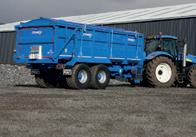
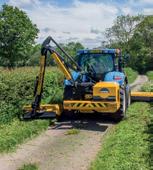
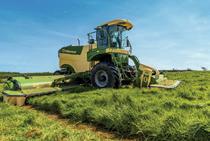
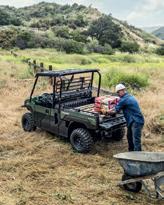










































































® GROW YOUR BUSINESS WITH US. Reach your target audience in 2023 by advertising your products/services in our popular titles. Book now by calling Jamie on 01303 233883 or email jamie.mcgrorty@kelsey.co.uk ™ JANUARY 2023 FEBRUARY 2020 £2.95 FEBRUARY 2020 £2.95 K E L S E Y m e d i a e a K E L S E Y m e d i a £2.95 £2.95 K E L S E Y m e d a K E L S E Y m e d a 1 MARCH 2023 VARIABLE CHAMBER BALER 2’–BaleSize 6’3”0.6–1.9m See inside front cover YOU ARE INVITED TO HAYNES NEWBURY OPEN DAY Date: 19th January 2023 Time: 10:30 – 19:00 Address: Ridgeway Works, Ball Pit Road, East Ilsley, Berkshire RG20 7DJ Winchester SO21 3DN 01962 794100 Newbury RG20 7DJ 01635 281222 Horsham RH12 3PW 01403 790777 Wrotham TN15 8LW 01732 880880 Uckfield TN22 5RB 01825 841100 Great Chart TN26 1JJ 01233 822205 Please follow our facebook page for the latest FM0123.indd 1 LAND & PROPERTY CONSULTANTS Expert advice for viticulture: Site-finding Sales & acquisitions Planning applications Environmental schemes & grants Call us on 01892 770339 Matthew Berryman 07710 765323 matthew@c-l-m.co.uk INSIDE Event buzzing with enthusiasm Keeping ahead of the game Sampling English wine The Grange Winery in Hampshire is a place where past, present and future are inextricably linked. JANUARY 2023 Past, present and future Vineyard01Jan23.indd 1 14/12/2022 16:56 Farm business & estate management Planning & development Subsidies & grants Land sales & acquisitions Viticulture Succession Biodiversity net gain Ecology Natural capital Residential and commercial property letting and management 01892 770339 www.c-l-m.co.uk Farm business consultants with our roots in the South East Full review begins on page 16 Est 1982 NEW YEAR, NEW OPPORTUNITIES FARM CONSTRUCTION Investment in new infrastructure must balance cost and value CATTLE SHOW REVIEWS THE INDUSTRY COMES TOGETHER TO TACKLE ABATTOIR CAPACITY ISSUES SEF01Jan23.indd 22/12/2022 14:30 VISIT US: www.southeastfarmer.net | www.farmmachinery.co.uk | www.vineyardmagazine.co.uk
www.southeastfarmer.net




SOUTH EAST FARMER
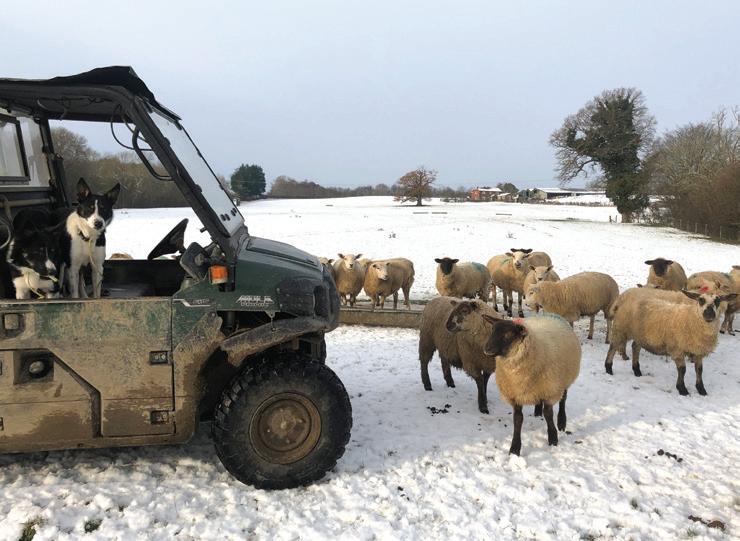
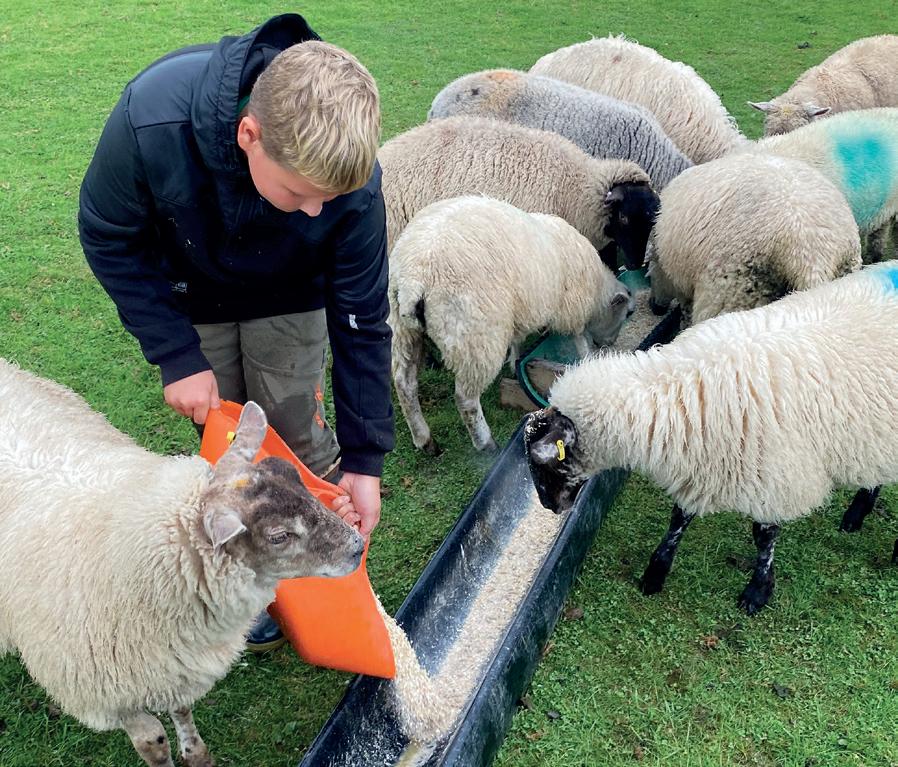
Kelsey Media, The Granary, Downs Court Yalding Hill, Yalding, Maidstone, Kent, ME18 6AL 01959 541444























EDITORIAL
Editor: Malcolm Triggs Email: sef.ed@kelsey.co.uk Photography: Martin Apps, Countrywide Photographic
PUBLISHER Jamie McGrorty 01303 233883 jamie.mcgrorty@kelsey.co.uk
GRAPHIC DESIGN










































































Jo Legg 07306 482166 jo.legg@flair-design.co.uk
MANAGEMENT
CHIEF EXECUTIVE: Steve Wright
CHIEF OPERATING OFFICER: Phil Weeden
MANAGING DIRECTOR: Kevin McCormick
PUBLISHER: Jamie McGrorty
RETAIL DIRECTOR: Steve Brown

RENEWALS AND PROJECTS MANAGER: Andy Cotton
SENIOR SUBSCRIPTION




MARKETING MANAGER: Nick McIntosh

SUBSCRIPTION MARKETING DIRECTOR: Gill Lambert
SUBSCRIPTION MARKETING MANAGER: Kate Chamberlain
PRINT PRODUCTION MANAGER: Georgina Harris
PRINT PRODUCTION CONTROLLER: Kelly Orriss
DISTRIBUTION
Distribution in Great Britain Marketforce (UK) Ltd, 3rd Floor, 161 Marsh Wall, London, E14 9AP Tel: 0330 390 6555



PRINTING
Acorn




























Kelsey Media 2022 © all rights reserved. Kelsey Media is a trading name of Kelsey Publishing Ltd. Reproduction in whole or in part is forbidden except with permission in writing from the publishers. Note to contributors: articles submitted for consideration by the editor must be the original work of the author and not previously published. Where photographs are included, which are not the property of the contributor, permission to reproduce them must have been obtained from the owner of the copyright. The editor cannot guarantee a personal response to all letters and emails received. The views expressed in the magazine are not necessarily those of the Editor or the Publisher. Kelsey Publishing Ltd accepts no liability for products and services offered by third parties.
Kelsey Media takes your personal data very seriously. For more information of our privacy policy, please visit Kelsey Media takes your personal data very seriously. For more information of our privacy policy, please visit https://www.kelsey.co.uk/privacy-policy/ . If at any point you have any queries regarding Kelsey’s data policy you can email our Data Protection Officer at dpo@kelsey.co.uk.
www.kelsey.co.uk
NEWS
REPORTS 04 Better, but not good enough. 05 Increase in seasonal workers welcomed. 06 A singular lack of response. REGULARS 14 MONICA
It's a matter of fighting for survival. 22 NIGEL AKEHURST VISITS... Nigel
to find out more
an award-winning
farming business. 29 SARAH CALCUTT New year resolutions. 31 STEPHEN CARR 33 ANITA HEAD 34 ALAN WEST 36 ADVICE FROM THE VET The farming calendar. 38 NICK ADAMES 56 LEGAL 59 LAND AND FARMS JANUARY 2023 CONTENTS 42 44
&
AKEHURST
visits South Brockwells Farm
about
family
Cover picture: ©Martin Apps, Countrywide Photographic ® 14 22 In association with 22nd November 2023 Kent Event Centre, Detling, Maidstone, Kent ME14 3JF SAVE THE DATE Sponsored by Vitifruit Equipment Sales and Hire 2023 FEATURES 16 VINEYARD & WINERY SHOW An event buzzing with enthusiasm. 39 CATTLE SHOWS South Eastern Prime Stock Winter Fayre. Colchester Prime Stock Show. Ashford Cattle Show. 44 FARM CONSTRUCTION Investment in new infrastructure must balance cost and value.
Pig prices have had a better year but need to rise another 10% to give producers some hope for the future, South East Farmer has been told.
Jack Bosworth, part of the F J Bosworth and sons family business at Spains Hall Farm, near Chelmsford in Essex, said prices had been rising steadily since hitting a rock bottom £1.41 per kilo in March of this year.
“In November last year pigs sold from one of our units averaged £1.63 a kilo. A year on they are selling at £1.99, which is 36p per kilo higher and a lot better than the March price, but it needs to keep rising,” he said.
“Inputs have also been going up, with the extra cost of feed taking about 15 or 16p per kilo out of that 36p, along with loan costs – say another 2p a kilo – and then rising energy costs. In the end things are slightly better, but it’s still a struggle.
“We need to see at least another 10% on
BETTER, BUT NOT GOOD ENOUGH
the price to see the start of a recovery. £2.20 a kilo would put us in a decent place, but we are running a modern and efficient unit; others are likely to need the price to be closer to £2.40 to be comfortable.”
Looking forward, Jack said the industry was keen to see the results of DEFRA’s consultation on fairness in the supply chain and for positive measures to be brought forward. “And we need to continue to encourage people to eat home grown pork,” he added.
Figures released by the Agriculture and
Horticulture Development Board suggested that the average price per kilo had fallen below £2 for the first time since mid-September, with the fall attributed to particularly low prices being paid by some large national processors. AHDB figures suggest prices hit a high of 200.72 per kilo in November.
The National Pig Association (NPA) said the UK price remained under pressure from significantly cheaper EU imports, despite increased values in key producers Germany, Belgium and the Netherlands.

LEADING VOICES JOIN FOOD SECURITY CALL
Chair of the Environment, Food and Rural Affairs Committee Sir Robert Goodwill has welcomed a contribution to the debate about food security from the former Director-General of MI5, Baroness Eliza Mannigham-Buller.
Speaking at the NFU’s fifth annual Henry Plumb lecture, Baroness Manningham-Buller said the UK’s food supply was “part of our national security, including those ‘essential workers’ who grow and harvest it and produce crops, vegetables, fruit, and even wine”.
Sir Robert Goodwill said he welcomed Baroness Manningham-
Buller's contribution, adding: ”She is right to highlight the links between food security and national security, particularly in these extremely worrying times of war in Europe, high food inflation and relentless pressures on our farmers and food producers.
“The committee’s investigation into this topic is still ongoing and we will be hearing from a DEFRA Minister in the New Year to discuss government policies on self-sufficiency and land use to see how we can ensure the UK continues to benefit from a robust, fair and resilient food supply chain.”
JANUARY 2023 | WWW.SOUTHEASTFARMER.NET
NEWS
4
INCREASE IN SEASONAL WORKERS WELCOMED
Christmas came a couple of weeks early for the South East’s fruit growers with confirmation from DEFRA that 45,000 visas for seasonal workers will be available for horticultural businesses next year, with the potential to increase by a further 10,000 if necessary.
Recruitment expert Doug Amesz, who runs Faversham-based AG Recruitment – one of the Home Office’s approved recruitment firms –with wife and fellow founder Estera, welcomed the news.
“It’s excellent news all round and very welcome,” he said. “It’s a bit on the late side and unexpected but it should give growers the clarity they need and the confidence to move forward.”



Doug said that against the backdrop of last year’s seasonal worker allowance of 30,000 with a potential extra 10,000 that shrunk to 8,000 when the rest of the places were ringfenced for poultry workers, the 2023 figure was particularly impressive and reflected a change of direction by the Home Office. “The tone seems to have changed and there is no longer talk about tapering down,” he said.
Doug said there was still a need to clarify the future of the scheme in the medium and long term, something that was echoed by NFU Deputy President Tom Bradshaw, who said his organisation would “continue to ask for a minimum of a five-year rolling SAW scheme to give growers the confidence to invest in their businesses, and boost Britain’s production of nutritious and affordable fruit and vegetables”.
He said the increase was “a positive step forward” and would be “a relief for many growers who are currently struggling to find the skilled workforce needed to continue producing the nation’s fruit, vegetables and ornamentals”.
He added, though: “For some growers, this announcement will have come too late with some already having made the difficult decision to reduce production in the coming season.


“Growers have faced a really tough year, with soaring energy and fertiliser costs only adding to the pressure caused by significant workforce shortages, which resulted in £60m worth of fruit and vegetables being wasted in the first half of 2022 alone. We expect the coming 2023 season to be equally challenging.
“We’ll be closely monitoring the situation this season, and given the significant pressure growers are currently under, it’s important that any decision to release the further 10,000 visas is timely and made ahead of the peak season.”
Doug also said that both the Home Office and DEFRA had made it clear that there would be a renewed emphasis on worker welfare. Operators would also be tightening their procedures and growers would be expected to follow suit in order to make the industry sustainable, he added.
OPINION
No need to be fastest
So, here’s to 2023 and what will inevitably be another roller coaster ride for farmers, growers and anyone else connected with the remarkable world of agriculture.
While 2022 ended with good news for growers in the form of a prayer-answering 45,000 seasonal worker permits for 2023 and the potential for that to rise by an extra 10,000 over the year, there will undoubtedly be plenty of other challenges as the year unwinds, from input and energy prices to the unpredictable impacts of climate change.
Tackling the shortage of local abattoirs will be high on the agenda for Guy MacNaughton and his LARK team, backed by positive support from other local facilities and in spite of the lack of any response from the likes of DEFRA and the FSA, the organisations that should surely be leading on the issue.
Despite the challenges, farmers will undoubtedly continue to find a way to feed the country and their own families by showing the resourcefulness and business acumen that has seen them tackle so many past issues.
There will always be opportunities to grow and develop, and far-sighted farmers will grasp those opportunities and make sure they are ahead of the field. It reminds me of a genuine conversation I was told about while working, for my sins, in local government many years ago.
I was then a regular runner and used to train at lunchtimes with a group that included a much faster colleague (Elite start in the London Marathon kind of fast) who worked in the council’s legal department.
He was telling us that he had been out to visit a wild cat enclosure with a larger, far less active colleague from the council’s health and safety team to check it met the various regulations. The sight of a leopard in one of the cages prompted Large Chap to say that he hoped the gate was securely locked.
“I’m not worried,” said my friend. “I’m pretty fast.” Large Chap rightly pointed out that even my friend couldn’t outrun a leopard. “No,” he agreed. “But I can outrun you.”

Here’s to a prosperous new year in which, even if we are not the fastest, we are fast enough to spot and exploit the opportunities that present themselves.
EMAIL YOUR VIEWS, LETTERS OR OPINIONS TO: sef.ed@kelsey.co.uk or write to the address on page 3
5 TO ADVERTISE CALL 01303 233883
®
A SINGULAR LACK OF RESPONSE
Campaigners fighting for the livelihoods of smaller livestock farmers have been disappointed by a singular lack of response from the regulators.
While LARK (Local Abattoirs R Key) has continued to call for urgent action following the decision by the owners of Tottingworth Farm to close the doors at the end of January, DEFRA’s head of agriculture John Powell has suggested local farmers should simply haul their livestock as far as Essex, via the Dartford Crossing, to be slaughtered.
Abattoirs at Downland Traditional Meats and Forge Farm meats have rallied to the cause and are working hard to increase their capacity, but with low food miles and local slaughter an important part of the premium offer from small livestock producers – campaigners have stressed that more local solutions are still urgently needed.
“INSUBSTANTIAL” RESPONSES
With the Tottingworth decision taken, the campaign now is about reducing the burden of regulation and creating an environment in which small abattoirs can survive and thrive, but the responses from DEFRA, the Food Standards Agency (FSA) and Farming Minister Mark Spencer have been “insubstantial at best” in the words of lead campaigner Guy MacNaughton.
The consultant and part-time farmer has spearheaded a tireless and high-profile campaign that has included addressing the All-Party Parliamentary Group for Animal Welfare at the end of November and being interviewed on the BBC’s Farming Today programme.
He has written several letters to Mr Spencer but has yet to receive a reply, while DEFRA agriculture head John Powell’s reply was quick to express support for the industry but offered
no practical help.
“I want to firstly reiterate that the Government recognises the important role small and medium abattoirs play in supporting local farmers and the rural economy. We are very much committed to engaging with the abattoir sector to maintain a robust and competitive industry,” he began, before adding: “I appreciate that the loss of the Tottingworth Abattoir will impact a number of farmers in East Sussex. However, I am aware that there are other abattoirs in Kent, Essex and Sussex that are in a position to expand their operations to take on the work that the Tottingworth closure will create.”
Guy MacNaughton responded: “We know there are other abattoirs in the South East doing a fine job, but that really misses the point. Local farmers putting together meat boxes for their customers don’t want to drive their animals to abattoirs many miles away – in our case 50 miles, or an hour and a half, each way – and then bring the carcasses back again.
FOOD MILES
“Part of their offer is around food miles and sustainability, and driving from Kent or East Sussex to Essex and back hardly meets those criteria. It’s not great for the Government’s net zero ambitions, either.
“Meanwhile I have sent DEFRA a list of proposals on transition support for local abattoirs, including allowing official controls to be delivered by local vets, providing organisational support for Downland Farm and Forge Farm and providing funding to secure chilling capacity and logistics support, but they have ignored that.
“Mark Spencer did at least attend the All-Party Parliamentary Group, which is unusual for a Minister, as did Emily Miles, the CEO of the Food Standards Agency and John
Powell, but the meeting had been cut from 90 minutes to 60, so little of substance was discussed.
EVIDENCE
“Evidence to the all-party committee highlighted the number of reports already written about the sector, in particular the FSA’s own report from 2007, and it is clear that if any one of these had been acted upon at the time, the small abattoir sector would look totally different and be in a much healthier position now to deliver local services to local farmers and consumers.
“It’s also quite clear that very few people now working at DEFRA and the FSA have any knowledge of the industry or its history. Only one of the executive team has been in post for more than a couple of years.”
On the BBC’s Farming Today Guy explained how significant Tottingworth’s closure was for its 900 customers who would struggle to make alternative arrangements “at a time when more people are buying locally reared, traceable, high welfare meat”.
Asked about Mark Spencer’s comment that the Government was working to reduce the burden of regulation on smaller abattoirs, he agreed it “would help”, but added that nothing had been done. Instead, he said, small abattoirs were being “regulated out of existence by the FSA”.
After the FSA’s Emily Miles agreed on the same programme that “local abattoirs play a vital role in supporting local food systems”, Guy wrote to her, copying in Mark Spencer and DEFRA, to point out that it was “for DEFRA and the FSA, without any further delay, to implement a joined-up plan in support of small abattoirs and livestock farmers”.
He told South East Farmer as the magazine went to press that he has yet to receive a reply.
JANUARY 2023 | WWW.SOUTHEASTFARMER.NET 6 NEWS
WHY SMALL ABATTOIRS MATTER
�� HUGE DEMAND
COMMITMENT AND CLARITY NEEDED
Two South East abattoirs are ready to support farmers hit by the closure of Tottingworth Farm but need commitment and clarity in return.
“We
fulfil
of
huge demand there is out there for local, high quality, high welfare meat. To fulfil that demand we need a local abattoir...”
Both Luke Smith at Downland Traditional Meats and Steve Bailey at Forge Farm Meats are keen to support the industry and are considering how best to do that, but both have said they need certainty about the future.
“It’s really sad to see Tottingworth go,” said Luke. “It’s tragic for the industry and will make life difficult for many, many farmers.
COMING TOGETHER
“I believe that if we all come together, we can find a way to tackle the problem and I am already planning an extra kill day each week, but I need to have a better understanding of the demand before investing too much in increasing capacity.
“A number of farmers have asked if I can help but are a bit shy to commit to actual numbers. Some of the conversations have been a bit vague, and it’s difficult to run a business without a good idea of demand, particularly when it could involve a considerable amount of money.”
“There’s talk of a collection centre and I could play a part in that, but I need to know the demand. And where’s the best place for it? If we are walking into the unknown, let’s at least do so together.”
DETERMINED TO SUPPORT THE INDUSTRY
At Forge Farm Meats, Steve Bailey said he was equally determined to support the industry but again needed commitment and was concerned about the potential investment needed to help meet an uncertain demand.
Steve has already tightened up the layout at Forge Farm to make room for a beef line but would need to find £100,000 – and thinks DEFRA should help with the funding.
“DEFRA want livestock to travel shorter distances, and for that to happen you need to have local abattoirs to meet local need. Expecting farmers to travel to Essex via the Dartford Crossing certainly doesn’t tie in with that ambition. I think DEFRA should be supporting the industry, even if it’s by way of some kind of loan,” he said.
CRITICAL
�� WELFARE ISSUES
“With no local abattoir in Sussex, the finishers who take my calves and lambs may find their work becomes uneconomic, reducing my own sales. And loss of a small local abattoir may also affect the viability of Hailsham market. There is also the welfare issue of animals having to travel further to slaughter. And we may see less local meat sold in our butchers.”
Kevin Hawes, Hartfield, East Sussex

Luke, who started his career with two sheep and an acre of land in Westcott, took over at Downland, in Henfield, in September 2021, and also farms cattle sheep and pigs.
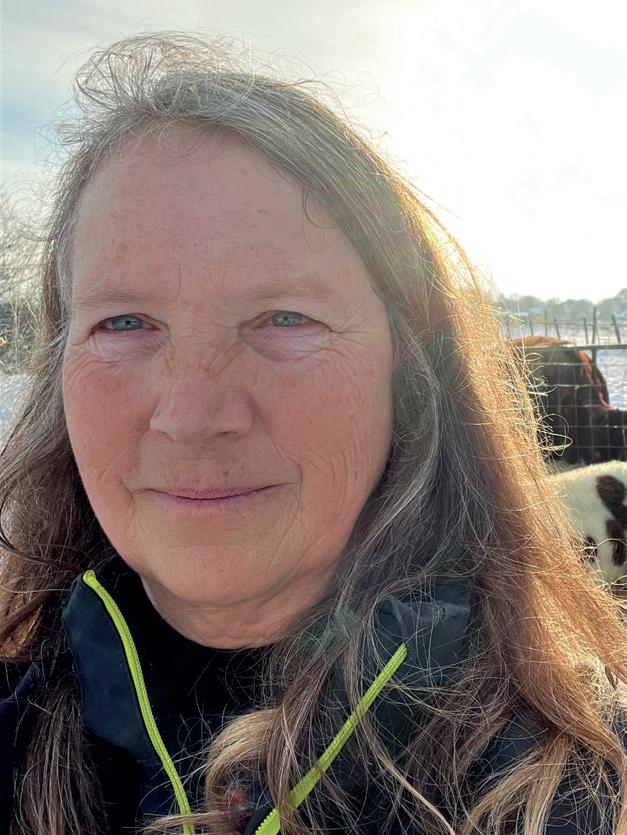
“Just over a year ago I was in the same position as any other farmer, needing the support of a local abattoir, so I understand what they need and the difficulties they are now facing, but we can meet these challenges if we stay positive, work together and get organised,” he said.
“I have capacity and I offer a full range of services, slaughtering lambs, pigs, beef cattle and goats plus butchery, processing and despatch. I am planning to add Thursday as an extra kill day for people who use Hailsham market, but I need to know what’s on the table. How can I support farmers? What do they need and what demand is there for any extra capacity I provide?
Steve is also critical of the regulatory pressures from the Food Standards Authority (FSA) that have also left him wary of investing large sums of money in new facilities.
“I’ve had to spend a large amount of money on legal fees fighting the FSA – even though I’ve won every case,” he said. “Even when you win and avoid a fine, you still lose out because of the costs of defending yourself. I could be using that money to add the facilities that I need to support the farmers hit by the Tottingworth closure. It’s short-sighted. The FSA says it wants to work with the industry, but it really doesn’t show.”
While considering future investment, Steve is already expanding his operation to cover the shortfall as far as possible. “I would rather have seen Tottingworth stay open because it was a vital part of the community, but I’ll do my bit to help. We really can’t see livestock farmers go under because of this – that’s just not right.”
WWW.SOUTHEASTFARMER.NET | JANUARY 2023 7 TO ADVERTISE CALL 01303 233883 NEWS
help
some
the
Lesley Pope, Pembury, Kent
COLOURFUL EVENT
There was a carnival atmosphere for the 75th anniversary dinner of the Edenbridge, Oxted, Redhill and Sevenoaks NFU field contest, held at Flower Farm Godstone.

The venue was festively decked out with bunting and balloons as farmers from across the four NFU regions got together to celebrate a year’s work and recognise the winners in a series of closely fought competitions.

The event was hosted by farmer Patrick Deeley, who said he had been approached about providing the venue for the dinner in the spring. “Farmers felt it would be nice to celebrate the special occasion somewhere different, and as my late father helped run the
event for over 30 years as group secretary for the NFU it seemed to me to be a wonderful way to commemorate his work.
“He so much enjoyed working with farmers, who take huge pride in what they do to provide us with a safe, secure reliable source of food produced to some of the highest standards for health, welfare and environment in the world.”
Around 160 people attended the colourful event, with guest speaker David Exwood, NFU Vice President, also presenting the prizes.
Overall winner of the 2022 field contest was Westnedge & Knight from Norwood Hill, while the branch winners were: Edenbridge – Downing Partnership and Lingfield Lodge
Farm; Oxted – F J Nicholas; Redhill –E P Knight and R P Kent & Son; Sevenoaks –Montreal Estate.
The Farming Ideas category was won by Church Farm Services, the Conservation prize and the Farms category went to W Alexander, and R P Kent & Son won the cereal championship with WW Extase. The Wilmot Cup for the cleanest crop went to A R & L S Young.
Livestock results included Beef Cattle over 12 months, won by Church Farm Services, Dairy X Cattle over 12 months (J Berryman) Beef Calves under 12 months (Montreal Estate), Dairy X Calves under 12 months (M J & M L McCubbine) and Sheep (W & P New).
£60,600 TO GOOD CAUSES
An Essex insurance broker with strong connections to the equine world is looking for charities to share in a cash handout of £60,000.
SEIB, formerly South Essex Insurance Brokers, will celebrate its 60th anniversary next year by giving £60,600 to good causes at the sixth annual SEIB Awards in July 2023. In recent years, through SEIB Giving, the broker has helped good causes to the tune of 250,000.



One winning charity will receive a grant of £15,060 at the 2023 awards, a small charity with a turnover of under £100,000 will receive £12,060 and the remaining £33,480 will go to eight runners-up.
All winning charities and not-for-profit organisations will be nominated by the general public before being voted for by customers of SEIB. Nominations will close at 5pm on 16 January 2023. Only charities with an annual turnover below £10m are eligible.
The 2023 Awards will feature the SEIB Insurance Brokers Yard of the Year Awards in association with Horse & Hound and, for the first time, British Equestrian. The awards celebrate the country’s top livery yards, riding schools, RDA centres and competition venues.

JANUARY 2023 | WWW.SOUTHEASTFARMER.NET 8
NEWS
Festive tractors brought a smile to the faces of local people and raised an impressive sum of money when Weald of Kent Young Farmers organised their Light It Up Tractor Run around Goudhurst, Cranbrook, Staplehurst and Marden.



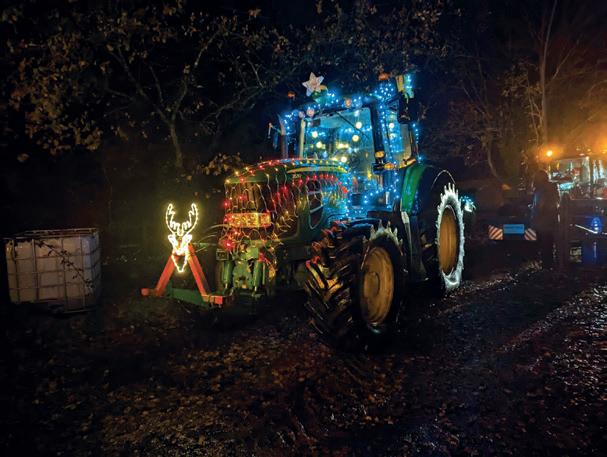
The oldest tractor was a 1989 Fendt 309LSA driven by Angus Seymour, the youngest driver and a keen member of the Weald of Kent Young Farmers Club. The biggest tractor was a magnificent Claas Axion 960 Terra Trac at 450bhp. This was driven by Richard Budd from Stevens Farm, Hawkhurst.
The well-supported event – despite competing with World Cup football and wet weather – has so far raised more than £4,000 for Kent Air Ambulance and club funds, with around 30 tractors and one lorry taking part.
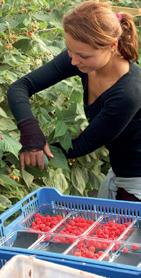
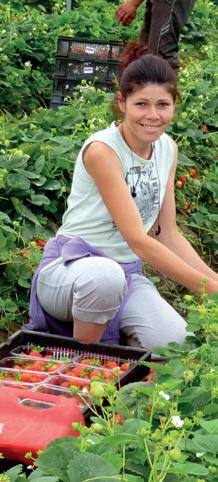
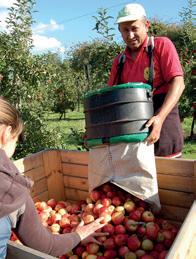
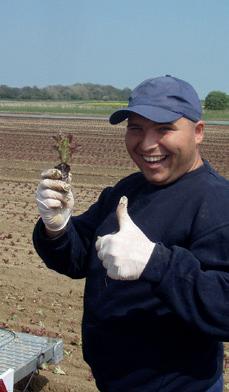
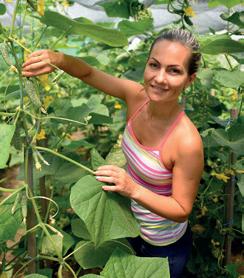
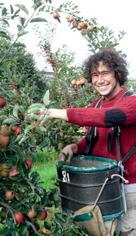
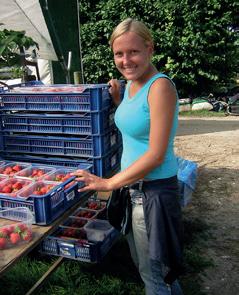

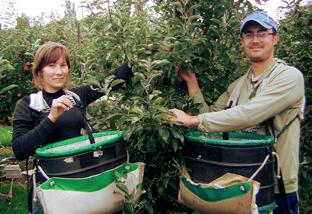
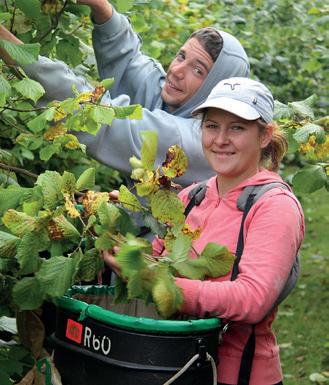
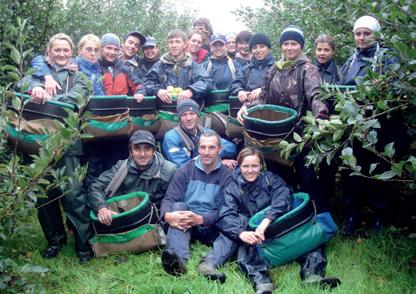
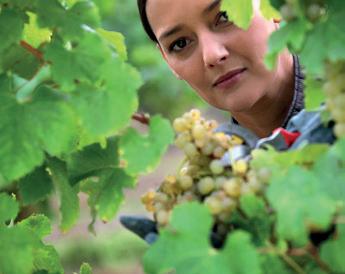
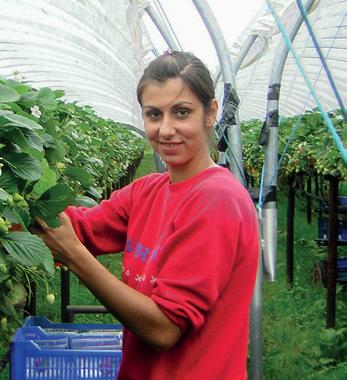
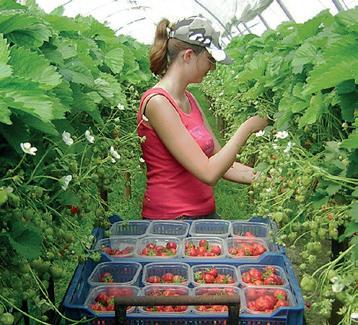


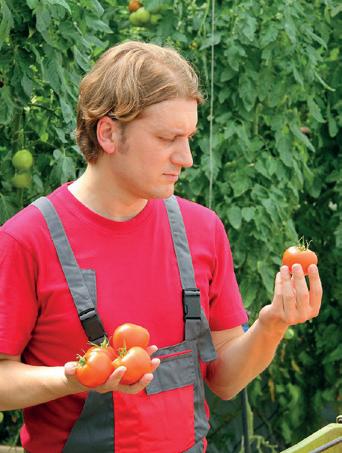

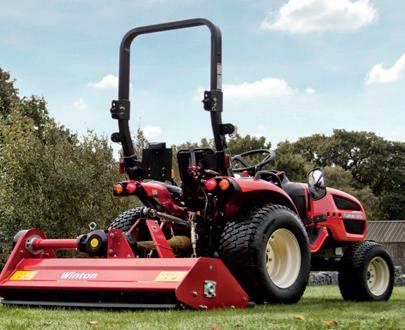
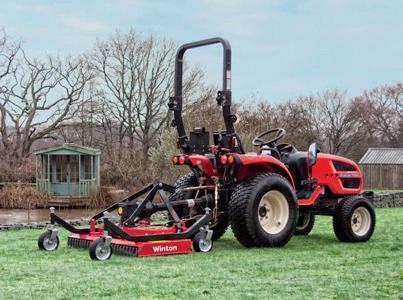

The event was sponsored by Osmonds Transport and Planing Ltd and Lower Ladysden Farm and organised by Claire Eckley with support from Weald of Kent Young Farmers. The overall Best Dressed Tractor prize of dinner for two, donated by the Star & Eagle in Goudhurst, was won by Richard Budd and a second competition for Weald of Kent YFC members, with a prize provided by N P Seymour Ltd, was won by Dan Goodman.
Bob's Christmas Tractor Run on the Sunday before Christmas saw a 35-tractor convoy applauded by an enthusiastic crowd as it travelled through Little London, Silchester, Tadley, Bramley and Sherfield in Hampshire.
Organisers said the aim was “to spread some Christmas joy and raise money for Victoria's Promise and Basingstoke Paediatric Ward”, with generous members of the public donating well over £3,000.

WWW.SOUTHEASTFARMER.NET | JANUARY 2023 9 TO ADVERTISE CALL 01303 233883
LIGHT IT UP 35-TRACTOR CONVOY
SALES AND SERVICE M A BROWN & SONS LTD & M&A Brown & Sons Ltd, Iden Green Farm, Cranbrook Road, Goudhurst, Kent TN17 2PA info@mabg.co.uk 01580 211599 www.mabg.co.uk Comprehensive range of professional tractors from 19hp to 75hp WORLD CLASS POWER TOOLS Better people Best placed SEASONAL LABOUR PLACEMENT agrecruitment.eu|01227 806 789
“COMPASSIONATE HUMANITY”
Martin Boulden, 20 August 1956 – 10 December 2022
On the day Martin Boulden was born, Doris Day was at the top of what was then called the Hit Parade with Que Sera Sera.
It’s a sentimental and much-loved ballad that Martin’s older sister Yvonne Wanstall believes set the tone for Martin’s life, which sadly came to an end on Saturday 10 December 2022 at the age of 66.
“The song says ‘Whatever will be, will be’, but its sentiment is all about compassionate humanity, and that’s what Martin demonstrated every day of his life," said Yvonne, who said she could remember the day her brother was born “as if it were yesterday”.
That day was 20 August 1956, a mid-harvest event that led to Yvonne joining her younger brother on a combine somewhere in the fields around Aldington on that same day virtually every year. “I always sat on the combine with him for ten minutes to wish him a happy birthday before letting him get back to work,” she recalled.
While best known in farming circles for his tireless work at the helm of G L Boulden and Sons, which farms 3,500 acres spread over 13 parishes in and around Aldington, Martin also played a large part in the local community.
A former parish council chairman who would have celebrated a quarter century as an Aldington Parish Councillor early in 2023, he also served as a part-time fireman for 32 years, giving back to the community with which his family has now been associated for six generations.
He was also proud of his role as one of the
Lords of the Levels, now an honorary title but linked to the Corporation of the Romney Marsh and its 1252 charter under which it was responsible for the drainage of the marsh. “The Lords of the Levels worked with the Internal Drainage Board to keep the marsh drained until relatively recently,” Yvonne explained. “He was honoured to be asked to join them.”
Two local charities also benefited from Martin’s service as a Trustee. “He worked every hour there was on the farm, but he could always find time to help someone and he really would do anything for anyone,” Yvonne recalled. “He will be sadly missed not just by the family but by the much wider community.
Martin will also be missed by the market community, having sold cattle and sheep through Ashford Market for many years. His office wall at Court Lodge Farm is decorated with certificates highlighting successes at the annual Ashford Cattle Show.
Also on the wall of the office is a black and white photograph of a Claas Matador combine harvester working its way steadily through a field of wheat, a picture which summed up his love of the job and the changes he saw during an astonishing 50 years of driving ever more powerful combines.
He still had the original invoice for the Matador, revealing to South East Farmer when it celebrated his half century behind the wheel of a succession of the machines that the family had paid £5,500 – including an ‘out-of-season discount’ – for two of them in April 1962.
“It now costs me more than that each year to service that one,” he joked, pointing to the newest iteration, a Class Lexion 770 equipped with a 40ft header.
The family’s farming connection with Kent began with Martin’s great-grandfather David, who owned Pinn Farm in Bonnington in the late 19th century. David’s son George bought Ruffins Hill Farm in Aldington in 1908, growing wheat and oats on 150 acres of land and breeding horses for the Army, as well as keeping sheep.
Three of George’s four sons, Clive, John and Martin’s father Peter, joined the family business, and Martin, the fourth generation of the family business, continued to trade as G L Boulden and Sons in tribute to his grandfather and the farm’s heritage.
The family bought Court Lodge Farm in 1950, paying just £13,500 for 350 acres and five cottages, and the business continued to expand under Martin’s guidance, now assisted by son Paul. Including a considerable amount of tenanted land, G L Boulden and Sons now farms 3,500 acres spread over 13 parishes in and around Aldington.
By the time Martin left school in 1972 at the age of 16 he had already been helping out on the family farm for a few years, driving one of the business’s three combines for real while most of his contemporaries were still dreaming of learning to drive a car.
Sister Yvonne, seven year’s Martin’s senior and mother to Doug Wanstall, who farms at Bank Farm, Ashford, said that he was very much a family man.
Third in line and the only boy born to Peter and his mother Laura, he was very fond of sisters Christine, Yvonne and Ginny, who still works at Court Lodge Farm.
He and his wife Jean, another integral part of the farming team, had two children, Paul and Caroline, who are responsible for introducing the sixth generation to Aldington. Paul and wife Kristina have two children, Oliver and Sophia, and daughter Caroline and husband Ben also have two, Rupert and Beatrice.
“Farming was Martin’s life and he put his heart and soul into it, seven days a week,” said Yvonne. “And on the rare occasions when he wasn’t working, he was helping other people.”
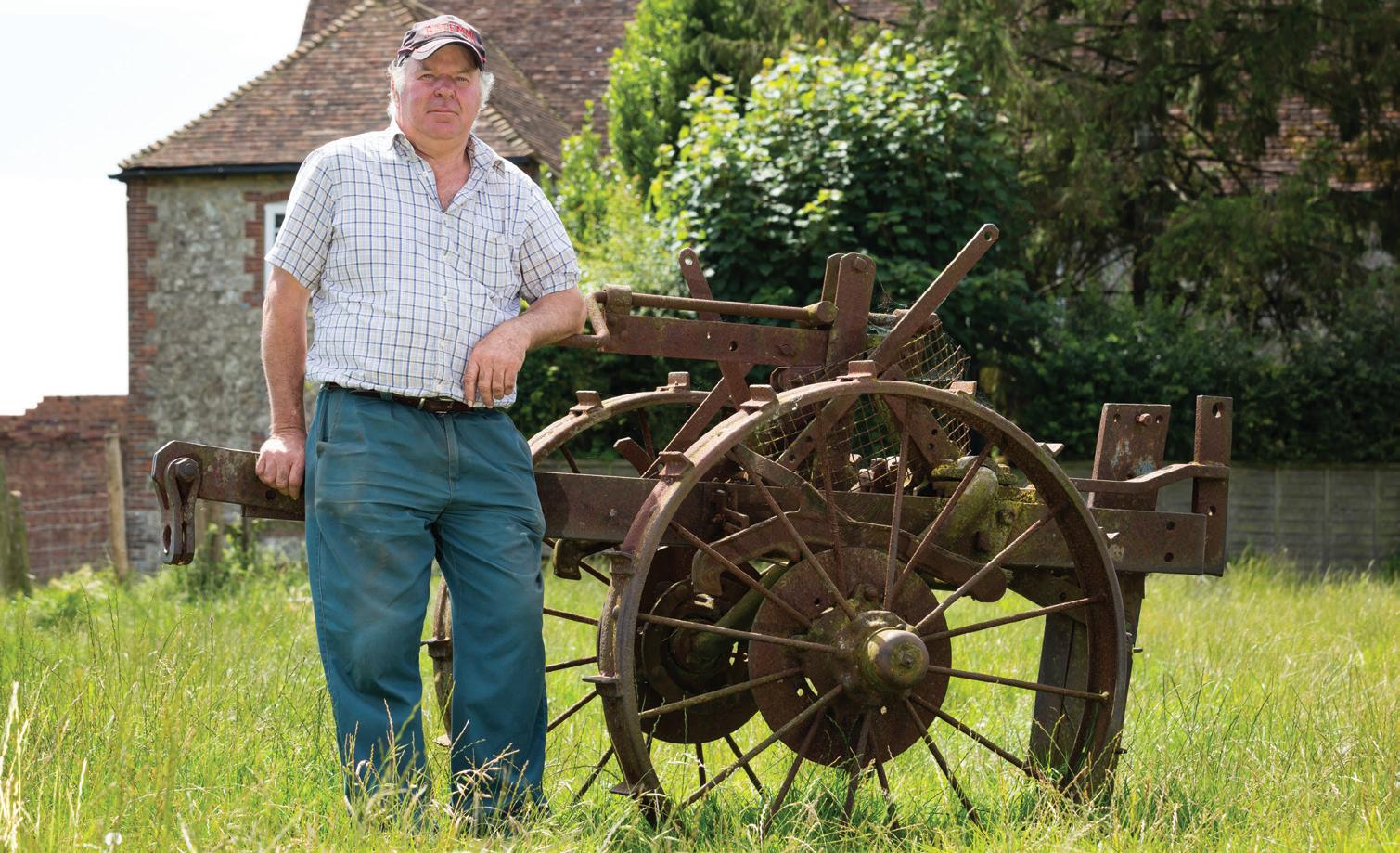
JANUARY 2023 | WWW.SOUTHEASTFARMER.NET
OBITUARY
10







































































































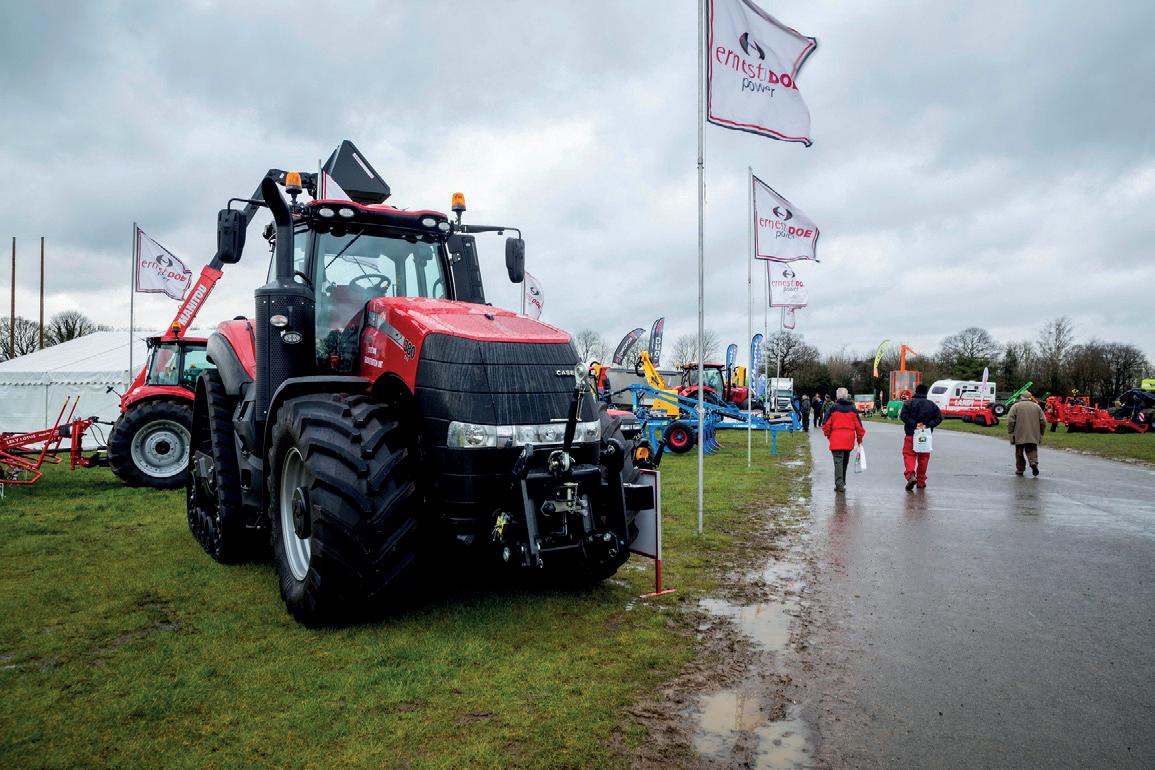

11 BELIEVE. ACHIEVE. SUCCEED. KENT'S ONLY RURAL AND LAND-BASED COLLEGE Hadlow Main Site & Greenwich Campus Saturday 28th January 10:00am–1:00pm 2023 Open Morning PRE-REGISTER AT HADLOW.AC.UK/EVENTS Par t of Nort h Kent College KENT'S FREE AGRICULTURAL AND MACHINERY SHOW BOOK YOUR FREE TICKET! 1MARCH 2023 Seminars Networking Trade Stands
CONCERNED ABOUT THE FUTURE OF LIVESTOCK FARMING
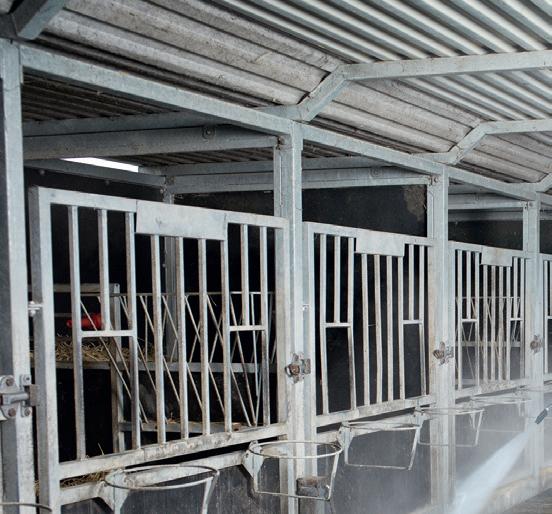
Dear Sir,
Having read the excellent article Fighting for the future of local abattoirs concerning the closure of Tottingworth Abattoir and the more general plight of small abattoirs (South East Farmer, December), I wanted to thank and congratulate the magazine for its coverage and support on this issue.
As someone concerned about the future of livestock farming as a result of managing a grassland farm in Sussex and my work for the High Weald Unit, I am all too aware that small abattoirs like Tottingworth are an absolute lifeline for farmers; they are essential for the viability and success of many farming livelihoods.
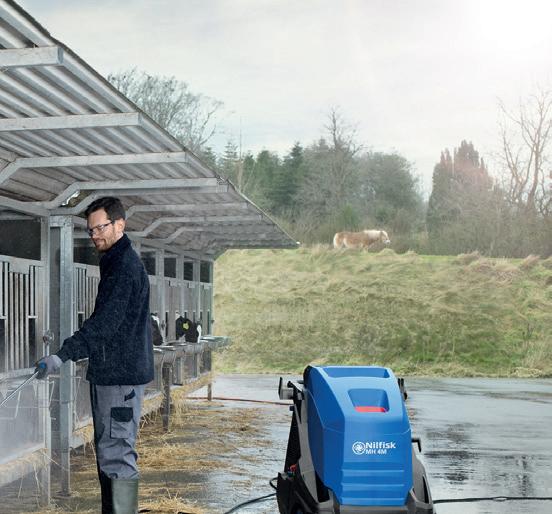
Also, it should not be forgotten that livestock grazing over many generations has produced beautiful landscapes across the country, many of national importance such as the High Weald Area of Outstanding Natural Beauty, and it is to the farming communities and the irreplaceable role of livestock that we all should look for the ongoing and future conservation and enhancement of our muchloved landscapes.
Like other places in Britain, the High Weald is ideally suited to livestock farming as our soils grow excellent grass. Well-managed livestock systems applying sustainable and regenerative farming principles improve the health of the soil and restore the natural fertility of the land.
Healthy soils on livestock farms can capture and store carbon while also producing nutrient-rich food and clean and plentiful water, while supporting abundant above-ground and below-ground biodiversity.
The loss of small abattoirs serving a particular area threatens all of this; farmers’ livelihoods, the growing of high-quality nutrient-rich food, the conservation of our landscapes and those many farmers that have already adopted or are moving towards sustainable farming systems.
Jason Lavender, Co-Director, High Weald AONB Partnership
SOUTH EAST FARMER
THERE SHOULD BE NO DISCHARGE OF RAW SEWAGE, EVER

Dear Sir, Dear oh dear! Nick Adames does like a good moan. What does he expect but losses if he keeps pinioned waterfowl near a documented footpath? Then, to cap it all, his bonfire night was rained off! His half empty glass contrasts sharply with Stephen Carr’s, whose glass is always half full, despite the many slings and arrows that beset farming.
Nick has again returned to the Environment Agency’s failure to speed Sussex’s sh*t to the ocean from repeated illegal sewage discharges by the local water company. The correct target is the water company and not the EA, which demonstrates Nick’s failure to grasp the financial and regulatory dynamics in play. There should be NO discharge of raw sewage, ever.
The current Government privatised the water companies and pushes deregulation, so it is hardly likely to spend more on its EA or OFWAT quangos.
Our privatised water companies are 75% foreign owned (as an example, Southern Water is 40% owned by American JP Morgan Asset Management). They pay over £1 billion in dividends annually and their nine CEOs take some £58m in salaries and bonuses.
Nick’s local company has been repeatedly fined for its egregious breaches; fines that are simply treated as business expenses. Investment in infrastructure has been lamentable, since it matters so little to the owners.


However I have a solution for Nick’s problem with his rifes and ditches coated with local loo paper. Block the ditches and rifes on his land to prevent any backflow. Let the nearby vegetation and hedges grow taller and richer. Convert the now wetter adjacent fields and pasture to speciesrich meadows for late summer hay, fertilised by silt deposition.
Complete the picture with a small herd of local pedigree Sussex cattle (or, better still, South Devons) that will enhance biodiversity and can use his unoccupied sheds in winter.
He will then be a beacon for biodiversity net gain, carbon sequestration and environmental regeneration. And free of sewage effluent! Natural England catchment sensitive farming advisers would be keen to help. What could be better – and it might provide new material for the monthly article.
Mike Kettlewell, Over Norton
ENGLAND NEEDS A LAND USE FRAMEWORK
Dear Sir,
I wish to draw the attention of your readers to a ground-breaking report from the House of Lords Land Use Committee which offers key recommendations to the Westminster Government.
The Making the most out of England’s land report seeks to highlight the factors that a long overdue land use framework must consider, including food, nature, housing needs and the push of net zero.
It recognises that deciding what to do with land is complex,


JANUARY 2023 | WWW.SOUTHEASTFARMER.NET 12
twitter
SEND YOUR VIEWS OR COMMENTS: SEF.ED@KELSEY.CO.UK
@SOUTHEASTFARMER facebook-square
LETTERS We are a leading supplier and an approved repair centre With 50 years trading in the cleaning industry. With our strong ties and long term relationship with the leading manufacturers 01825 705777 Unit 4, 72 Bell Lane Uckfield, East Sussex TN22 1QL enquiries@pressureclean.co.uk SALES SERVICE HIRE
contested and can involve difficult trade-offs. Outside the planning system, competing land use needs are not currently assessed by any overarching framework across England and there is no formal advisory or coordinating body outside government departments.

The Soil Association believes this is a really valuable report. We support the Westminster Government’s commitment to producing a national framework for land use and strongly urge government to heed these recommendations.
In particular, we support the recommendations for a comprehensive, multifunctional approach to land use, drawing in all relevant government departments, not just DEFRA, to create a coherent national framework that can be effectively integrated into regional and local land use frameworks.
It is also vital to give local communities a strong voice in this process and in any resulting plans. This is consistent with the approach the Soil Association advocates to support the transition to agroecology and regenerative forestry which will deliver significant benefits for people, nature and the environment.

To support this, the Government needs to bolster Environmental Land Management schemes and ensure independent advice for farmers alongside investment in farmer-led research and innovation.
I would echo the comments of the Chair of the Committee: “The Government cannot afford to deprioritise this issue. We urge the Government to set up a Land Use Commission with responsibility for creating a land use framework which will help identify and address current and emerging challenges and opportunities for land use in England. The framework is essential to support effective land use strategies and tackle the many challenges currently faced.”
Gareth Morgan, Head of Farming and Land Use Policy, Soil Association

DAIRY SECTOR IN DEEP TROUBLE
Dear Sir, When our current prime minister was but a humble MP with aspirations, he was in touch with Farmers for Action (FFA)’s David Handley on a number of occasions to discuss the ailing fortunes of the farming industry and particularly the dairy sector.
Each time he did so he assured David that the FFA’s campaigning for better prices was going about things all the wrong way, and if it were left to him, he would "sort it out".
Obviously he has had other things to occupy him since then because the sorting out has yet to materialise and the dairy sector – along with all the others – is still in deep trouble.
However, Mr Sunak and his government have unveiled a couple of Christmas presents which they obviously believe will lift the mood in the industry – but which will be of particular interest to the many pig farmers in Yorkshire, where lies Mr Sunak's own constituency.
Firstly, a deal has been done for a Polish company to build and operate a pork processing plant in Lancashire, creating plenty of jobs for locals in the process. Good news all round then? Well, not exactly – because the pork that will be processed will be Polish pork. A bit of a disappointment then.
Never mind; here's news of another significant inward investment in the UK. Danish company Danish Crown is sinking no less than £100 million into setting up a plant in Rochdale to produce 900 tons of bacon and gammon a week.
With 300 jobs promised, surely this, then, is going to gladden the hearts of local pig producers. Well, not quite, because, yes, you've guessed it, the pigs providing the raw materials will, the company says, "be raised to UK standards". In other words, they will be Danish.
It is hard to conceive of a more audacious way of stabbing British farmers in the back. Both Denmark and Poland still use sow stalls which are banned here and almost certainly operate under a far lighter (and therefore less costly) regulatory burden than that which successive UK governments have seen fit to construct for our farmers.
And will anyone, I wonder, be travelling to Poland, a country which I need not remind you enjoys something of a reputation for observing pretty poor, not to say shocking farm welfare standards, to ensure that the animals destined for the UK will be produced in similar conditions to those required on all British pig units?
Somehow, I doubt it. And even if they did, even if they discovered animals being raised in the most appalling circumstances, what could they do about it?
There would surely have been opportunities when the deals to establish these two plants were being done to build in a stipulation that at least a percentage of the throughput should come from British farms.
But no. In the rush to chalk up at least two positive economic achievements among the smoking shambles the country has been reduced to, no-one in government considered its own pig industry worth a second thought.
John Lillywhite, Farmers for Action

WWW.SOUTHEASTFARMER.NET | JANUARY 2023 13 TO ADVERTISE CALL 01303 233883 LETTERS
Farm Waste Recycling Experts Providing waste solutions to Agriculture, Horticulture & Equestrian Collection & Recycling of... All types of Farm Plastics Workshop Wastes Veterinary Waste Waste Oil Waste Tyres Redundant Agri chemicals WasteTyresCardboard Tel 01264 736733 ian.kitson@kitsonrecycling.co.uk www.kitsonrecycling.co.uk No Membership fees An exciting opportunity has arisen for an Assistant Farm Manager to join a highly regarded regenerative agricultural farming business in Kent. The farm manages 1200ha of combinable crops, alongside CSS and livestock, as well as running a mill and an extensive educational programme. The farm is a LEAF Demonstration Farm, priding itself on attention to detail, as well as integrating sustainability in to its farm management practices. This is an excellent opportunity for a motivated, enthusiastic applicant with good people skills to become part of a progressive, forward-thinking business. Knowledge and a working experience of regenerative agricultural systems is preferable, as is experience of all arable operations and working with livestock, though not essential, as training can be given. A comprehensive package to be provided to the right applicant. Closing date for applications is 20th January 2023. ASSISTANT FARM MANAGER Canterbury, Kent To apply for an application pack, please contact info@noningtonfarms.co.uk or telephone 07715 382032
MONICA AKEHURST AT THE KITCHEN TABLE
IT’S A MATTER OF FIGHTING FOR SURVIVAL
What a difference a month makes. In November we saved on heating costs, but in December we raided our seasoned wood store to feed the log burner. We set our air source heat pump thermostat on 17.5 and it’s working effectively, but with electricity costs today it makes sense to boost our heating by using the wood from fallen trees from the farm.
After a day’s work outside, you can’t beat the cosiness of snuggling down in the armchair beside the stove, watching the flames dancing and listening to the wood crackling. It’s relaxing, and if you’re like me it can lull you into a sneaky snooze.
We’ve got our wintry weather to kill off germs and parasites, but now with snow and ice on the ground the realities don’t seem so attractive. Yesterday morning started with calving a cow, water bag out but not making any progress despite some earnest heaving. Initially we thought perhaps there was a leg back, but when a second foot appeared we managed to get a rope on each leg.
The calving jack was nearby and Nigel put on standby in case extra muscle power was needed. We pulled with every contraction and happily delivered a large healthy bull calf. Even in the freezing cold, and after many years,
I still find assisting a new birth an uplifting experience.

However, de-thawing frozen pipes to water troughs in the cattle yards is not such fun. The tractors have been reluctant to burst into life and have needed coaxing to get started and all the stock yards have been given a good layer of bedding. The cold weather gives animals a good appetite; the sight and sounds of cattle munching on hay is strangely comforting, which makes the work rewarding.
I’m interested in mob grazing and have attended webinars and events about how it works. Keen to improve our soils, I’m wondering whether or not to try it, but thinking maybe not in the winter months because it often involves water pipes running over the ground supplying movable troughs.

As the store lambs’ grass was covered in snow, I fed out some hay and used a heavy hammer to break the ice in the water trough. One lamb had got itself wound up in brambles and needed cutting loose. I’m told autumn shearing is the way forward, but I’m not yet convinced.
The fattening lambs in the fields at home get trough fed once a day. A selection of birds enjoys helping with the clearing up process. Where the sheep have laid overnight, leaving
little green patches, you can see the birds hunting for worms in the thawed areas. These lambs are drinking from a nearby, non-frozen ditch containing fast moving water; in the summer it’s usually dry.
My ewes on the Pevensey Levels have fared better, with less snow and grazing on longer grass and amongst rushes. Some of the dykes are frozen and others not. Bird numbers on the marshes have temporarily increased, including several lapwing, moved south due to weather conditions. It seems that in cold weather, sheep’s popularity increases.
Feeling exasperated, I’ve just put down the phone after answering a survey about education and training for small businesses. I attempted to convey that when livestock farming on Wealden clay, it’s a matter of fighting for survival. We have plenty of work that needs doing but we can’t afford to pay employees' wages, since the income generated from the farm barely covers our own costs. With spiraling input prices, the withdrawal of the single farm payment, uncertainty about ELMS payments and the paperwork involved, will it be worth the hassle? I fully support training, but farming businesses need to be viable and right now that’s not so easy to achieve. Those that look after the land and
Winter has arrived


JANUARY 2023 | WWW.SOUTHEASTFARMER.NET
14
produce food deserve to earn a decent living.
Furthermore, I support the nurses’ strike. They totally deserve better pay, more nurses caring for the patients and less hierarchy. Frontline nurses working 12.5-hour shifts, often short staffed, skipping breaks; it’s stressful, and many good nurses are simply leaving. Quit clapping, start paying.
Today at 6am our daughter Hazel phoned. She’d just collected fresh cows’ milk and was heading to the cheese rooms but found her route obstructed by a dustbin lorry, wedged horizontally across the road. The driver had backed into our gateway to turn, the front of the lorry was hard against the hedge opposite and the back of the lorry had slid on the ice and was inches away from taking out a telegraph pole. The back wheels were spinning.





The driver was very apologetic and announced that this was the first time in 31 years of lorry driving that he’d got stuck. Towing with a tractor looked likely to cause damage, so in the dark we shovelled ballast around the back tyres which thankfully enabled the driver to extract himself from his predicament. Hazel was relieved to unload her tank of milk and begin her cheese make.

We rewarded ourselves with tea and porridge before starting stock work. I planned to get into market, so we were therefore not best pleased when a delivery transit van swept into the yard and proceeded to drive/slide down the driveway to our house. He had ignored our advice to stay in the farm yard. We had to use the digger to pull this one out. The parcel was equipment for the cheese rooms situated close to the farm entrance.
Despite this, I managed to get into market in time for the special presentation organised for Elaine, who, after 32 years working in the market office, is retiring. The farming community thanks you, Elaine, and wishes you a well-deserved, happy retirement.
Market goers were treated to the sight and sounds of a bagpiper parading around the market. Mulled wine and hot mince pies were served in the market ring. The piper, wearing the traditional kilt, confided to me he was glad to shelter in the sales ring, finding the garb a trifle chilly in unmentionable places.
Good luck with new year’s resolutions and happy farming in 2023. You’re all doing great work; don’t let the paperwork grind you down.
Time to get the ropes on
Safely arrived
Looking chipper in the snow

WWW.SOUTHEASTFARMER.NET | JANUARY 2023 15 TO ADVERTISE CALL 01303 233883
Towing the courier out with the digger
Autumn shearing, may have advantages
Trough feeding
‘Have you come to feed us or round us up?’
AN EVENT BUZZING WITH ENTHUSIASM
For the second year running the Vineyard & Winery Show took place at the Kent Showground, Detling. Attended by all aspects of the industry, the event on the 23 November 2022 built on the success of the inaugural event, writes Rebecca Farmer, Vineyard editor.

The free to attend event attracted almost 2,000 visitors, a significant increase on the attendees from the first event held in 2021 and even the torrential rain could not dampen the atmosphere for those inside the exhibition halls. Everyone commented on the marvellous energy and buzz that was felt throughout the show and it was great to see the industry get together. Everywhere you looked people were happily chatting to customers, friends and those they had not seen for some time.
Thanks to sponsors Rankin Bros every visitor was greeted with a cork and cotton gift bag containing their beautifully branded complimentary tasting glass that was sponsored and supplied by Urban Bar along with their visitor show guide that outlined all that there was to see during the day. The event included
a packed seminar programme, over 100 exhibitor stands to visit as well as a structured wine tasting of six wines hosted by globally recognised wine writer Matthew Jukes. The event showcased some of the latest innovations for both vineyards and wineries and truly targeted the whole industry literally under one roof. The tasting hub, promoting over 100 wines from producers across England and Wales was once again a prominent feature of the show.
SEMINARS
The welcome speech given by Simon Thorpe WineGB CEO was slightly delayed due to significant traffic issues but it was not long before a packed crowd gathered for the welcome breakfast. This was to be the start of things to come as it remained difficult to get a seat in the seminar marquee for most
of the day. Indeed, during the first seminar of the afternoon, chaired by Matt Strugnell, titled the great British Varietal debate it was even difficult to achieve standing room close enough to hear the proceedings.
MATTHEW JUKES
The hour long structured tasting from Matthew Jukes was enjoyed by all those who had been able to secure a ticket to the sold out event. The money from the ticket price raising some £2,000 for Matthew’s chosen Charity The Drinks Trust. All the wines were superb but it was heartening to see so many appreciate the red wine of Halfpenny Green. There was audible approval as Matthew talked through the Penny Red and in a poll it was almost universally enjoyed; high praise from a discerning audience.
JANUARY 2023 | WWW.SOUTHEASTFARMER.NET
2022
REVIEW
16
SHOW
<< 2022
Quentin Joly, Biopythos

@UPL_UK





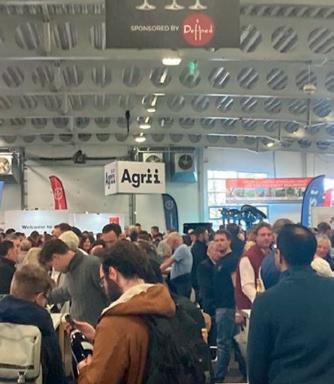

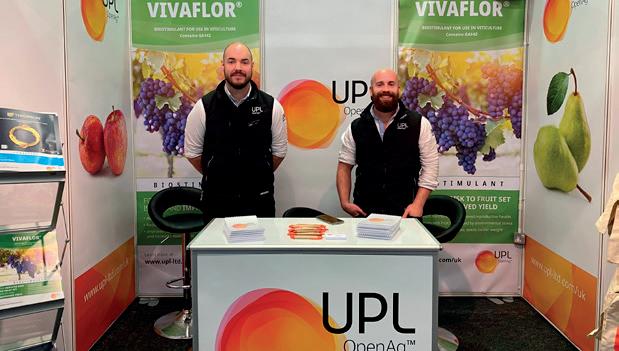






WWW.SOUTHEASTFARMER.NET | JANUARY 2023 17 TO ADVERTISE CALL 01303 233883 We
were delighted to be at The Vineyard & Winery Show. Lots of CONTACTS, many curious about our products. This is a very good show and we hope to be there next year!"
1,756 Total registrants 202 "Thank you for your show. It was the BEST SHOW about vines and wine in UK. Congratulations. I
I’ll be
year."
Last week our
the @VineyardMagGB
This
us
IT WAS BUSY ALL DAY ON THE SOCIAL MEDIA CHANNELS –LOTS OF TWITTER, INSTAGRAM, AND FACEBOOK POSTS twitter @AGreenerWorldUK AGW's Rob George was at the #VineyardShow in #Kent last week. V well attended. Huge interest in #EnglishWines and a LOT of interest our new Certified Regenerative by AGW programme among vineyards & advisors! Exciting time ahead... #RegenerativeFarming @VineyardMagGB @Wine_GB FACEBOOK Burn Valley Vineyard Fantastic day - all the better for seeing some of our fellow women in wine –Lucy @newhallwines Cynthia from @gallowhillfarm Katie from @cobblehillwine Zoe @ blackchalkwine plus others! Dad enjoyed the trip too! #womeninwine #englishwine #vineyardshow #tasting #winetasting #supportlocal
think
there next
Charles Collet, Pépiniéres Guillaume twitter
team attended
event. It was great to attend a growing event within a fast growing UK industry.
event was a great opportunity for
to launch our NPP products, and our VIVAFLOR biostimulant sparked many conversations. #viticulture
2022 SHOW REVIEW
FACEBOOK The Rutland Vineyard
Lovely day out at the UK vineyard show run by Vineyard Magazine in Kent. Loads of energy and enthusiasm and a few more ideas in the making!



FACEBOOK Vine Care UK
Enjoying the show #vineyardshow –at Kent County Show.
twitter @NewForestFruit
Busy day at #vineyardshow today, great to catch up @AgrovistaFruit @ProTechFuture @npseymour and many more…
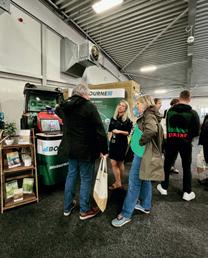
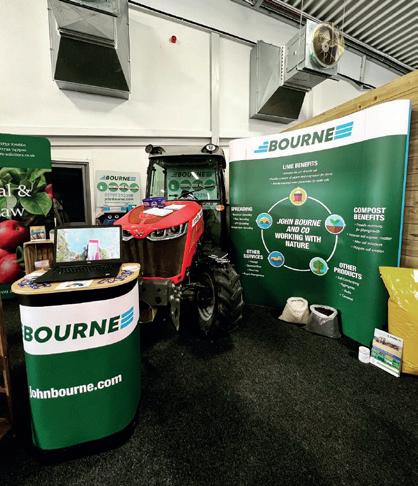
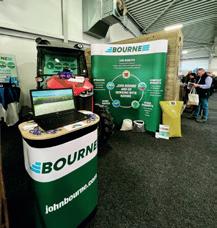
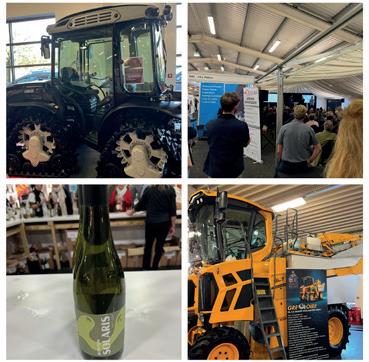

Exciting new venture #englishwine @VineyardMagGB


FACEBOOK John Bourne & Co
Great turn out at the @vineyardmaggb show. Packed full of avid viticulturists and growers looking at our range of composts, mulches and soil improvers along with our specially adapted spreaders. #vineyardshow #viticulture #englishwines #vineyardsofkent #compost #spreading
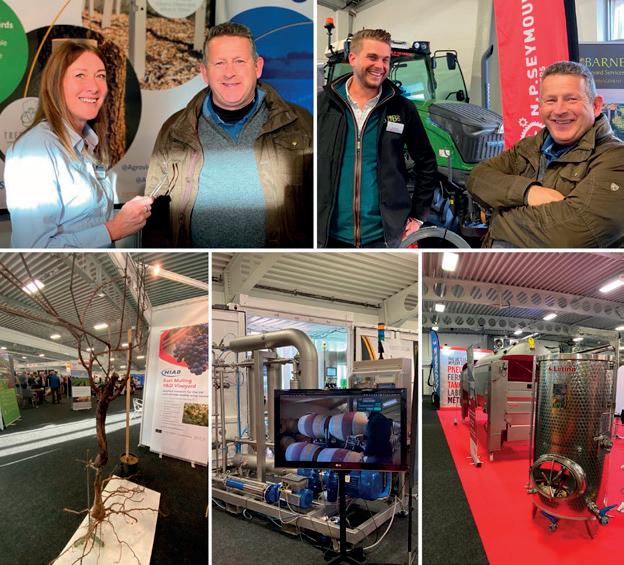

"I just wanted to thank you for a very SUCCESSFUL event. We were busy from beginning to end with many ENQUIRES for our products."
Matt Foster, Voen
JANUARY 2023 | WWW.SOUTHEASTFARMER.NET
2022
18
Matthew Jukes
Photos: ©Martin Apps, Countrywide Photographic
The wines for the tasting included:
◆ 2021 Penny Red, Halfpenny Green Wine Estate


◆ 2021 Vagabond Rosé, Yew Tree Vineyard
◆ 21 Kin, Kinsbrook
Alongside this selection of still wines were three very special sparkling wines:
◆ 2018 Blanc de Noirs, Gusbourne


◆ 2015 Cuvée Boz, Blanc de Blancs, Sugrue South Downs
◆ 2014 Blancs de Noirs, Wiston.
A WORD FROM OUR PRESIDENT
Show President Julian Barnes commented: “How amazing to be a part of the second Vineyard & Winery Show, a day that brought together a part of agriculture that is independently in charge of its journey from vineyard to consumer. A full day of conversation and explanation around everything you would need for viticulture in the UK, plant and machinery, seminars and wine tastings all rounded off with an evening of food and entertainment. It was a pleasure to be joined by so many people, some new and some that have grown up through the industry and become such good friends.”
SPONSORS
The show would of course not be possible without the headline sponsors and Vineyard magazine would like to take this opportunity to thank Core Equipment, berlin packaging, Hutchinsons, Vitifruit and Royston Labels.
EXHIBITORS
On the back of a positive first event, the 2022 show saw an amazing 40% increase in exhibitors, taking the total number of trades on show to 114. As you will see from this review, many reported that much business and interest was generated, with one of the topics of the day focusing on whether the show should be a two day event in future. It was a pleasure to meet many of the exhibitors who were returning for a second year. Among these were the team at the Rebschule Freytag. Keen to taste wines made from PIWI grapes I visited the stand during the show but found it swamped with people all looking at the possibilities offered by these vines. At the end of the day however Marina Pohl from the Rebschule Freytag team asked me if I would now like to try some of their wines. There are obvious benefits for growing these varieties in a cool climate such as disease resistance ensuring the vines produce clean fruit and the possible reduction in inputs that would be good for regenerative agricultural objectives as well as having cost implications. All the varieties on the stand were suitable for the UK climate and there were some particularly interesting wines. Two that stood out to me were Sauvignac for the white wine and from the red varieties Marina said: “The Cabaret Noir had been popular all day.” It was easy to see why the wine was beautifully balanced, interesting and very drinkable (in fact I wanted to take one home and drink it by the fire whilst the rain lashed down outside). This thick skinned variety it goes through veraison early and I could certainly see why it proved popular. Those vineyards in the UK who may have already planted some of these vines were able to taste the possibilities and those looking at future planting had plenty of opportunity to approach this area with an open mind. My thanks go to Marina for making sure I did not miss out on the opportunity to try something new.
FROM THE EYES OF
AN EXHIBITOR
As a veteran exhibitor and a frequent attender of vineyard trade shows, VineWorks is in a unique position to provide an ‘insider’s view’ of this event.
HOW DO WE THINK THE SHOW WENT?
The event was well organised from start to finish with visitors arriving as soon as the doors opened. Stalls were well spaced, which kept congestion to a minimum, and there was ample space to display large equipment and vehicles.
The range of seminars was excellent. We were particularly pleased with the reception Sam Middleton received for his research exploring PIWI, (disease-resistant) grape varieties, which was sponsored by VineWorks.
WHAT DID WE TALK ABOUT WITH VISITORS?
At the VineWorks stand, we were busy all day fielding lots of enquiries from people thinking about planting or considering using our consultancy packages.
We also had a number of existing clients drop by to initiate discussions around expansion – suggesting that investment within the sector is strong.
Our new VineWorks branding was a big topic of conservation. After 16 years in the business, we decided it was time for a refresh. We worked with leading designers, CookChick, to come up with a new logo inspired by aerial views of vineyards.
WHAT WAS OUR MOST POPULAR FEATURE?
Our fresh coffee, biscuits and comfy chairs went down a treat!
We invited some of our suppliers (Bekaert, Gripple, Mapman, Metos) to join our stand which gave them a chance to speak directly with clients and demonstrate their products.
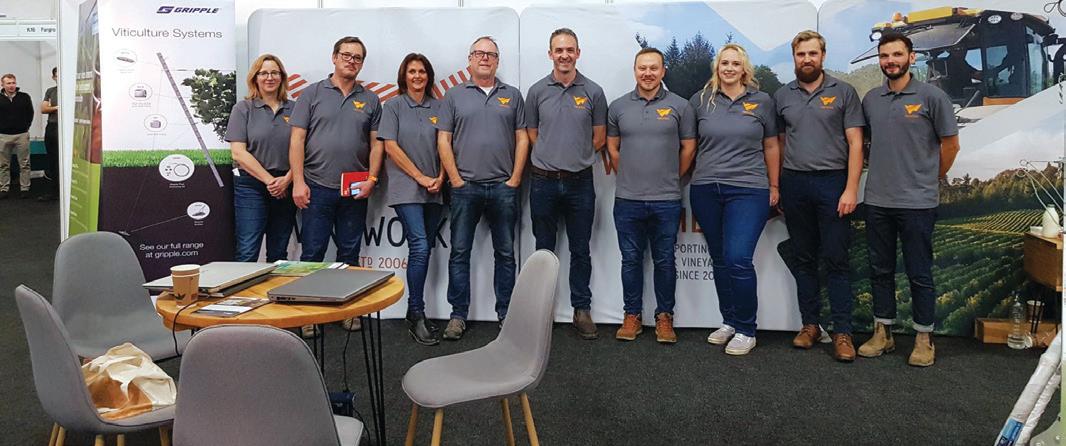
Our display of trellising materials attracted a number of enquiries about the vineyard supplies available to purchase from our online VineWorks’ shop.
FINAL THOUGHTS
“The Vineyard & Winery Show is the best industry trade show in the UK. Vineyard owners and viticulture professionals can meet face-to-face, hear the latest research, and explore services, all in the space of a day,” enthuses James Dodson, CEO.
This year’s show demonstrated that the UK wine industry remains strong and vibrant with new investment, research, technology and service providers continuously developing.
WWW.SOUTHEASTFARMER.NET | JANUARY 2023 19 TO ADVERTISE CALL 01303 233883
<<
THOUGHT-PROVOKING SEMINAR PROGRAMME
Once again WineGB’s seminar programme at this year’s Vineyard & Winery Show brought plenty of thought-provoking themes delivered by a top-class line-up of speakers.

Kicking off the seminar programme was Mitchel Fowler of Ferovinum, sponsors of the seminar theatre, setting out some salutary points on ‘weathering the coming storm’ with plenty of thoughtprovoking points for any business, large or small, in the light of the challenging economic climate.
The programme’s key note speaker, Ian Harris MBE was the recently retired Chief Executive of the Wine & Spirit Education Trust. Ian’s five-decade career in the wine & spirits industry provided plenty of experience to speak fluently about ‘survival of the fittest’. With focus on the English & Welsh wine category, he provided plenty of insight in this emerging industry in the
global wine landscape.
These introductions provided a neat segway into the business-focused first session which concentrated on consumer behaviour in a challenging economic environment, with expert perspectives from the wine trade: the retailer, represented by Waitrose, and the on-trade focus was shared by Luke Harbor, head sommelier at The Pig Hotel group. This well-attended session attracted plenty of questions from the wider audience representing all sizes of producer.
The ‘making a career in the GB wine industry’ session was introduced by Dr Greg Dunn, head of the wine division at Plumpton College, and featured four case studies presented by alumni who have each forged
very different career paths: Sam Williams, Assistant Winemaker at Henners Vineyard; Daria Ershova, Data analyst at Liv-Ex; Paul Harrison, Vineyard Manager at Saffron Grange Vineyard and Penny Meadmore, Viticultural Consultant for Agrovista UK. Each one delivered so fluently on how they came to find their current careers – illustrating to the audience just some of the scope of opportunities there are in this fast-growing industry.
The viticulture session in the afternoon attracted a full house of attendees (some 150). The Great British Varietal Debate brought in a discussion between three viticulture experts, each making their case for the different varietal options in the UK today: Sam Middleton,
JANUARY 2023 | WWW.SOUTHEASTFARMER.NET 20 2022 SHOW REVIEW 2022
Vineyard Assistant at Black Chalk in Hampshire, also the winner of the Vine-Works Vinegrower of the Year Award, outlined the case for PiWis, an area of viticulture that is attracting global interest in the changing climate. Jon Pollard, Chief Vineyard Manager at Gusbourne represented the ‘Classics’ – Chardonnay and Pinots that make up the majority of current plantings. The third speaker presented a convincing case for the ‘Vanguards’ – those varieties that have by and large lost some appeal but nonetheless formed the backbone of the industry and are still proving to deliver in regions around the UK. This is a discussion between all three options that will no doubt continue, but the platform at the Vineyard Show certainly got the conversation started. The session was chaired by Matt Strugnell, Vineyard Manager at Ridgeview and Chair of WineGB’s Viticulture working group.
The final session brought a sustainability focus into the winery of the future – with four different angles for producers to consider. The session was steered by Chair of the winemaking group on Sustainable Wines of Great Britain, Sarah Midgley (Winemaker at Plumpton College), the session comprised four speakers: Tony Milanowski (Rathfinny) who explored improving sustainability in winery practices; Henry Sugden from Defined Wine outlining important areas of consideration in winery design and sustainability; Jack Makin (Ridgeview) provided an all-important focus on community and employee engagement in sustainable practices and Kristina Studzinski of Off The Line Vineyard brought in a focus on sustainable wine production from a boutique producer perspective.
Speakers reported a very positive response from visitors to the content across the day, as well as engaging questions and thought-provoking discussion. In turn some great feedback was given on the quality of the speakers by audience members, and comments were also relayed that visitors found the seminar sessions to be a great initiative. WineGB was out in force this year with their stand positioned near to the seminar tent, allowing visitors to follow up and find out more.
All the presentations are available on the WineGB website. These taster topics will no doubt roll out into wider and more detailed sessions in the fullness of time.






For WineGB’s part it was a pleasure to be part of such a busy and focused show.

WWW.SOUTHEASTFARMER.NET | JANUARY 2023 21 TO ADVERTISE CALL 01303 233883
VISITS: SOUTH BROCKWELLS
AWARD-WINNING, DIVERSIFIED FARM BUSINESS
Chrissy Wells and Sarah Robinson moved to the tenant farm with their parents, David and Sherry, in 1976. In 2010 Chrissy took on the tenancy with her father David, and on his retirement in 2019, the sisters formed the South Brockwells Farm Partnership with Chrissy’s husband, Arron.
David sadly passed away this summer but kept his hand in on the farm until the end, helping the youngest members of the
team, Lucy and Daisy (Chrissy and Arron’s daughters), with the goats and sheep.
“His boyish enthusiasm never left him and he always enjoyed seeing young people learn about the livestock and countryside around them,” said Chrissy.
“We always have a team of young people helping on the farm and with the start of South Brockwells Farm School we will continue our dear parents, David and Sherry's, legacy,” she added.
The family farm has gradually evolved over the past 46 years, from a commercial sheep farm to the award-winning, diversified farm business it is today (they were awarded gold in the British Farming Awards Diversification of the Year category 2022). It is home to three main diversifications, each aspect linked together to create a circular enterprise.
FARM DIVERSIFICATION
“When we first moved here in 1976 the farm was very run down and required a huge amount of energy and investment to keep it going. Over the years the need to diversify alongside the core business of the commercial sheep flock was essential,” said Chrissy.
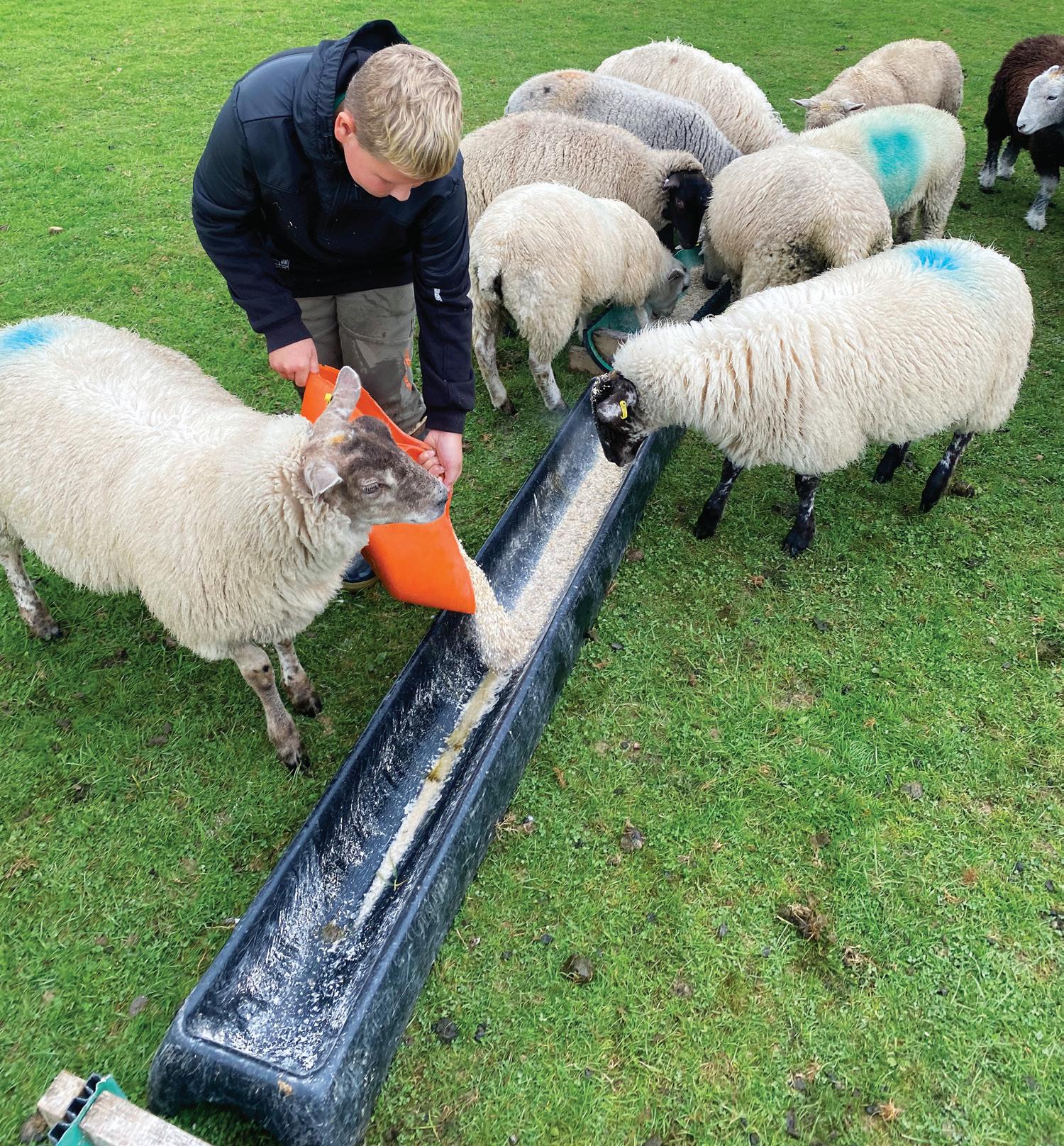
Their first diversification was a horse livery and stables, providing vital regular income. Next they planted four acres of asparagus beds in 1998 and in 2000 they opened a seasonal farm shop to sell produce from the farm.
Chrissy and Sarah are both qualified riding instructors so naturally the equestrian side of the business has evolved over the years. They now cater for lots of different events and in 2017 Arron, who is a carpenter by trade, built a cross-country circuit with more than 100 cross country jumps.
The circuit, which is open daily for riders from April to October, is very popular and known as one of the most scenic in the country, they said.
Sarah runs the farm shop, which is open all year round from 10am Wednesday to Saturday.
During the asparagus season they open daily, with a loyal following of customers who come to buy their own freshly picked Sussex asparagus.
JANUARY 2023 | WWW.SOUTHEASTFARMER.NET 22 NIGEL
>>
AKEHURST
FARM
This month Nigel Akehurst visits South Brockwells Farm in Uckfield, East Sussex, to find out more about an award-winning family farming business run by husband and wife team Chrissy and Arron Wells, Sarah Robinson and Caroline Tasker, who joined to launch their farm school and mobile farm earlier this year.
FARM FACTS
• South Brockwells Farm Partnership run by sisters Chrissy Wells and Sarah Robinson, along with Chrissy’s husband Arron
• 300-acre tenant farm comprised of mainly permanent pasture (heavy clay), woodland and four acres of asparagus
• 150 breeding ewe commercial flock, six small groups of rare breed sheep. Lamb indoors between mid-March and midApril. Then start harvesting asparagus (good cash crop)
• Farm shop selling game, lamb and goat meat run by Sarah Robinson with parttime staff
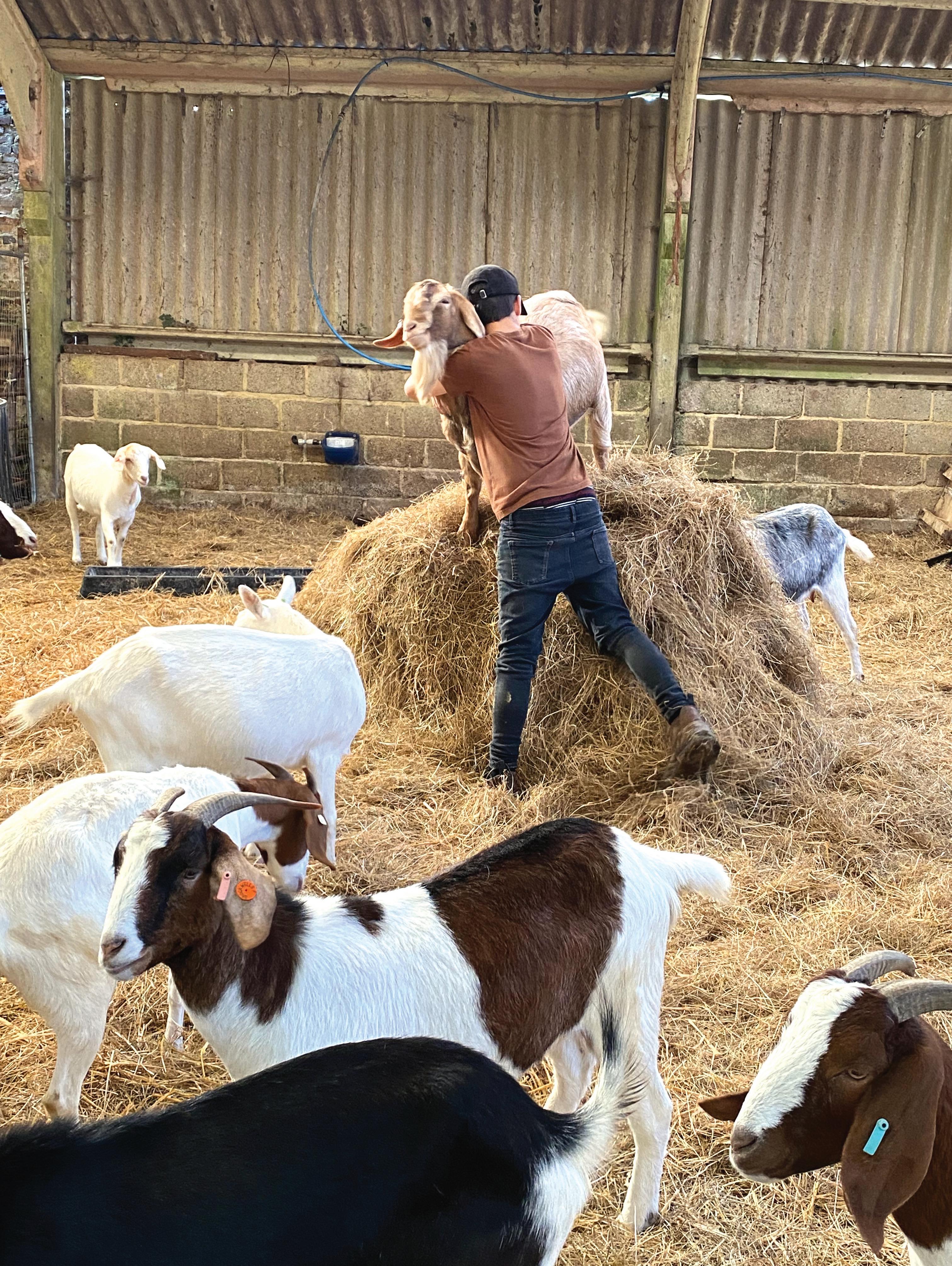
• 65 head of goats (Boer x dairy)
• Modern farm butchery built in 2020 with the help of a government bounce back loan
• Livery yard and equestrian cross-country course built in 2007
• Farm school opened April 2022, headed up by Caroline Tasker
WWW.SOUTHEASTFARMER.NET | JANUARY 2023 23 TO ADVERTISE CALL 01303 233883
Throughout the summer their polytunnel and veg patch provides the farm shop with a variety of fresh seasonal goodies and from autumn onwards they sell oven-ready wild game meats, all sourced from local estates across East Sussex and butchered on site by Arron in their own modern butchery.
They also stock a wide selection of goods sourced from other local farms and producers, including everyday essentials such as milk, bread, pies, cakes, sauces and ice cream.
MODERN BUTCHERY AND GROWING CONCERN OVER FOOD MILES
They built the butchery in 2020 with the help of a government bounce back loan.
VISITS: SOUTH BROCKWELLS
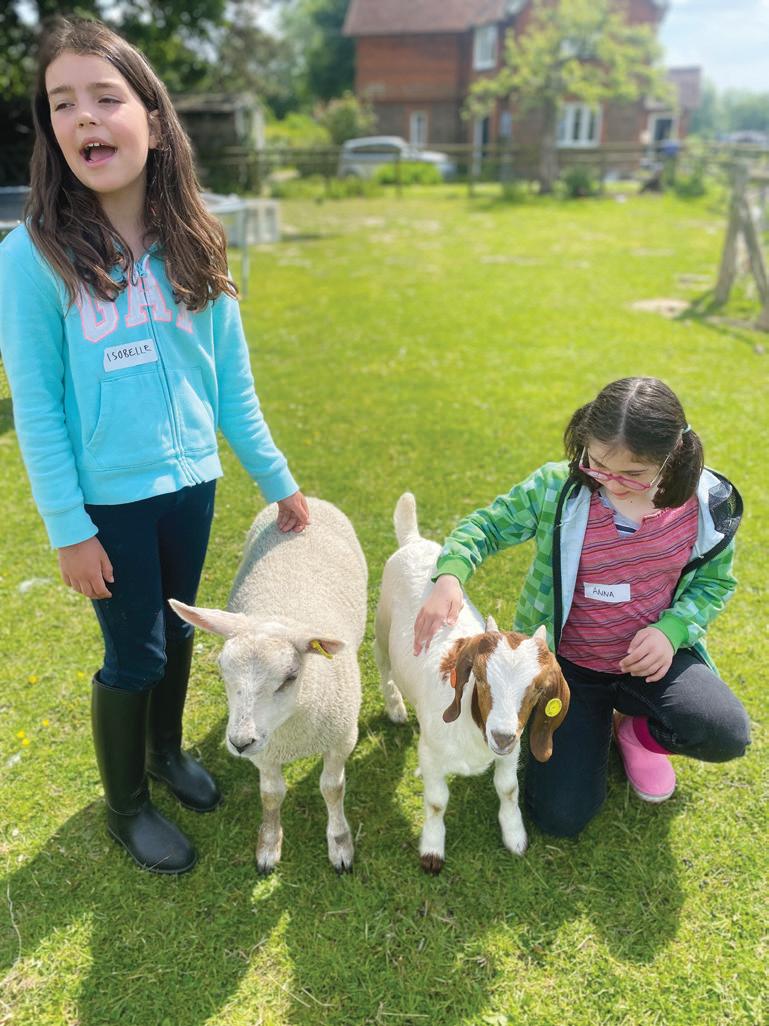

Arron now spends two thirds of his time cutting up the farm’s own lambs, goats, pigs and locally shot game. Everything is sold through the shop and they pride themselves on their low food miles and providing an authentic, field to fork experience for customers.
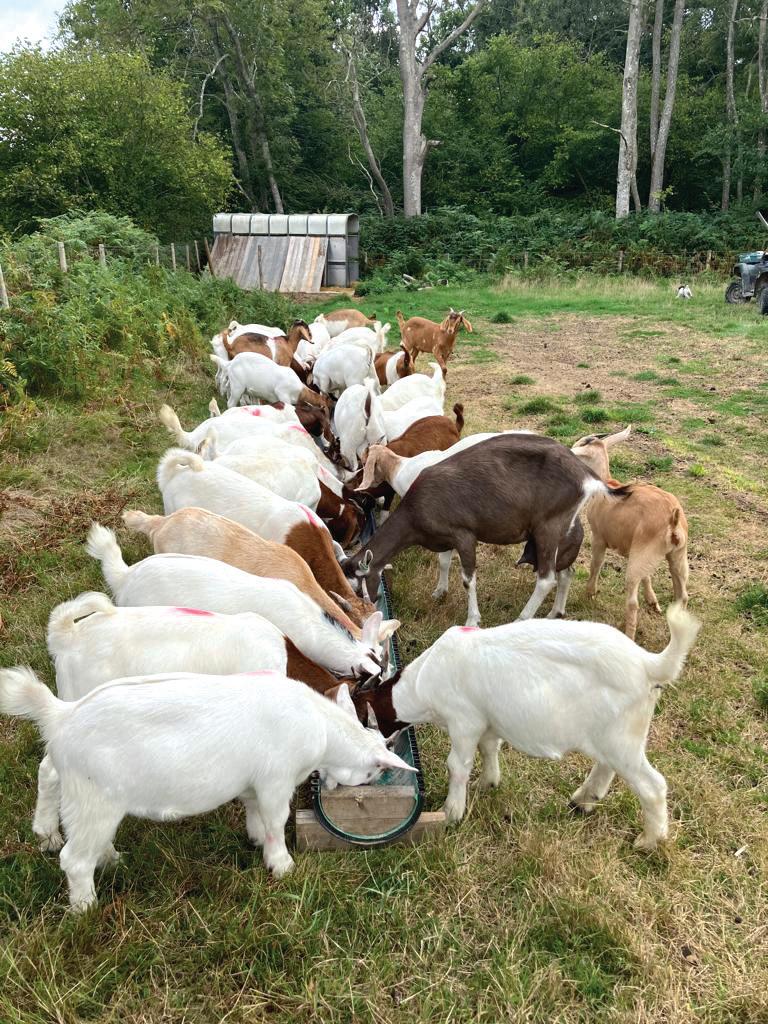
Having invested heavily in the new farm butchery they are worried about the closing of Tottingworth and will now be forced to take their animals further afield, undermining their whole ethos, said Chrissy. She also worries that the remaining “local” abattoirs won’t be able to cope with the extra demand and suggested that farmers and smallholders affected by the closure should meet up in the new year to work out a plan for the future.
FARMING
The day-to-day farm work is carried out by Chrissy, with help from her husband Arron. A passionate sheep farmer, she has spent the past 10 years working towards breeding a sheep that is able to thrive on their land.

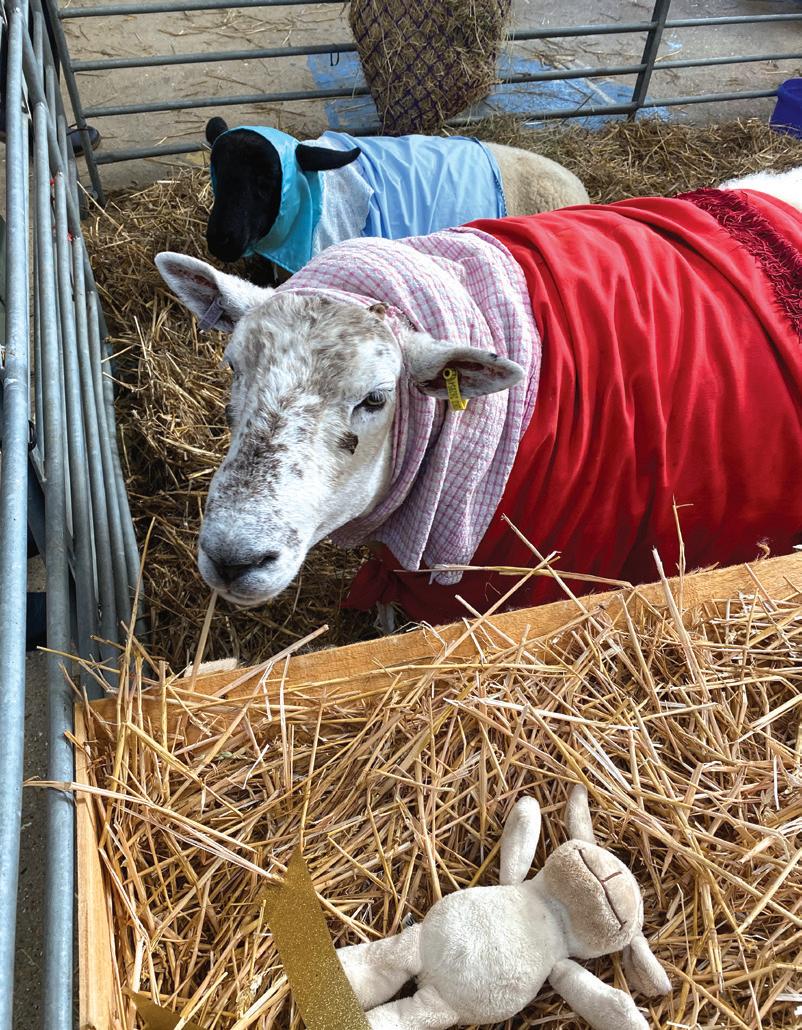
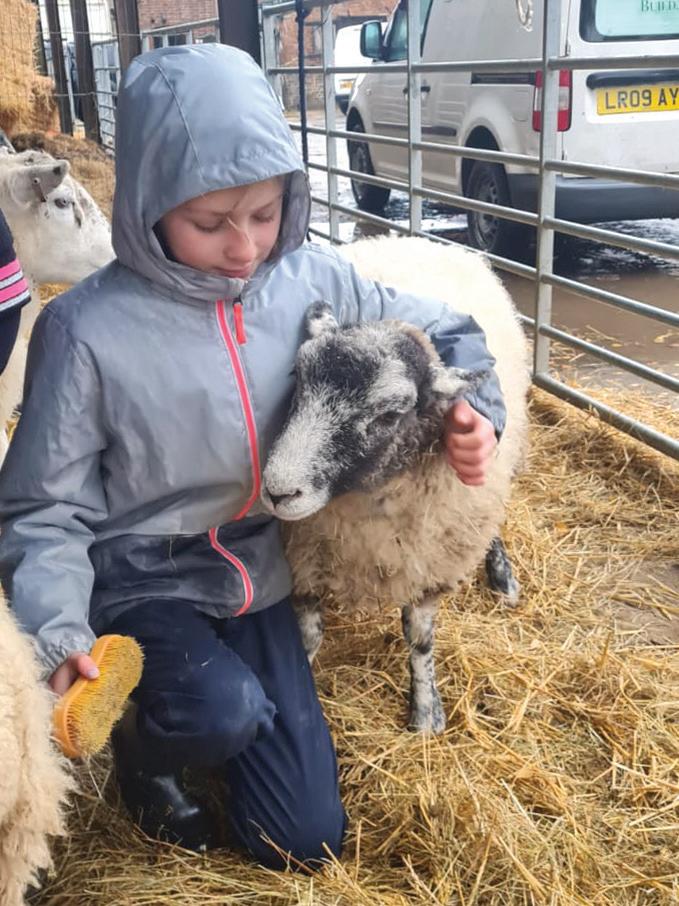
She introduced the Roussin breed into her flock of commercial ewes after coming across them at a National Sheep Association open day. They look a bit like a Charollais but are more hardy and have a long body and good muscle mass with light bones, so yield out well, she said. Chrissy uses the Roussin ram on the mule ewes, keeping the best ewe lambs as replacement breeding sheep to be put to the Texel and Beltex Charollais rams in due course.
They start lambing around mid March and
JANUARY 2023 | WWW.SOUTHEASTFARMER.NET 24 NIGEL
FARM
AKEHURST
<<
bring them into the barn to lamb indoors, with ewes and lambs spending a few days inside before going out to grass. Chrissy said she prefers lambing a small flock of 150: “I know them all by face, whereas we used to lamb 1,500; it’s really nice having a small number of sheep that you can care for individually,” she said.
They aim to finish lambing by mid April, at which point “they change overalls” and start harvesting asparagus (which runs until the summer solstice), explained Chrissy.
Asparagus is a good cash crop, she said, though margins have been squeezed by the rise in minimum wage and expensive sprays. Typically they rely on a local labour force and the support of friends and family.
In addition to the sheep, they recently added a small herd of goats to help control weeds on the farm and offer another type of meat through the shop. Chrissy initially bought some pedigree Boer goats but has moved to a hybrid meat dairy cross, as they milk better. Offspring are finished at around nine to 15 months and they also sell some to local landowners who keep them as pets.
EMBRACING CHANGE AND SPOTTING A GAP IN THE EDUCATION MARKET
Despite the ever-increasing costs, pressures on tenant farmers and future uncertainty, the team at South Brockwells is quick to embrace change and think creatively about how farming can be successful on a small family farm. Their latest diversification, a farm school
and mobile farm, is a perfect case in point.
Caroline Tasker - a former deputy head teacher of a large secondary school, joined the South Brockwells team after spotting a gap in the education market for children adversely impacted by Covid-19 lockdowns.
“They were years below where they should have been socially and academically,” she said.
Caroline decided to do something about it and convinced Chrissy and the partners that setting up a farm school and mobile farm was a good idea. Together they launched the school in April of this year and have ambitious plans.

“It’s still very early days,” said Caroline, but they are already working with the local authority, local secondary schools and primary schools, plus children who are in foster care, have special educational needs or who are being home educated.
“We have about 20 children a week who come and do one-to-one sessions with us,” said Caroline.
The children spend time with the team learning all about the different farm animals, how to care for them and their role on the farm, as well as where the children’s food comes from.
“They often respond much more positively to being given a practical problem - like working out how much hard grub to give a pen of sheep,” said Chrissy. It is that practical element that sparks the children’s interest and has them engaged and benefitting from working with the animals.
Additionally, during school holidays they host Mini Farmer holiday clubs with 30-plus children
aged seven to 14 spending the day on the farm learning and enjoying working with the animals. The holiday clubs are primarily targeted towards children who receive free school meals and the team is passionate about ensuring all children get this fantastic opportunity.
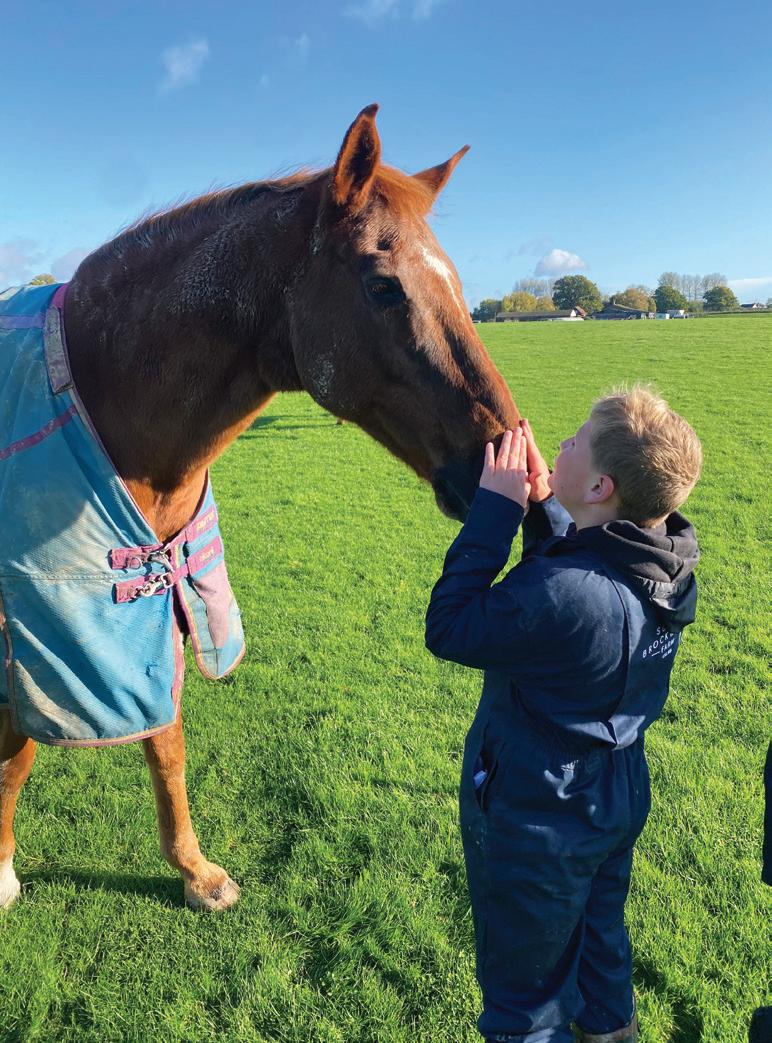
The longer-term plan is to offer classes for groups of children but they need to carry out some essential building work to add suitable toilet facilities and hard standing in the yard first. They are currently looking for some funding to help, but haven’t had any luck finding anything to date (do get in touch with them if you have any leads).
In addition to children going to the farm to learn, they also take the farm out to schools, nurseries, care homes and community groups. The mobile farm includes their tame sheep, kids, lambs, goats, Shetland ponies and donkeys. They provide both educational and therapeutic visits.
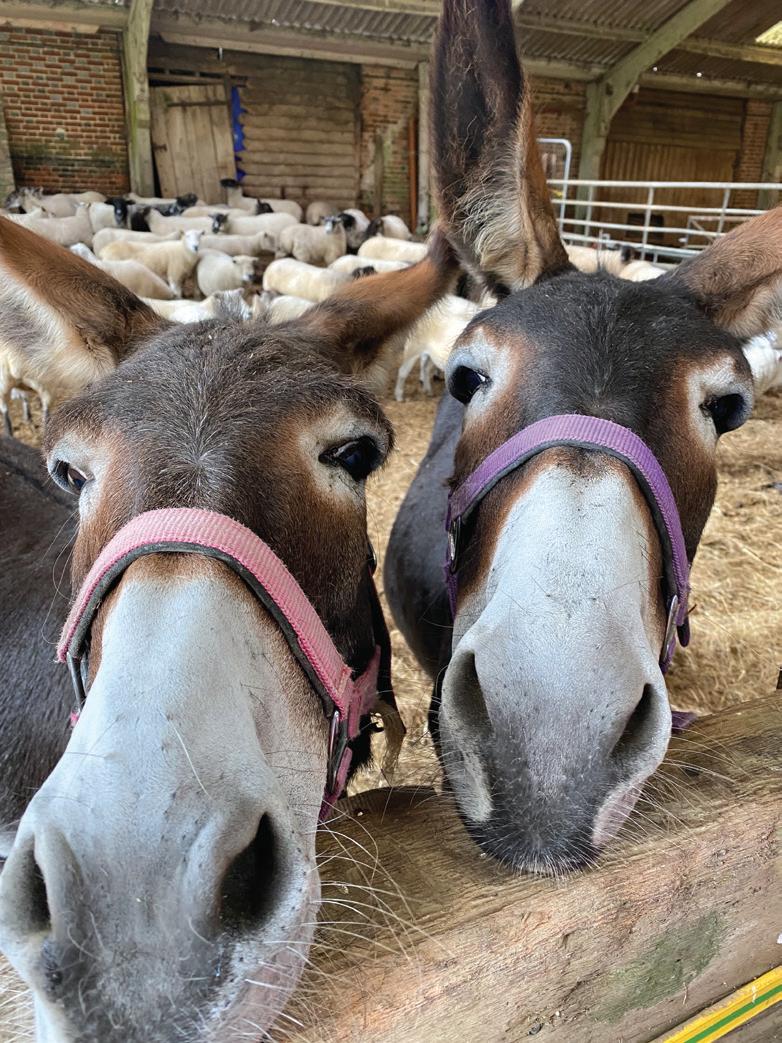
You can find out more about their farm school, shop and livestock via their website (www.southbrockwellsfarm.com) and social media (via their Facebook page and Instragram).
PASSION FOR FARMING
The team at South Brockwells Farm is clearly passionate about food and farming and has managed to diversify in multiple ways without losing sight of the core aim at the centre of it all - ensuring the farm’s future. It’s little wonder they have won so many awards over the years and I look forward to following their progress with interest.
WWW.SOUTHEASTFARMER.NET | JANUARY 2023 25 TO ADVERTISE CALL 01303 233883
AGRICULTURE STUDENTS PLAN FOR THE YEAR AHEAD
This month is an important time for our students in anticipation of the new calendar year and the opportunities we are planning for them. It is always an exciting time, but getting all the potential opportunities embedded into the curriculum can be slightly challenging.
We have a wide range of practical and academic activities coming up in the new year with the support of industry experts and employers. These activities are invaluable to prepare the students for their next steps and their longer-term future, for example, in developing business plans linked to different farms, not just the college farm.
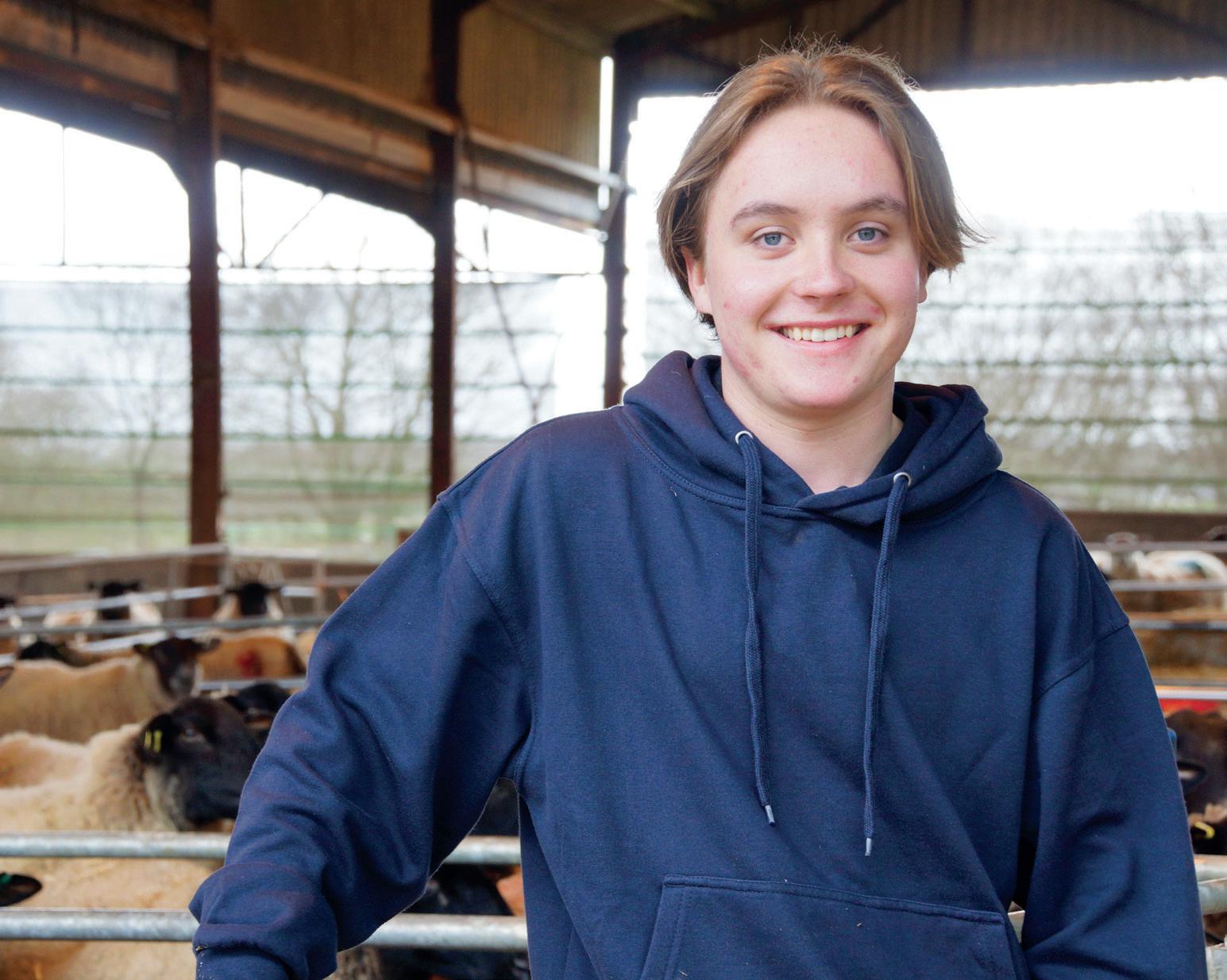
In addition, while on work experience students can display their unique skills and capabilities, which could catch the attention of their work experience providers. As students develop their network of contacts, employers may already know about the student's abilities and can recommend them for positions or suggest additional opportunities.
Another example of industry-based skills is where students have fed back on live graded animals that are subsequently killed out, allowing the carcass quality to be compared to the live animal.
At Plumpton College we believe we can make a real difference to how students engage with the industry and how quickly they can see the links between what is learnt in the classroom and how to apply it in an industry context. Tutorials on a one-to-one basis allow time to explain what to expect individually, involving students in practical activities such as external speakers, farm visits and additional qualifications.
ISAAC ADAMS
Isaac Adams has summarised some of the things he has been doing at college this month:
“I have had a busy few months at Plumpton College supervising routines and, more recently, helping with judging silage across farms in the West Sussex area.
“For a week in November I supervised a group of first-year Level 2 and 3 students with their dairy routines. My job as a Level 3 student was to ensure that all students were happy and getting on with the tasks on the college's dairy unit.
“Students had the opportunity to try milking and calf rearing. For most students, it was their first time doing these jobs. As the students were inexperienced, it was
my role to ensure their questions were answered, and I was there if needed to give them a helping hand. More importantly, I made sure they understood what they were doing and why.
“I also visited farms across West Sussex and judged clamped and baled silage. We had to mark maize and grass silage in clamps against specific criteria; appearance, top waste, dry matter, spoilage/heating, crop maturity, clamp management and silage analysis.
“I found this exciting and beneficial to my learning as I had the opportunity to visit different farming systems to learn what key factors are needed to make top-quality fodder to feed livestock and its effect on production.”
JANUARY 2023 | WWW.SOUTHEASTFARMER.NET 26 EDUCATION
Visit www.plumpton.ac.uk to study a range of fantastic land and environment courses
Alan Johnson, Curriculum Manager reports.
Isaac Adams
BRINGING TOGETHER PARTIES TO FIND SOLUTIONS
Writes Ben Robinson , who farms near Alresford.
Generally, I like frosty weather in winter. It dries out the land, allows field work without poaching and usually brings a bit of sunshine, which is good for the soul. However, we are now on the seventh day on the bounce without the temperature rising above freezing and defrosting water is getting a little tedious.
The water to the main sheds has been kept running by heaping up cow muck around any exposed pipes. The manure creates its own warmth, allowing the water to keep flowing. However, the pipe to the calf housing goes on an exposed and lengthy aerial route from the main shed and freezes up fairly easily.
Bucketed water has been the order of the day for the calves. Perhaps one day I will be able to justify digging up the concrete and relaying the pipe underground. At least lows of -9°c at night have meant we have been able to get on with hedgecutting, even on the heaviest fields. It seems ironic that only in late November we clipped the backs of the store cattle to prevent them sweating in the sheds.
This autumn, arable farmers locally have taken to cover crops in a big way. Though most are principally soil conditioning mixes including plants such as buckwheat, vetch, phacelia and beans, many neighbouring arable growers are keen to have sheep to graze their cover crops off. It is a learning curve as to what they are capable of and what classes of stock do best on them.
Communication is the key, as I am learning that different arable managers have quite different views and expectations of what they want from sheep grazing.
On the NFU front, I have recently been voted in as chairman of the Alton and Petersfield branch. We are quite an active branch with several meetings a year and a well-attended dinner in March.
The other branch officeholders and I were recently invited to a meeting by the East Hampshire MP, Damian Hinds. This is
fairly unusual in itself, as normally it is the NFU trying to set up meetings with MPs, not the other way round. The conversation was almost entirely around farm productivity.
Today the Chancellor made a positive statement regarding food security and the importance of home production, too. We need to see if those sentiments can be turned into positive actions for our industry.
The closure of the Tottingworth abattoir is a blow for South East livestock farmers, especially those in Sussex who supply meat locally. The closure of this outlet will have a knock-on effect on the whole supply chain, from farmers to cutting rooms, farm shops, butchers and pubs that value local produce.
NFU staff and office holders have held talks with other local slaughterhouse operators to discuss both increasing capacity and the range of private kill services offered in the light of the loss of Tottingworth. There does appear to be enough slaughtering and butchery capacity in the South East at present, though some members may have longer journey times than they have been used to.
As frustrating as the loss of a key facility
such as an abattoir is, the NFU cannot go into the business of running agricultural processing businesses; that is a matter for private enterprise. The role of the NFU needs to be bringing together interested parties to find solutions wherever possible. That could be livestock farmers, slaughterhouse operators, planning authorities, local councils, vets or national government.
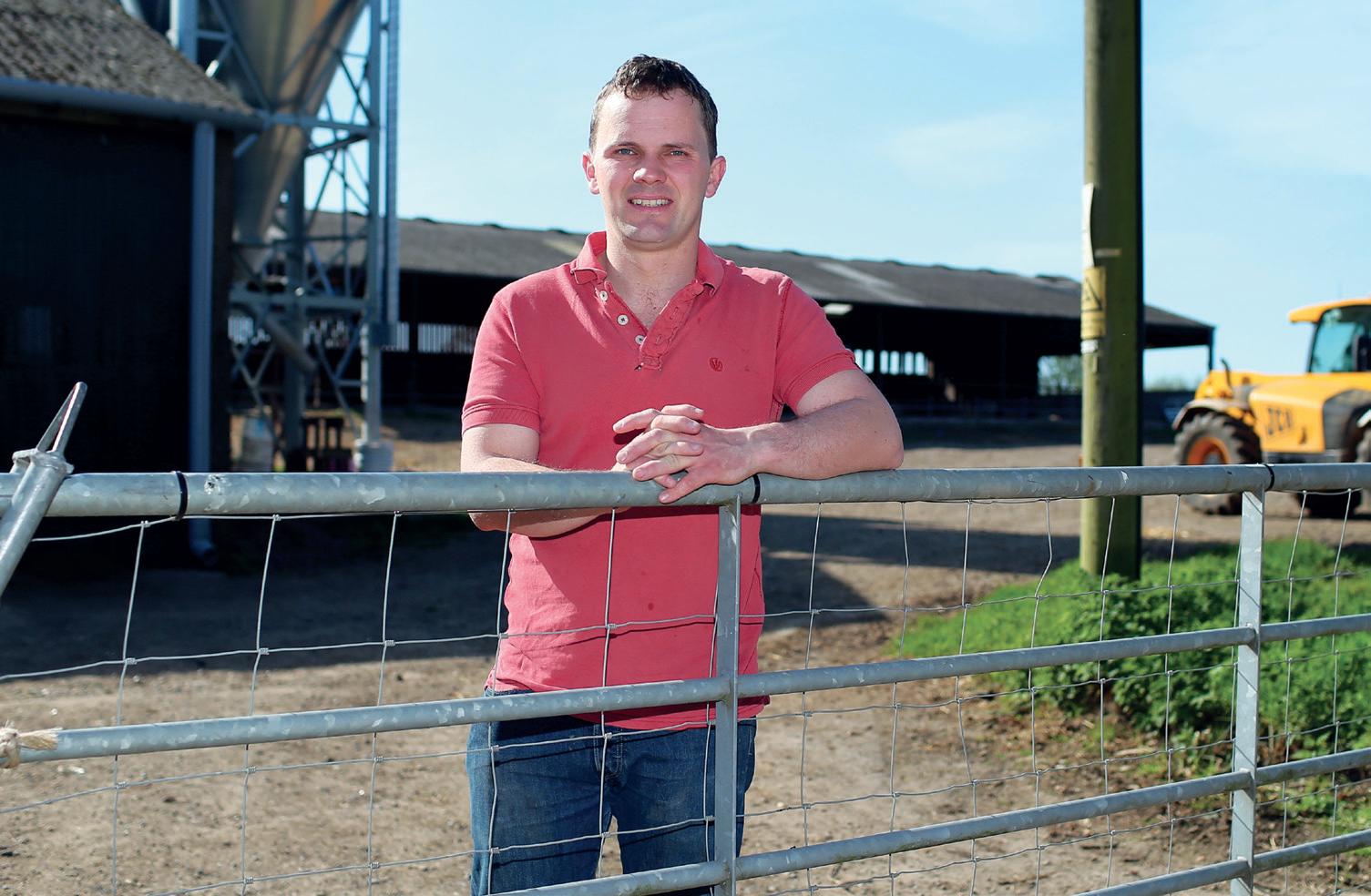
We have contributed to a recent Parliamentary report on The Future for Small Abattoir Provision in the UK and regularly lobby politicians to ease the burden and cost of regulation on small slaughterhouses. It must be said, however, that for the average MP abattoir provision is not exactly a vote-winning issue or indeed a great photo opportunity for their social media channels.
The issues involved are highly technical, regulatorily complex and sometimes emotive, with the current bureaucracy often supported by powerful vested interests. Unpicking the issues involved for the benefit of the small slaughterhouse and livestock farmer is where the expertise of NFU staff both locally and at Stoneleigh is invaluable.
WWW.SOUTHEASTFARMER.NET | JANUARY 2023 27 TO ADVERTISE CALL 01303 233883 FROM THE FRONT LINE IN CONJUNCTION WITH
‘GO RURAL’ FOR 2023
Thinking about choices for 2023? Join us at our open morning on Saturday 28 January 2023 from 10am to 1pm to discover all your options for studying with us here at Hadlow College.
Discuss your future career path covering everything rural, sustainable, and environmental. Are you interested in sustainability and being a green guardian of our planet? Then we have a course for you.
Hadlow College offers a huge variety of land-based courses, ranging from agriculture and sustainable horticulture to fisheries management and many more. These can lead directly into employment or university (a Level 3 course is equivalent to A Levels).
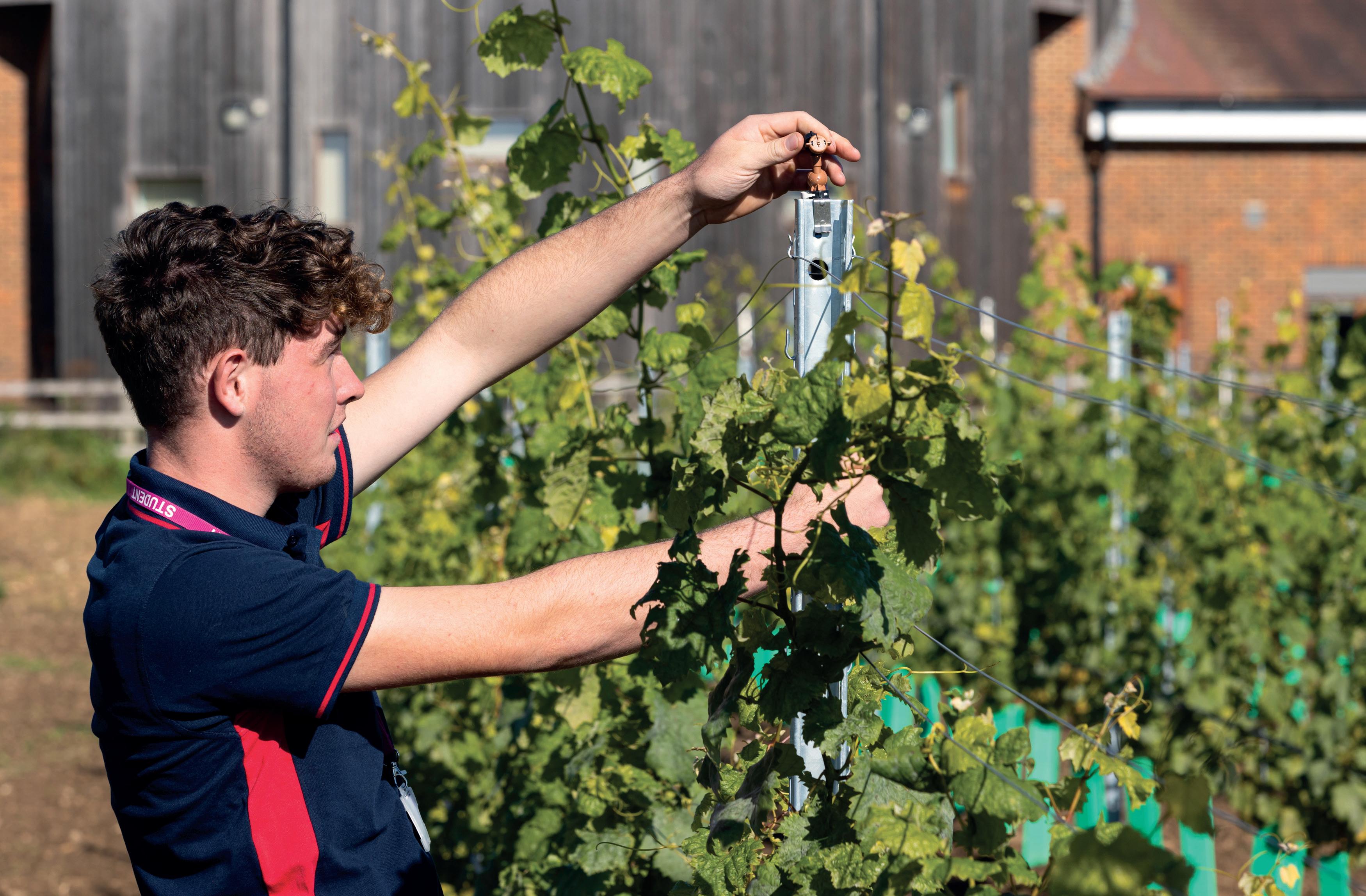
We also offer a wealth of higher education programmes,
apprenticeships, and part-time study options. Our aim is to make sure you benefit from excellent teaching and support and achieve the qualifications you need to prepare you for work, higher education or perhaps a career change.
You can also live in our beautiful campus grounds with residential accommodation on offer for further and higher education students.
Visit us and explore our wonderful rural and land-based facilities, brand new sustainable orchard and vineyard and get the chance to speak to our industry trained lecturers and our best advocates - our current students. You’ll get all the information you need to make that all important next-step decision and can even apply on the day.
Pre-register here – tinyurl.com/Hadlowevents
JANUARY 2023 | WWW.SOUTHEASTFARMER.NET 28
TIKTOK
NEW YEAR RESOLUTIONS
SARAH CALCUTT Executive Chair, National Fruit Show
How do I write this without getting political? It’s a challenge.
Driving to work today (the joys of a train strike) I listened to Farming Today as normal. In common with the past few years, the hot topic of conversation was the number of seasonal worker permits required for the next harvest year.
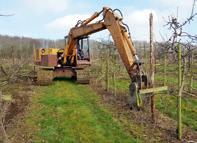
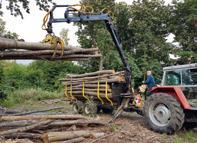
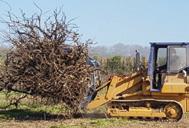
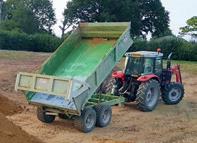
Tom Bradshaw of the NFU very eloquently explained why it was essential that that scheme was extended to 50,000 permits that were available from the beginning of the season, rather than in April. David Camp, of the Association of Labour Providers, confirmed that the late approval of the numbers in 2022 caused endless issues and that the 1,400 left unused were of this group.
There is partial good news with the announcement that the scheme is in place until 2025 for those providers who are already
within it. What we don’t know (at the time of writing) is how many and are they all for horticulture or will some be ring fenced again for poultry? Will we hear on Christmas Eve again?

Will we get the 10,000 additional permits that we really need? With the immigration minister standing up in Parliament and again ignoring the challenges faced in recruitment, travel and the length of time taking to process a visa application under the scheme, it’s certainly not going to be plain sailing again, that much is clear.
As some of you may have read in this, and other, publications, my career has taken a slightly different turn of late. I have said farewell to the Vineyard Show, although it will always remain one of my most favourite projects. It’s been wonderful helping to create such a great event for a really vibrant sector.
I am also bidding an equally fond farewell to the Agri-Epi centre board and to my role as the regional chair for Nuffield Scholarships.
For the past two years I have volunteered for City Harvest London as part of its food board, finding surplus in the produce supply chain and giving it real purpose in feeding the rapidly increasing numbers of hungry people in the capital.

I have just started my new role as City Harvest’s CEO. At a time of an economic, energy and food chain crisis, it’s certainly a challenge, but one that the rest of my career, perhaps, has given me some useful skills with which to make a difference.
I will be continuing with the National Fruit Show, now as the honorary chair. A stellar replacement has been appointed as the first ever Chief Executive; the society is going to take enormous leaps forward under


her leadership (an announcement is coming).


My new year’s resolutions:
1. The Rural Policy Group will create an All-Party Parliamentary Group for Food Security. We need this for so many reasons – a secure economic future for growers in the UK, policy that supports a thriving food supply and rural businesses and truly beneficial, bi-lateral trade agreements that ensure the UK has the food that it needs, produced in the right way and which doesn’t take market share from home grown products.
2. City Harvest will be delivering 2,000,000 meals a month across the 32 boroughs of London in 12 months’ time
3. The National Fruit Show will celebrate its 90th anniversary in grand style, with a great line-up of speakers, VIP visitors and every technical advance you could wish for.
I hope you have all had a wonderful Christmas and New Year.
Editor's Note - the announcement on the seasonal worker's scheme (see page 5) came too late to be reflected in Sarah's column.
WWW.SOUTHEASTFARMER.NET | JANUARY 2023 29 TO ADVERTISE CALL 01303 233883 FOCUS
CALCUTT
ON FRUIT SARAH
Andrew from City Harvest and Sarah from Gibbs Green Community Centre
W.H.Skinner & Sons Grubbing, timber & groundwork services • orchard grubbing • windbreak removal • timber extraction • fallen tree removal • ground contouring • land clearance • excavations • cultivations • pond dredging • reservoir construction 01622 744640 - 07711 264775 www.whskinnerandsons.co.uk
T: 01264 321 595 www.openfield.co.uk









FERTILISER SEED
GRAIN STORAGE
ELVED PHILLIPS ARABLE NOTES

WHAT IS THE REAL PRICE OF WHEAT NOW?
“That was the year that was”! I try to keep to the current market, with some crystal ball gazing, but 2022 was so extraordinary it deserves to be reviewed. Until the end of February 2022, everything from interest rates to inflation, pension funds, energy costs and the grain market appeared to be normal. We now have the highest inflation rate for 40 years and the highest interest rate for 14!
On the face of it, with unprecedented differentials on May 2023 futures from the low to the high point of £188 per tonne, farmers who still had grain left to sell in February enjoyed the income of two harvests in one. With low input costs from the previous year, those who followed the advice from this column from last May will have sold some at the peak of the war market and also some new crop sales as well.

These are now £100 over the current market. So every arable farmer has had the opportunity to “dip his bread in this gravy”. I’m not sure if any other sector of society has had the chance to cash in on such premiums. As always there are farmers and grain buyers who thought this South Sea bubble would never burst! Even when faced with the hard evidence about the good state of the growing crops and the eventual harvest in the UK and the world, some refused to sell.
After the May peak, up to harvest there were opportunities to sell at values still
ELVED PHILLIPS Openfield
£50 more than they are today. Some grain buyers and farmers elected to become war correspondents, seeking the next military event which might presage another spike in prices. But the world market kept finding ways to trade grain from Ukraine. Sometimes it appeared the trade was behaving like the crypto currency market with reckless trading based on greed.
So we have had three prime ministers and four chancellors of the exchequer and we have lost our dear Queen Elizabeth II. Many public sector workers are on strike, with some seeking pay increases of 19%, so quite a year all round!
One of the questions for the New Year is “what is the real price of wheat now?” We are nearly back to pre-war prices anyway. In mid-December, November 2023 wheat futures were £227, so will the real new price be £200, £210, or will it get back to £225 ex farm?
It has a long way to go from this point. Many months ago, I said forget about what you could have sold at and didn’t; now you have to forget about what it’s costing you to grow the new crop, as that calculation may inhibit you selling at a sensible price.
Yield will ultimately determine if the forward price was or is any good. Without the war, and to a certain extent with the war as the current stalemate exists, it will come down to whether the Black Sea is, as usual, the cheapest seller in the world. If they are, like last year, the buyers will fund a way to get it out!
The world wheat price in USA dollars is $300 to $320 Free On Board. At that price, UK old crop wheat should be competitive
to almost any part of the world, including America. You could argue that we are at the bottom of the old crop market now and we should be able to export whatever our wheat surplus is before next harvest, maybe by Easter.
If and when we do, the dynamic change from export to import parity could add £20 to the wheat price. Those with the space, money and courage should achieve that, but how low could the price go before then? The ongoing war is a big part of what I call the “perma volatility” we now have in the trade.
OK, so you must not count on Russia doing something outrageous, but you cannot discount it, either! The safe grain corridor is only open until March. Russia is already threatening that they may re-open the corridor for exports to poor countries only, so no one in the west for sure!
Marine insurers are withdrawing cover on boats loading Russian, Ukraine and Belarus cargoes. China has relaxed its Covid-19 controls, which should stimulate demand.
Argentina and Brazil have deepening drought and heat, which is damaging maize crops, so there are plenty of bullish possibilities.
To end I quote from the King George VI wartime speech: “I said to the man who stood at the gate of the year, give me a light that I may tread safely into the unknown. He replied ‘go out into the darkness and put your hand into the hand of God. That shall be to you better than light and safer then a known way’.”
I hope I have provided some light last year and will for this year, but for goodness sake, if you are bid £250 ex for new crop wheat, take it!
JANUARY 2023 | WWW.SOUTHEASTFARMER.NET 30
As a new arable farming year begins, what should my approach be to the current economic environment in which I find myself? Should I be brimming with confidence based on improved profit margins on my arable enterprise, with feed wheat trading at about £230 per tonne ex-farm? Or, alternatively, should I be racked with doubt that ongoing inflation in my production costs, combined with terminal cuts to my Basic Payments, will gradually erode my profit margins?
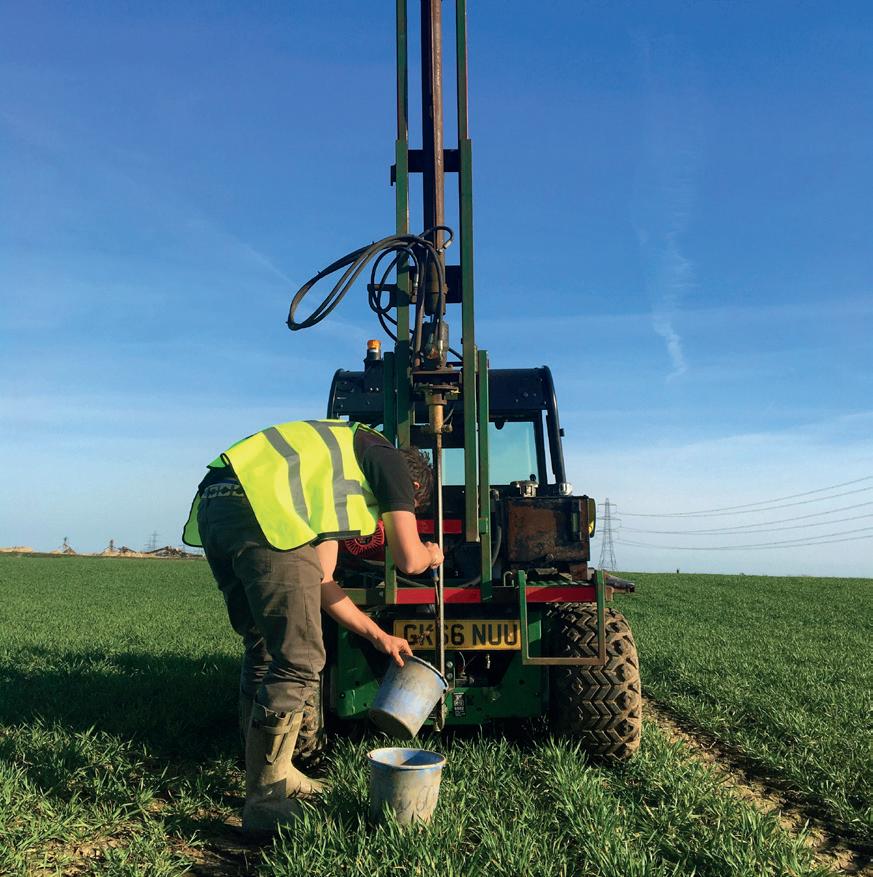
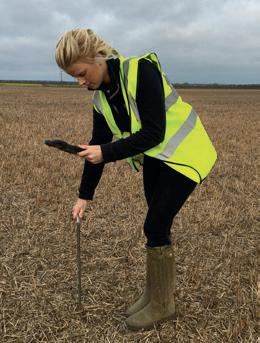
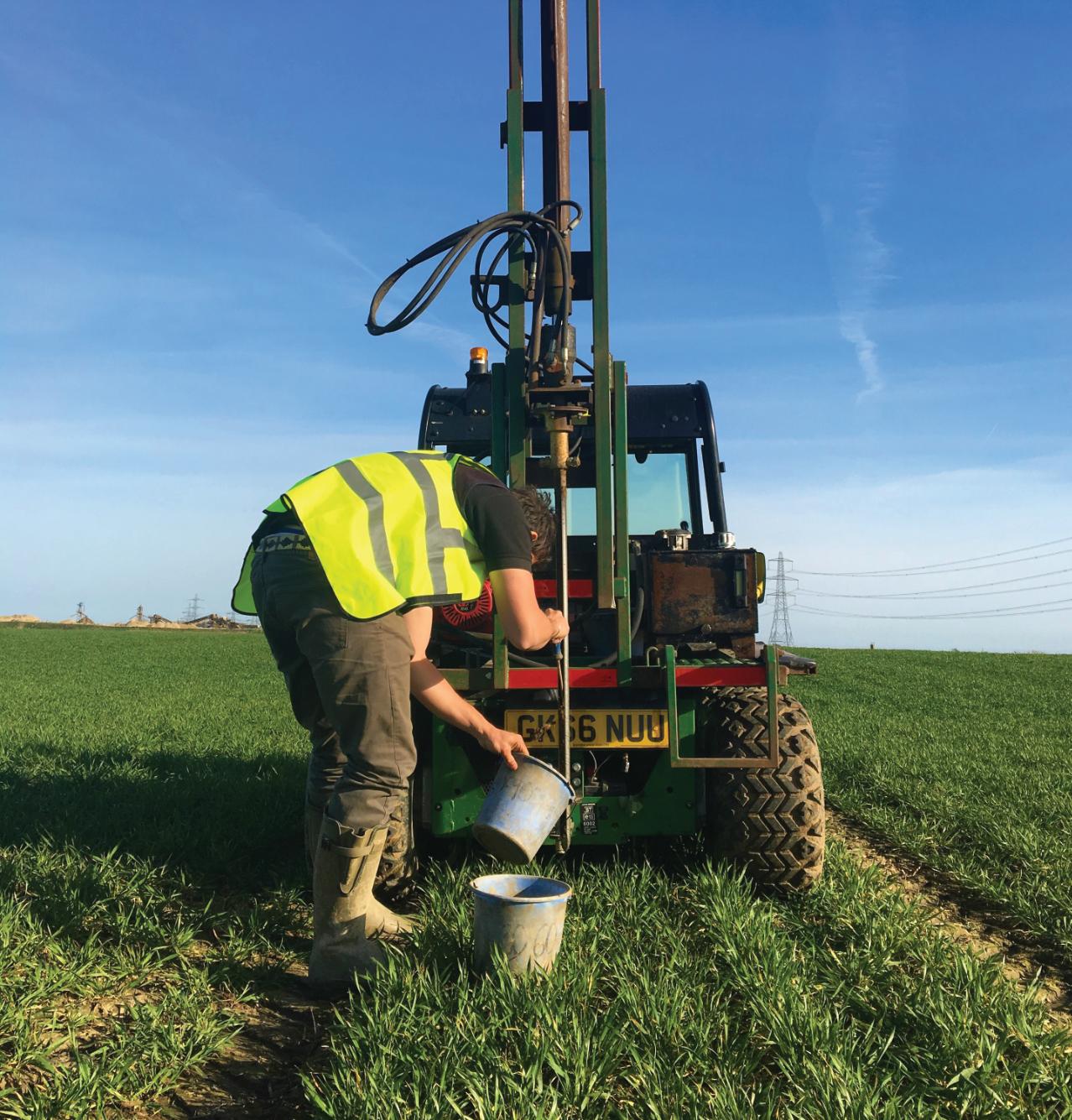




One nagging doubt that increasingly bothers me is whether or not my little corner of East Sussex has a viable future for arable farming, given the rapidly rising cost of bulk grain transport from this area. I’ve just been quoted an alarming £25 per tonne to haul 120 tonnes of field beans to Ipswich, but even that offer comes with the caveat that the quote only stands provided “we can find the wheels “.
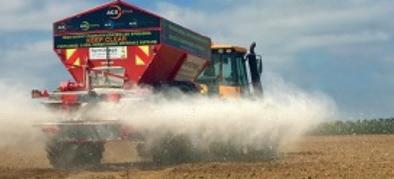
The reason, apparently, for there being so few bulk crop transporters willing to come to my area is that there is nothing for them to “bring down”, like bulk animal feeds, as all the chicken and pig farms are increasingly concentrated in the Eastern Counties. So, as these lorries mostly come to me empty, it greatly increases their costs as they are not paid anything by another party for half of the round trip.
At least when they arrive here they get a reasonably quick load these days. I now have a big, high-tipping grain bucket, and even the largest lorry bodies are soon brimming with grain. Twenty years ago, I used to load lorries with a Kongskilde sucker blower unit that, on a good day, would suck and blow about 10 tonnes an hour from my corn store into the truck.
The process also involved lots of shovelling (by me) and the removal of on-floor ducts and hessian sacks as loading progressed. On a bad day, if there was a lot of chaff in the grain, the machine would regularly block up and have to be switched off, cleaned out and then re-started.
The truck driver reaction to my loading facilities varied from jolly to extremely angry at the thought of spending half a working day watching the slow dribble of grain fill their truck. If anyone complained about the wait, I used to point to the spare shovel as a way of speeding things up, which mostly resulted in them disappearing back into their cabs with a loud slam of the door.
I finally decided I needed to modernise my crop loading capability when, one day, two trucks appeared simultaneously and I had to explain that the second truck might have to wait five hours before he was loaded.
I left them to sort out which one of them was going to be loaded first and went into the grain store to start up the sucker blower. I heard an engine start and assumed that one of the lorries was pulling under the loading spout, only to discover that both drivers had thought better of getting a load at all and simply driven off.
But, even with my current, quick-loading capability, I’m once more having problems finding haulage for my crops. Our main local grain haulier was bought out several years ago by an aggregates haulage company, which quickly converted the fleet to predominantly aggregates haulage.
So, with local grain mills ever more scarce, let’s hope that with transport costs as high as they are, we are not headed in the same direction as sugar beet, where the crop can only be grown very close to where it’s processed.
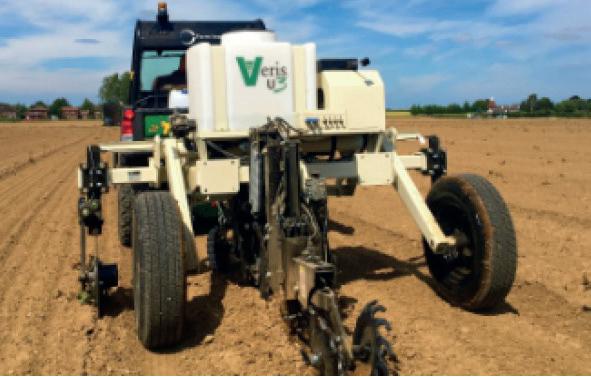
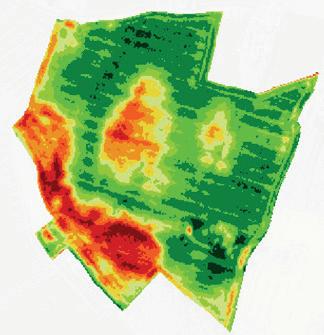





WWW.SOUTHEASTFARMER.NET | JANUARY 2023 31 TO ADVERTISE CALL 01303 233883
STEPHEN CARR
NAGGING DOUBT STEPHEN CARR Arable farmer productssupplied, andspreadtoyourfarm. Offering20years’experience insoil servicestailoredforyouand yourbusiness Soilsmartsampling,GPSprecision, Verissoilscanning,NCore,Ph,PCN 01233 740247 enquiries@farmimage.co.uk www.farmimage.co.uk • Ultimate Soil Scanning – High definition in-field scanning of major field properties including pH, Organic Matter, Electrical Conductivity and Topography • Precision Soil Sampling and Mapping • Biomass Imagery • Standard Soil Sampling – P, K, Mg and pH • Potato/Pea Cyst Nematode Analysis (PCN) • Deep Core Nitrogen Sampling • Manure, Slurry and Product Analysis • Lime supply and variable rate application
WEIGHING UP SPRING CROPPING OPTIONS
SPRING BARLEY
LG Diablo, Laureate and RGT Planet have dominated the market in recent years. With dual brewing and distilling approval, LG Diablo and Laureate are likely to remain popular, showing very little difference in yield or agronomics.
RGT Planet’s position in the brewing sector, however, could be challenged by Skyway, which offers the greatest yield potential of all maltsters at 105, 6% higher than RGT Planet. At the time of writing, Skyway is only provisionally approved, though, and spring seed availability may be tight.
Of the feed varieties, Fairway is the highest yielding, followed by newcomer Malvern, but both are 1 to 2% behind Skyway, which may still be the better option, even if not going into malting. Skyway has the yield and straw and performs well across all regions, although perhaps suits the east and west better.
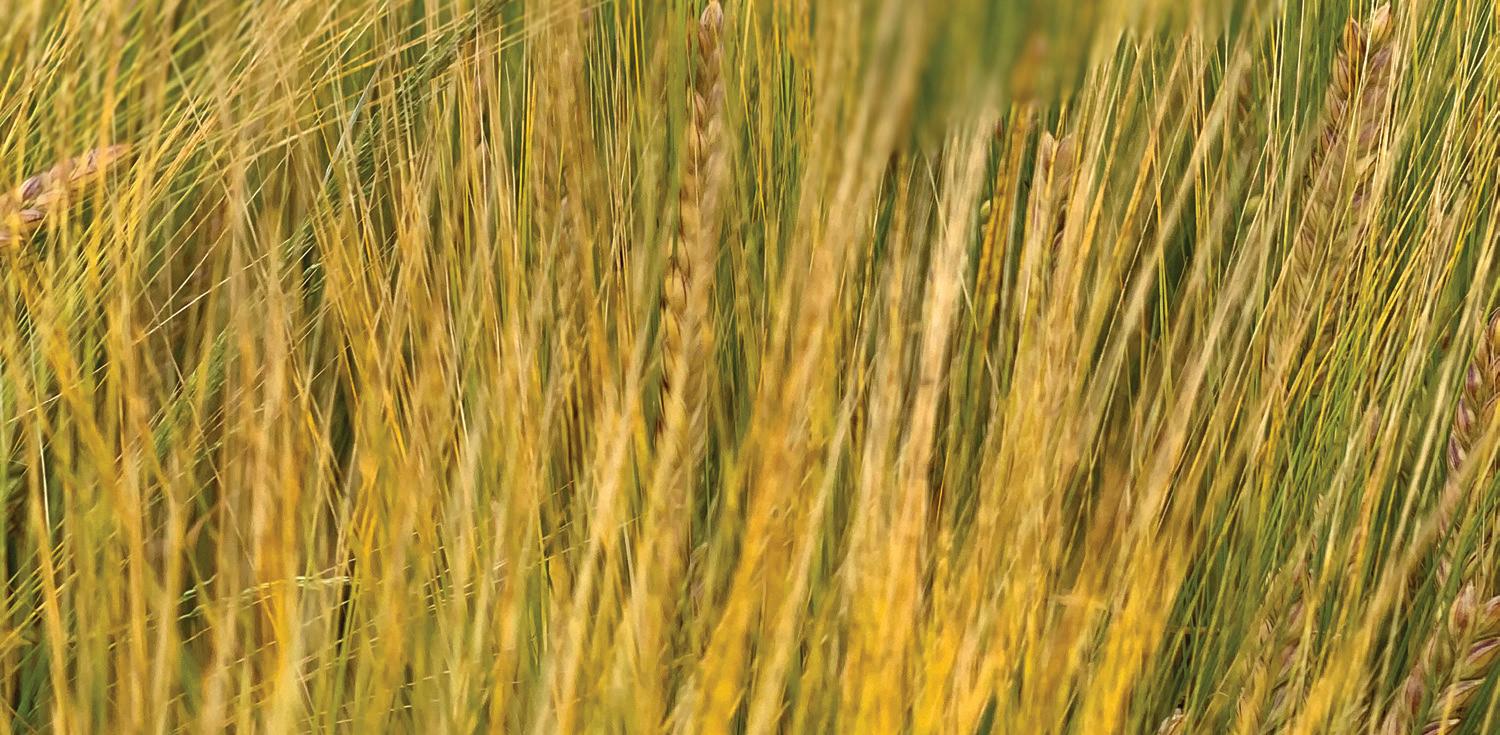
SPRING WHEAT
Spring milling wheat could be in demand where winter sowing was incomplete, and of the Group 1s, newcomer KWS Ladum and Mulika are lead contenders.
KWS Ladum is the highest-yielding Group
1 at 102, representing a big step-up from old favourite Mulika (94), which has been around for 11 years. KWS Ladum also has sound disease resistance and grain quality.
Of the Group 2s, KWS Cochise is still most widely grown, performing consistently in recent years.
Group 4 spring wheats have also seen a step-change in yield, with arrival of KWS Fixum (108) and WPB Escape (105).
Seed availability for many newcomers may be tight, though, given relatively small areas entered for harvest 2022, so get in early if you want a particular variety.
SPRING OATS
There has been little change among spring oats, with WPB Isabel remaining the preferred variety by end users, followed by Merlin and Canyon.
PULSES
Pulse options have seen some significant changes, with the arrival of two field peas promising big yield improvements.
The large blue, Carrington, was recommended last year and is 7% higher yielding than next-best on the list, Bluetime,
and 15% better than Blueman, which has been widely grown and has decent quality.
There appears to be no agronomic penalty either, as, like Bluetime, Carrington is strong against mildew, stands well with short straw, is resistant to pea wilt and is early to mature.
Again the challenge is seed supply, as the hot, dry summer created difficulties for harvesting and processing seed with low moisture content, plus there was only a relatively small amount of Carrington grown in 2022.

Kameleon and Orchestra are the main white peas, both representing a decent yield improvement over previous varieties such as Karpate. Orchestra is 4% better, while Kameleon yields 8% more.
For bean growers, Lynx is a widely grown favourite, topping the list for yield, with good agronomics. It is slightly higher yielding and better against downy mildew than Ghengis, but otherwise little separates them.
Ghengis is a BIPO variety, so having to pay a £30/ha premium may deter some growers, even though the seed royalty is less than Lynx.
LINSEED
Juliet and Bingo are the top two linseed varieties. Juliet has been around since 2001, so has proved its yielding ability. It is latest to mature, although that is not usually an issue. Bingo is also a decent variety that proved popular last year.
JANUARY 2023 | WWW.SOUTHEASTFARMER.NET 32
AGRONOMY
BRUNDLE
707494 E:
830064
PETER
T: 07774
Peter.brundle@hlhltd.co.uk Canterbury: 01227
www.hlhltd.co.uk
Although favourable conditions for autumn sowing are likely to mean less reliance on spring cropping in 2023, it remains important to the rotation for many growers. Hutchinsons seeds manager for the south, Peter Brundle, picks some leading varieties to consider.
LG Diablo
“SOCIAL LICENSING” HAS BECOME COMMONPLACE







Wishing all our readers a very happy new year. I hope that Christmas was a joyous occasion and that nothing escaped or got broken. Fortunately for us this Christmas was uneventful (We shall always take a quiet Christmas in preference).
While I write this article, we are waiting for Fergus to return from Australia. Ted is boiling over with excitement; he is of the opinion that he will have another Christmas when Fergus returns. Monty has been a superstar this holiday and having passed his driving test 21 days after turning 17 he can now drive the tractor and trailer on the road. This has been amazing when dunging out the cows before Christmas.
For the first time in a very long time the milk price is good, although it would appear to be common practice for the milk price to drop in the New Year. Fingers crossed that they hold the price.
Over the past few months/years in many organisations the phrase “social licensing” has become commonplace in the vocabulary.
As always in farming, change happens at a slower rate than in most other industries.
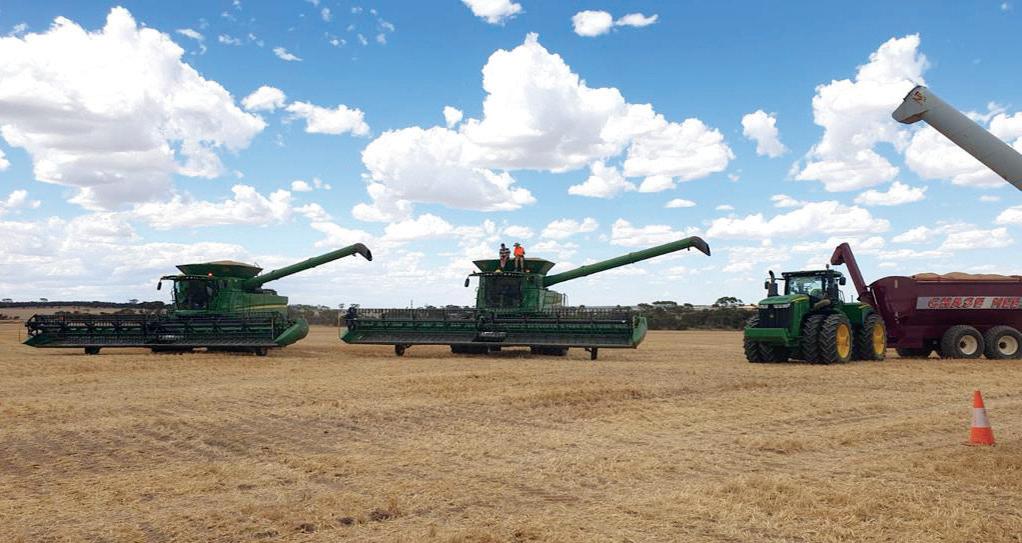
At the annual Pony Club conference, there was an in-depth look at the current situation and a very good presentation on social licensing. The racing authority has been proactive for many years regarding these issues, including the new whip rules. Farming is also following suit. How the public view farmers and their practices will have a huge influence on purchasing products, so we must all be aware of the image we present to the wider community.
Farmers are increasingly expected to demonstrate their social and environmental responsibility as a pre-condition to being allowed to carry out their preferred farming and commercial practices. A social licence to operate is created and maintained slowly over time, thus enabling a trust to be built between the consumer and the producer.
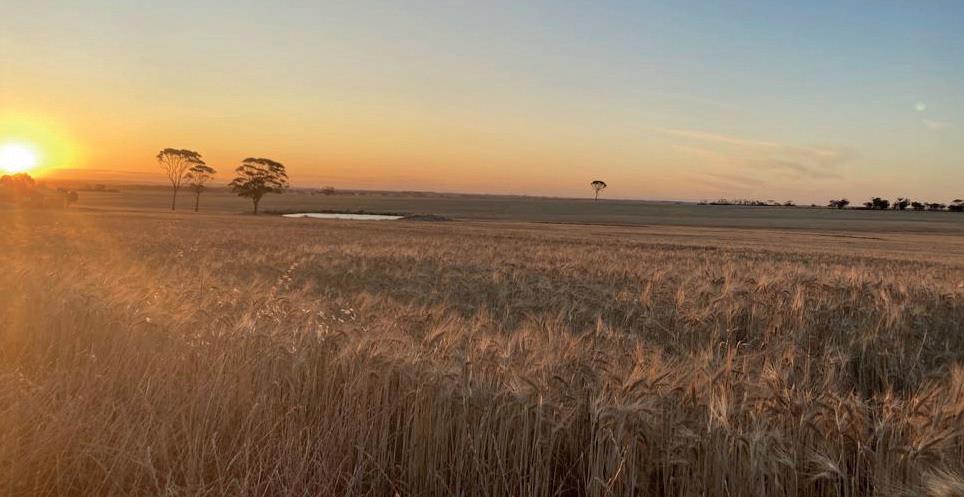

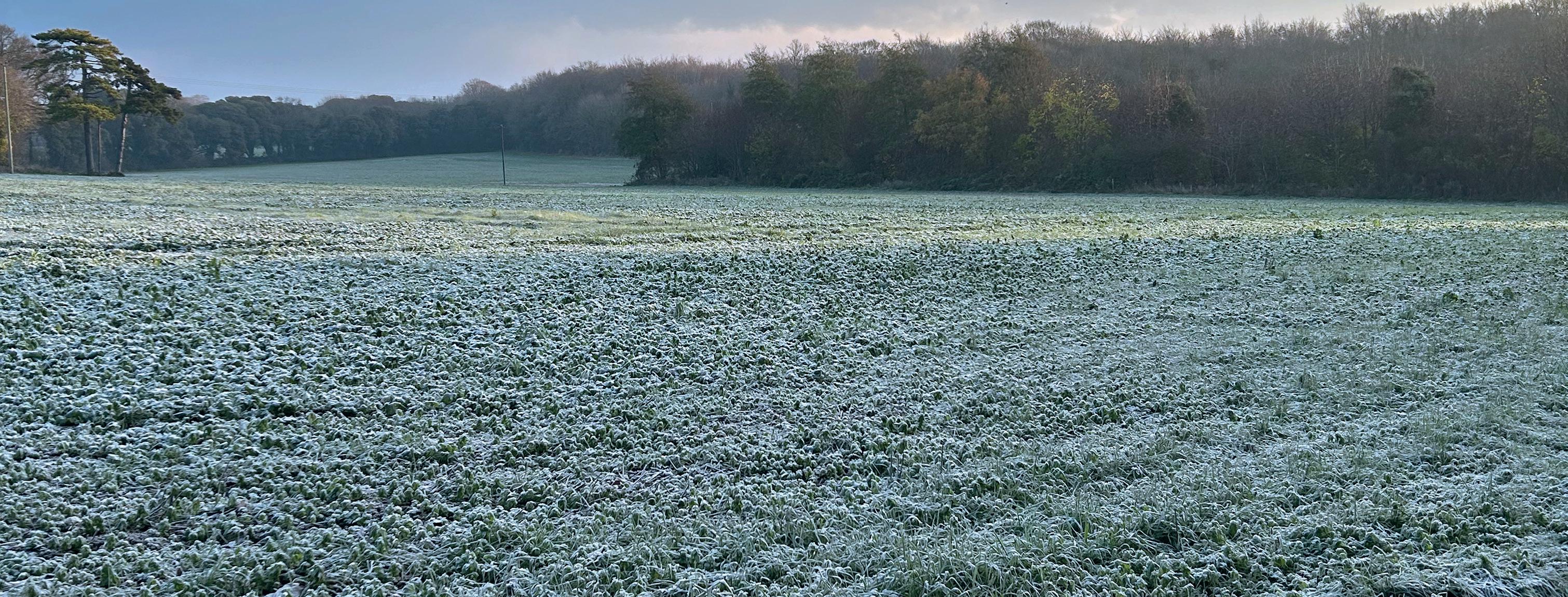
Farmers must be seen to operate responsibly; taking care of employees and the environment while trying to balance

the books at the end of the year is no mean feat. Open Farm Sunday organised by LEAF (Linking Environment And Farming) is a fabulous example of this and will take place next year on Sunday 11 June.

This is an ideal opportunity to give visitors the chance to learn more about farming and its practices. It also gives British farmers the opportunity to boast about the thing they are most proud of, British food and farming. Please visit the website if you would like to register an interest – www.farmsunday.org With our best wishes for 2023. Stay safe until next time.
ANITA HEAD Farmer

WWW.SOUTHEASTFARMER.NET | JANUARY 2023 33 TO ADVERTISE CALL 01303 233883 ORGANISED CHAOS ANITA HEAD
ALAN WEST Sheep farmer
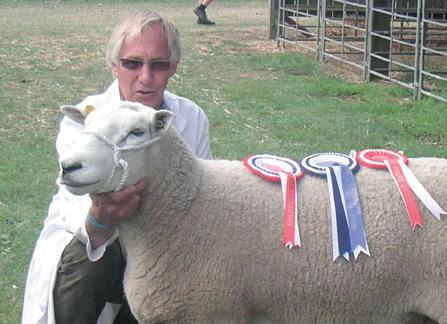
First of all, may I wish everyone the very best for the coming year; I really do hope that 2023 is a rather less ‘interesting’ and challenging year than the one that has just concluded, although I suspect this might simply be wishful thinking.
It is good to be able to look forward to a new year with a degree of positivity. Last year ended reasonably well for the sheep sector; lamb and cull ewe prices held up quite well and the warm, if somewhat wet, November ensured that, for most, there was a good bite of grass in front of the sheep, and I hope this continues. In spite of the recent cooler weather, the storage heater effect of last summer’s heat energy accumulated in the soil has, so far, kept soil temperatures up and grass growing, although the recent cold spell may just be sufficient to cool things down a bit.
On the downside, the warm autumn has unfortunately also helped to maintain high levels of worm burdens on pasture, but forewarned is forearmed as they say. Be ready with the wormer, but a good frost or two should help sort this problem.
I am not one given to new year’s resolutions, but I do have a wish list for the year ahead of us; there are some things that are so far beyond our control that there is no point including them within any wish list, fuel and energy prices and the weather, for example, but there are others that are within domestic control.
I DO HAVE A WISH LIST FOR THE YEAR AHEAD

I wish that we could have some sensible government decisions on policies relating, either directly or indirectly, to agriculture and sheep production. There are currently so many areas of uncertainty that it makes forward planning much more complicated than it needs to be. On a macro level we need to have some clear government food policies and strategies that recognise the importance of agriculture not just in feeding the nation but also in the contribution that it is able to make, with clear guidance and support, to sustainability, CO2 reduction, the natural environment, biodiversity etc. We need food policies that recognise the need for stability as an essential part of the long-term future for sheep production and other enterprises.
We need an international trade policy that recognises the efforts made within the sheep sector to raise both environmental and welfare standards. So far we have trade deals that have done the sector a considerable disservice, deals that have been pursued in a desperate attempt to seek ”Brexit dividends” regardless of the cost to domestic producers.
We need a revised and sensible approach to the seasonal labour scheme, not that it has an immediate and direct impact on sheep producers, but anything that has the potential to drive food price inflation will ultimately impact on the purchasing patterns of consumers who are seeing budgets stretched in all sorts of directions. We have already seen a shift in consumption away from red meats towards cheaper white meats.
We need a review of legislation in relation to sheep worrying by dogs, an issue which, in spite of considerable publicity, is increasing, costing the sheep sector millions of pounds each year plus the considerable stress to the sheep breeders affected, the latter generally overlooked by the media. Penalties should reflect the seriousness of the problem and the impact that it has on sheep enterprises and producers.

I would even go as far as to say that we are in a position where there is a very strong argument in favour of adjustments to the legislation surrounding the use of guard dogs, which would enable producers in areas of significant problems to deploy livestock guard dogs. Just last week I met a 55kg Mareema, a big softy in reality but the sort of dog that would certainly deter most potential sheep worriers, both canine and human.
We need a sense of realism in government policy towards food, food standards, trade, the environment, etc., so if and when you ever have the opportunity to bend the ear of your local MP please do so; silence is often considered indicative of support.
On the positive side there has been some interesting work done by plant breeders in the US over the past few decades and I hope in the UK, which is now beginning to show some very positive results and commercial viability.
Plant breeders have been using wild, cereal like, perennial grasses to explore the possibility of producing varieties of perennial cereals that do not need to be re-sown each year, meaning
JANUARY 2023 | WWW.SOUTHEASTFARMER.NET 34 ALAN WEST SHEEP TOPICS
DISPERSAL SALE EFFECTIVE WAY TO GO
In a breakaway from the normal chat on this page regarding livestock prices and the supply and demand that us auctioneers seem to harp on about day-in and day-out, I would like to discuss farm dispersal sales for once.
In 2022 Hobbs Parker conducted just two of these for our clients, which is certainly fewer than we have done in the past. There are several reasons for this, but the most prominent is that the smaller farms that were once prevalent across the country have disappeared over the past 20 years. These were typically the locations for farm dispersals but now that they are gone and unlikely to return, we will see even fewer sales in years to come.
Despite this, recent auctions have shown us that if you are in the unfortunate situation of needing to hold a sale on your farm, it is certainly the most effective way to go. The recent evolution of online bidding has ensured that the vendor receives the very best price on the day, as customers from all over the world can bid in a fair and transparent way.
In our most recent sale, which took place just outside Brighton on behalf of J & M Carr, the addition of online bidding added approx. £50,000 to the total income, with 20% of lots being sold online. The top lot of the day, a Claas Lexion Montana combine harvester, was purchased online by a bidder from the northern coast of Scotland.
Four hundred and fifty buyers were registered and approved to bid for this sale, ranging from local farmers to machinery dealers from across Europe.
In this day and age, we must ensure that all sales are advertised internationally to open up the marketplace to all potential buyers. This
was evident in the case of larger lots, with field buyers often not even taking the role of the under bidder as online bidding wars erupted.
A farm dispersal sale is not an option that many of our customers ever wish to choose, but in some cases it is the only solution to financial woes, marital disputes or simply retirement from farming. We always strive to offer a professional but sensitive service in these situations to ease the stresses that are involved while ensuring that the maximum income is reached.
For those of you who have come for some livestock chat and have managed to read this far, December has seen quite a strong trade throughout, due to the smaller numbers on offer nationally and a good demand for meat in the run-up to Christmas.
With the high prices of turkeys this year due to rising feed costs and losses from avian influenza, might we see consumers choose red meat as an alternative?
As I write this, we are in the days just before the Christmas and New Year festivities. Who knows what 2023 will bring us in terms of the marketplace but we can assure you that the team at Ashford will be there to support and assist in any way we can.
For any advice regarding marketing, please do not hesitate to contact us at any time.
considerable cost savings. They also have a longer growing season so are able to produce an acceptable yield with significantly lower inputs and eliminate much of the need for ploughing, with considerable benefits to soil health and carbon sequestration.
By cross breeding and careful selection, they have now been able to produce a variety of cereal suitable for bread making and brewing that has been harvested on a limited but commercial basis.
So what has this got to do with sheep producers? Quite a lot, in fact. Although aimed primarily at arable producers as a tool to help rebuild severely degraded soils, it presents exciting prospects for livestock keepers.
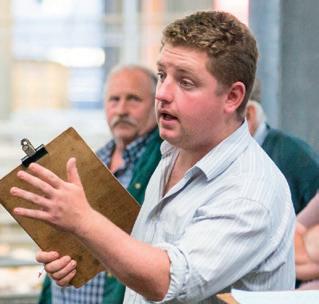
Consider the situation where one is able to sow a perennial cereal crop, possibly with a companion planting of clovers, to supply nitrogen needs, a crop that is multi functional and flexible; a plant capable of providing a useful cereal crop, with grain harvested and stored as any other cereal crop, either for sale or used as feed on farm, but with the added benefits of continued growth post harvest, with the capacity to provide some useful autumn/winter grazing.
Alternatively, it would be possible to eliminate the combine harvester and simply use it as an arable silage/haylage/hay crop, with the additional benefits of significant aftermath, ideal for a bale and graze system for
fattening lambs or overwintering ewes. Sadly not available for this year, but based on the rapid progress being made in the US, it could be a reality in the not-too-distant future. There are lots of positives out there, opportunities to innovate, to reduce our costs of production; how about tree crops that can contribute to sheep nutrition? They are available, there is simply a need to explore and develop their potential for our own situations.
And for a bit of interesting reading, have a look at the report produced by the Sustain organisation, entitled Unpicking food prices: Where does your food pound go and why do farmers get so little?, available online as a free download.
WWW.SOUTHEASTFARMER.NET | JANUARY 2023 35 TO ADVERTISE CALL 01303 233883 AT ASHFORD MARKET
Reporting on the market at Ashford T: 01233 502222 www.hobbsparker.co.uk
JOHN ROSSITER
THE FARMING CALENDAR
By looking ahead for the coming year we can use health planning as a tool to identify issues that have reduced performance and productivity, implement health protocols and set appropriate targets. Herd and flock health is vital to ensuing your farm is profitable, and profitability comes by efficiently keeping your animals in the best condition.
WHAT ARE THE KEY STAGES OF HEALTH PLANNING?
• Protocols – your current management for treating and preventing diseases, as well as routine procedures
• Records – treatments given and disease incidence, which is why it’s also useful to keep your medicine book up to date.
• Review – to ensure we’re achieving the targets that have been set from the previous year and looking for ways we can improve for the next year
• Action – putting into practice the plans you have made.
WHAT ARE THE KEY FEATURES OF HEALTH PLANNING?
• It is specific to your farm
• It should be practical and easy to use; large documents are rarely read, so it needs to be simple and practical
• It needs to be reviewed and updated regularly; it can highlight problem areas but can also be useful to challenge usual practices and how they can be improved
• It should rely on advice, especially when reviewing health management issues
• It must include biosecurity
• It needs to reflect good farm management and practices.
HOW TO USE YOUR HEALTH PLAN TO PREVENT INFECTIOUS DISEASES
Protecting your herd or flock from infectious diseases such as bovine viral diarrhoea, infectious bovine rhinotracheitis and enzootic abortion is critical to a farm’s success.
Creating your health plan in conjunction with your vet is a vital first step towards preventing disease. It should outline the disease status of your farm, identifying key challenges and areas of risk. This will help provide a framework for prevention strategies and outline how existing problems can be tackled and measured.
CREATE A CALENDAR TO FOLLOW EASILY
A useful calendar helps you plan and track farm health activities throughout the year. By working with your vet on this, you can make informed decisions on the best use of medicines.
Your health plan can help manage and simplify the timing, product choices and application protocols of animal treatments, which in turn will improve the effectiveness of disease control. Your health plan and calendar should include activities such as faecal worm
Westpoint Horsham T: 01306 628086
Westpoint Ashford T: 01306 628208
egg count, used both pre- and post-treatment as well as to assess resistance levels.
Additional tools for parasites are screening for liver fluke, testing for coproantigen in faeces or antibodies in the blood. Disease due to parasites is often weather-dependent, so every year is likely to be different and treatment protocols will vary accordingly. Having a system in place as a reminder of when to test for parasites can be vital for animal health.
This can continue with infectious disease testing and prevention schemes. Having dates regarding when to test and when/which animals to vaccinate can be crucial to ensure specific points in time aren’t missed, such as vaccinating breeding sheep with abortion vaccine at least four weeks before mating.

MONITORING AND ADAPTING IS ESSENTIAL THROUGHOUT THE YEAR
There’s no better time to start health planning than the beginning of the year, but practices and procedures need to be reviewed continually throughout the year and their effectiveness monitored while still dealing with issues. It becomes a constant circle resulting in improved health and welfare.
If you would like more information on health planning offered by Westpoint Farm Vets contact:
If you would like to discuss anything covered in this article contact your local Westpoint practice
Westpoint Sevenoaks T: 01959 564383
Westpoint Winchester T: 01962 779593
Westpoint Chelmsford T: 01306 628489
EMILY PHIPPS
E: sevenoaks@westpointfarmvets.co.uk
T: Westpoint Farm Vets Sevenoaks
JANUARY 2023 | WWW.SOUTHEASTFARMER.NET
ADVICE FROM THE VET
36
E: info@westpointfarmvets.co.uk www.westpointfarmvets.co.uk
Where to start with health planning by Emily Phipps, Sevenoaks branch.
WE ARE SIMPLY WAITING TO SPEAK”



As most of the time we write about animals, this time I thought I would change direction and talk about people, and in particular people management. This follows a meeting we had with Becky Miles from Real Success, from whom I pinched the quote in the title.
I am privileged to be part of the Women in Dairy Sussex/Kent group. Within this group we have covered all sorts of animal management matters but recently we were lucky to have Becky come and talk to us about managing a team, no matter how great or small.
A little quiz at the start opened our eyes to how important communication, but in particular listening, is. How often do we actually listen to people around us? This powerful exercise proved we are ‘waiting to speak’ rather than listening. Did you know the biggest reason people leave a job is because they feel they are not being heard? That’s one to think about.
We didn’t have time to think about that too much because we were straight onto working out what kind of ‘character’ we all were. Now I realise this might sound a bit ‘airy fairy’, but it proved to be so interesting and revealing. And how useful to realise that people act the way they do partly because of the character type they are. Knowing this about yourself, but more importantly about other people in your team, can really help with the way we communicate with each other.
Within our group of 12 women, all character traits were represented. The question: “How do we like to be approached?” led to a lively but fun discussion. It certainly made me realise why I prefer a cuppa (apart from it warming you up when it is minus five degrees) and a chat before we then get to business. But then also why this could possibly infuriate others who just want to crack on.
I certainly think any team of people, but particularly a farm team, could do with this kind of training. And why I refer specifically to farming stems, I guess, from thinking about whether or not you have appraisals on a regular basis with your team. As for the vets, I am certainly keen to look at doing this for our team.


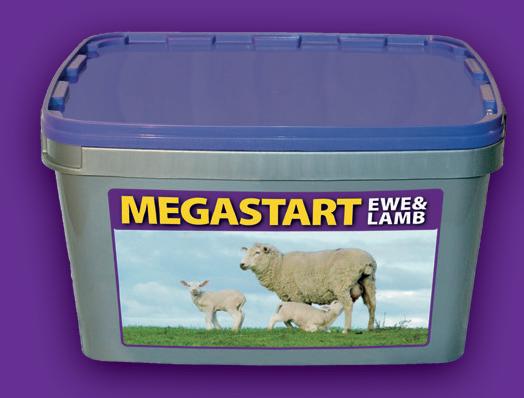



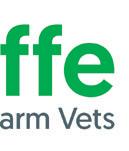
On a last note, for those of you reading this and thinking “I have never even heard of Women in Dairy”, it is an initiative from The Royal Association of British Dairy Farmers (RABDF), designed to bring women working in our industry together through regional discussion group meetings to learn, network and promote the image of dairy farming.

At the moment we have about 20 members and we meet roughly every two to three months. It is a great way to meet up with people in the same business and local to you, and at the same time learn something. If you are interested, please contact us on widsussexkent@gmail.com

And as for Becky and Real Success, well I did think it was a real success; you can find out more about them on their website real-success.co.uk.

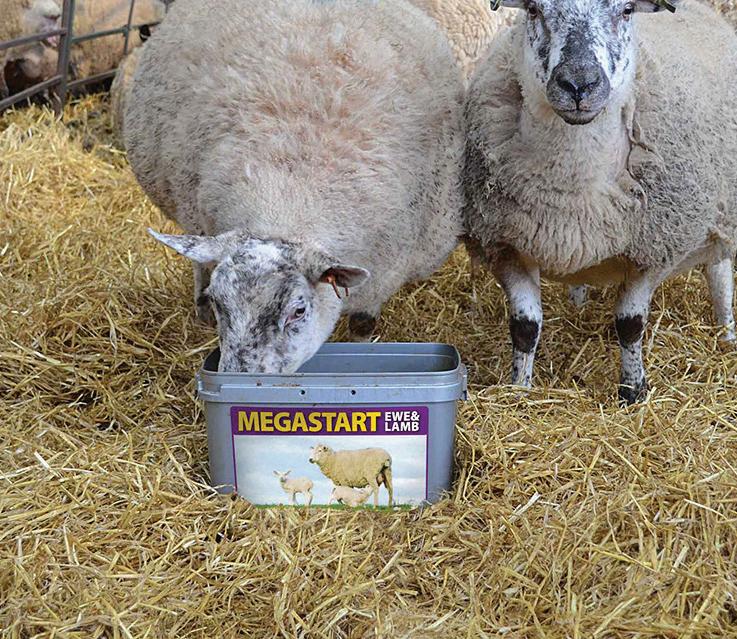

WWW.SOUTHEASTFARMER.NET | JANUARY 2023 37 TO ADVERTISE CALL 01303 233883 “WE’RE NOT LISTENING,
NANJA VERKUIJL BVM&S MRCVS, Cliffe Veterinary Group T: 01273 473232 E: nanja@cliffevets.co.uk www.cliffefarm.co.uk
MEGASTART EWE&LAMB 01292 280909 www.scotmin.com info@scotmin.com Or contact your local supplier The best START in life you can give A free access feed tub used in the 4-6 weeks prior to lambing Provides ewes with an excellent source of energy from sugars, starch and protected fat Includes high quality MOS designed to improve colostrum quality Vitamins, minerals and trace elements incorporated at optimum levels to achieve enhanced animal performance High in Vitamin E and Selenium to promote a healthy immune system Available in 80Kg and 20Kg Tubs Follow Scotmin
TRULY A STAR PERFORMER
How many birds have you lost around your farms these past two years? It really only dawned on me this past autumn, but I now realise we have been losing them for a couple of years. It really started to show last spring when our nearby rookery was almost deserted. For a while I blamed the herring gulls, which have started nesting on a nearby rooftop, and I know they cleared a few rooks’ nests of eggs and young birds, but they only did limited damage to overall numbers.
The rookery, which five years back consisted of upwards of 45 to 50 nests, was suddenly reduced to around a dozen. Going back, before 1978 our little hamlet had two huge rookeries of upwards of 100 nests in each, atop our big old elms; now the rooks have sadly followed the elms.
Then I look around at the rarer birds. The buzzards, which have been breeding around our quieter corners and certainly numbered upwards of half a dozen locally, now seem to be down to two or three. I know they are not everyone’s favourite but, with little game shooting in the locality these days, the likelihood of shooting being the reason doesn’t really exist any longer. We welcomed them.
Two or three years ago we had the really rare appearance of a pair of ravens around the farms. I didn’t search for, or locate, their nest, although it was reported as being close and well hidden, but these last months nothing has been seen of the birds. Similarly, the little local heronry on my neighbour’s land hardly has any birds. They have increasingly lived off neighbours’ fish ponds, so I don’t suppose their disappearance will be of any concern to the neighbours, but where have they all gone?
To the gardens now, and the bird feeders are hardly being touched by the sparrows, blackbirds and various tits, while most of the finches have also disappeared too (but that’s
NICK ADAMES Former dairy farmer
been over a longer period), when 12 months back we had to refill feeders almost daily.
Another mystery?









The only species which appears to be maintaining their numbers are magpies and jays, but they can hardly be blamed for taking any of those mentioned here apart from a few smaller species in the breeding season. I have noticed the usual couple of green woodpeckers still attacking ants on our lawns, our usual small but regular number of pheasants and the odd robin, but very few others. So, what’s the answer?
The obvious one is avian flu, which has affected domestic fowl and numbers of other important species such as mute swans, so it needs to be a great concern to everyone, although there appears nothing man can do. There’s not even anyone to blame. It’s not particularly easy to get all the birds rounded up for a ‘Covid-19’ type vaccination policy, so I suppose it is something that’s simply going to have to run its course while we hope immunity eventually develops. One only hopes nature looks after itself. The world would be a very sad and strange place without our wonderful bird life.
Readers may have seen my notes last month about Wally Elvin. I think it was in 1990 that our then vet, Paul Crossman, asked if I would be interested in meeting Wally because the herd he had been managing was being sold and Paul thought he would fit into my dairy business. I was needing a calf rearer and drystockman, so I jumped at it, and Wally and I met a day or two later. We hit it off and now here we are still working together over 30 years later.
Many people may know Wally through
football. He started off as a 16 year-old youth player with Norwich City, then with Spurs, but neither quite worked out. He cheerfully told me early on he was a ‘failed footballer’. Instead, he qualified as a referee, working in the lower leagues across the South East, all while working on local dairy farms, becoming herd manager on one.

When he reached retirement age (as a ref) the FA offered to retain his services, and so, for the past 20-plus years he has been in charge of arranging officials, referees and linesmen, for league games in the South East, a job he has done so successfully that when he reached his actual retirement age, the FA made an exception and kept him on again, and he’s still doing it!

As a calf rearer he was quite excellent. He reared and looked after all our new calves and reared the heifers through until they calved in as replacements for the two herds. His ‘little darlings’ were treated like family, with sickness almost unheard of. I don’t think he ever had a case of pneumonia, citing ‘dry beds and good ventilation’ as the reason. However difficult a calving, he was almost as adept as vets in getting a live calf and, all in all, was a huge asset to the business.


When the herds were amalgamated in the mid 90s, his work became a bit simpler. He clearly stated that he wanted to stay with us, saying: “I will stop when you do,” and so here we are, yet another new year with Wally still doing anything needed here, still organising big numbers of FA officials every week through winter and still helping his son’s gardening business some three to four days a week. They don’t make many men like him.
Wally is truly a star performer, not perhaps a Lionel Messi on the pitch but a star off it, in so many different ways. He’s certainly not failed as a stockman.
Wally – 30 years' service and still going strong
Wally and Angus Wesley
JANUARY 2023 | WWW.SOUTHEASTFARMER.NET 38 NICK ADAMES WEST SUSSEX DIARY
Ten heifers ready to go to Ireland being persuaded by Wally
YOUNG HANDLERS FANTASTIC FOR THE FUTURE


A strong contingent of young handlers helped make this year’s South Eastern Prime Stock Winter Fayre at the South of England Showground in Ardingly another great success.
Exhibitors from far afield contributed to what organiser James Dickson of Dickson Farming described as “an exceptional show”, while young handlers across a number of age groups showed both sheep and cattle, something he said was “fantastic for the future of British agriculture”.


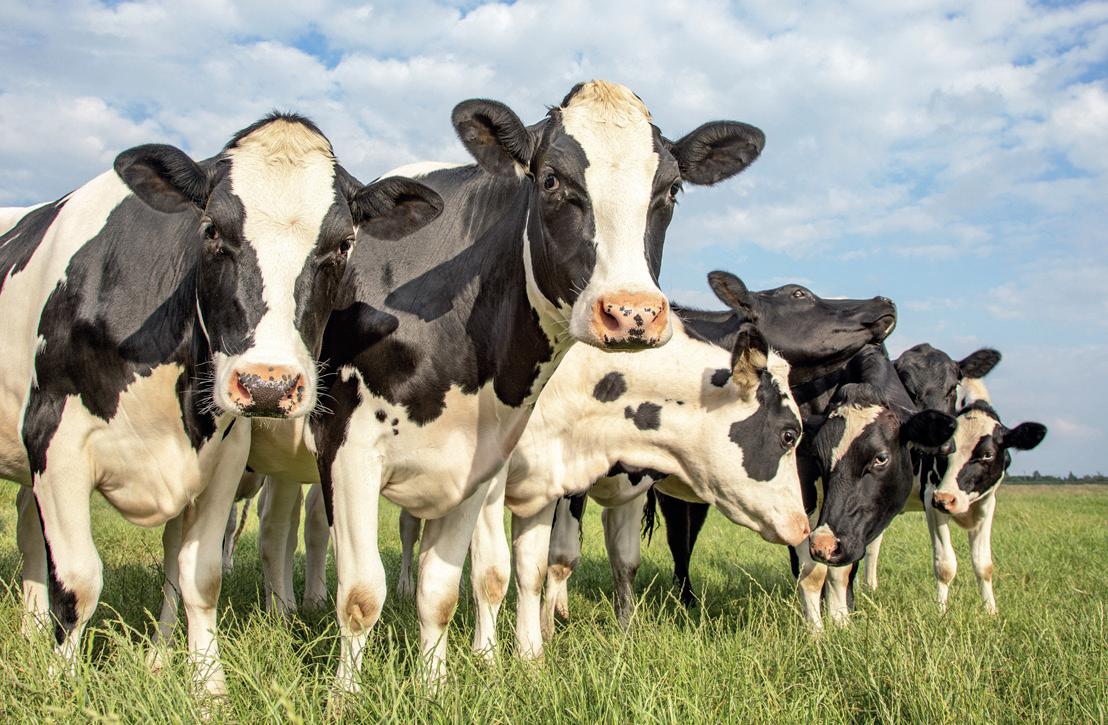





Highlight of the 2022 show was the Champion Lamb carcass from David and Kirsty Tester from Angmering in West Sussex which achieved an impressive £20/kg. Auctioned by Roger Waters of South East Marts, it so impressed carcass judge Matthew Prince, of Highfield House Farm, Ashover, Chesterfield, that he bought it.
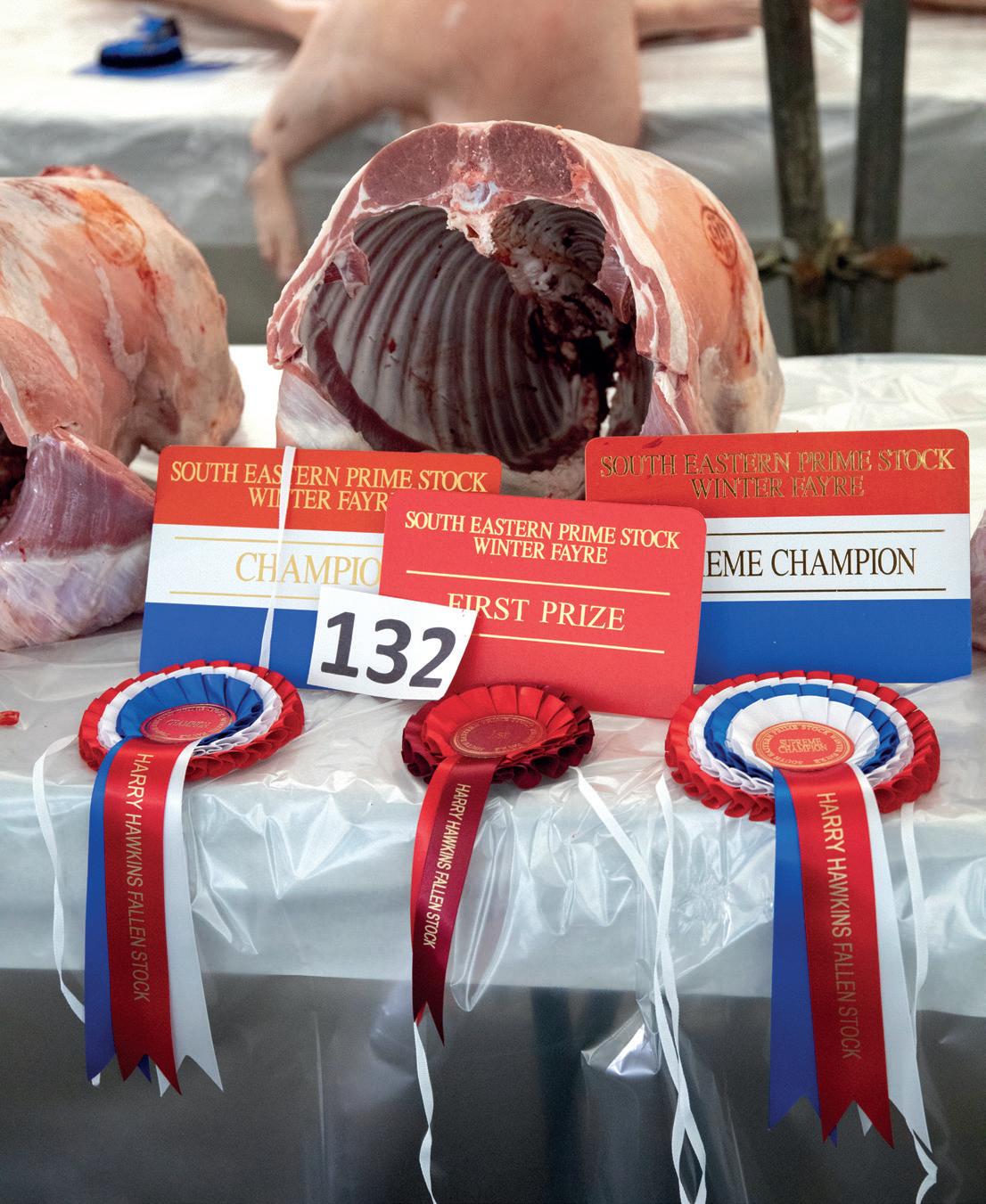
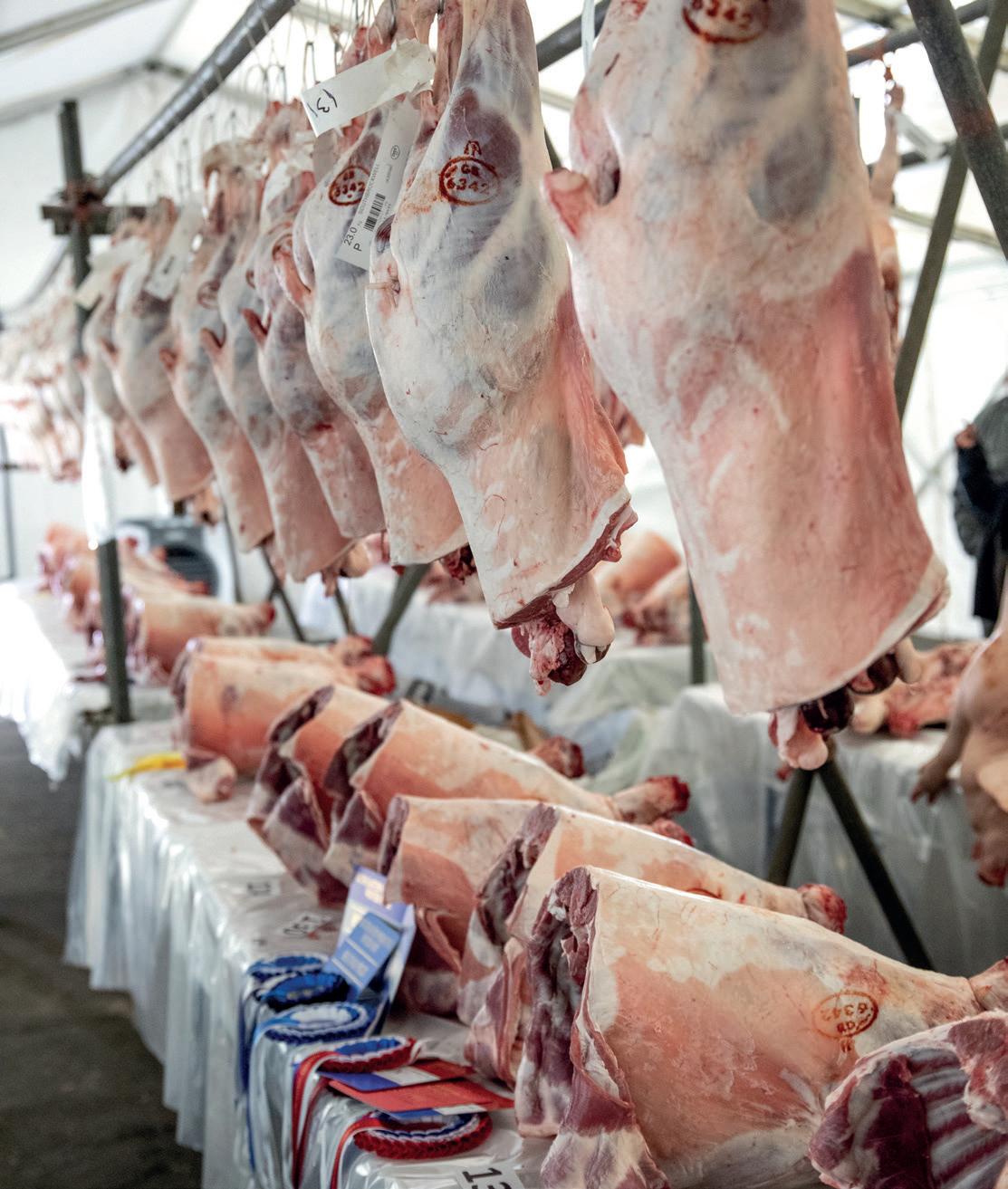
In the fat cattle classes, Sean Marsh scooped the honours with a British Blue X heifer while SC & GI Hartwright’s Hereford bull was named champion calf.
This year’s event hosted both the South Eastern Charolais Calf Show, which was won by David Ross with heifer Chameran Sheri, and the Southern Beef Shorthorn Club Calf Show, which was very well attended and won by Hursley Flossy Saffron, a heifer calf bred by Hursley Farm Partnership.
In the sheep classes, Joshua Jack showed the champion pair of lambs with a pair of Beltex and Nick Page of the Goodwood Estate took champion pen of three butchers’ lambs with a trio of Dutch Spotted X Southdown.
East Sutton Park’s Pietrain cross won the championship in the live pig classes.
WWW.SOUTHEASTFARMER.NET | JANUARY 2023 39 TO ADVERTISE CALL 01303 233883 SOUTH EASTERN PRIME STOCK WINTER FAYRE
100% Farm Vets westpoint farm vets Supporting British Livestock Agriculture Since 2000 New client visits are FREE - book yours today! Westpoint Farm Vets Dawes Farm, Bognor Road, Warnham, West Sussex, RH12 3SH info@westpointfarmvets co.uk | westpointfarmvets co.uk Our teams of experienced, highly-qualified vets are focused on driving farm efficiency and animal health across the South East Westpoint Ashford covering Kent & East Sussex 01306 628208 Westpoint Winchester covering Hampshire 01962 779593 Westpoint Chelmsford covering Essex 01306 628489 Westpoint Horsham covering Surrey, Sussex and Kent 01306 628086
Photos: Lucy Carnaghan Photography
COLCHESTER PRIME STOCK SHOW




A TREMENDOUS SHOW


The Colchester Prime Stock Show in December saw 69 prime cattle, including 41 in the Show Classes, come before the judge, Andrew Clarke of H G Blake Ltd, Felthorpe, Norfolk, whose company supports the market on a weekly basis. A tremendous show of generally handy weight cattle gave the judge an interesting job to pull out prize winners.
After due deliberation Andrew awarded the Supreme Show Championship to Lee Byam of Swilland for a sweet, home-bred Limousin heifer that was awarded the Olivers Perpetual Trophy, the Broad Oak Farm Perpetual Cup for Best Butcher’s Beast 550kg and
Under, the Derek Abra Perpetual Cup for Best Butcher’s Heifer 550kg and Under and Best Limousin-Sired Heifer in Show. After strong competition the beast was knocked down to John Coleman, Boxted, for his retail shop at 655p/kg (£3,602.50), the price per kg being a record for this centre.
The Overall Reserve Championship was awarded to W A Ketley & Sons, Fingringhoe, for a superb Limousin steer from the Heavy Steer Class, being awarded the Roy Brazier Trophy and the Reserve Cup for Show as well as the Best Limousin Sired Steer in Show. After strong bidding the beast was sold to Allman Fowler, Fowler Bros, Burnham on Crouch, at 460p/kg (£2,709.40).
Gerald and William Ketley continued their success story by being awarded the Arthur Chalke Perpetual Trophy for Best Heifer over 550kg, again sold to Allman Fowler at 300p/kg (£1,875).
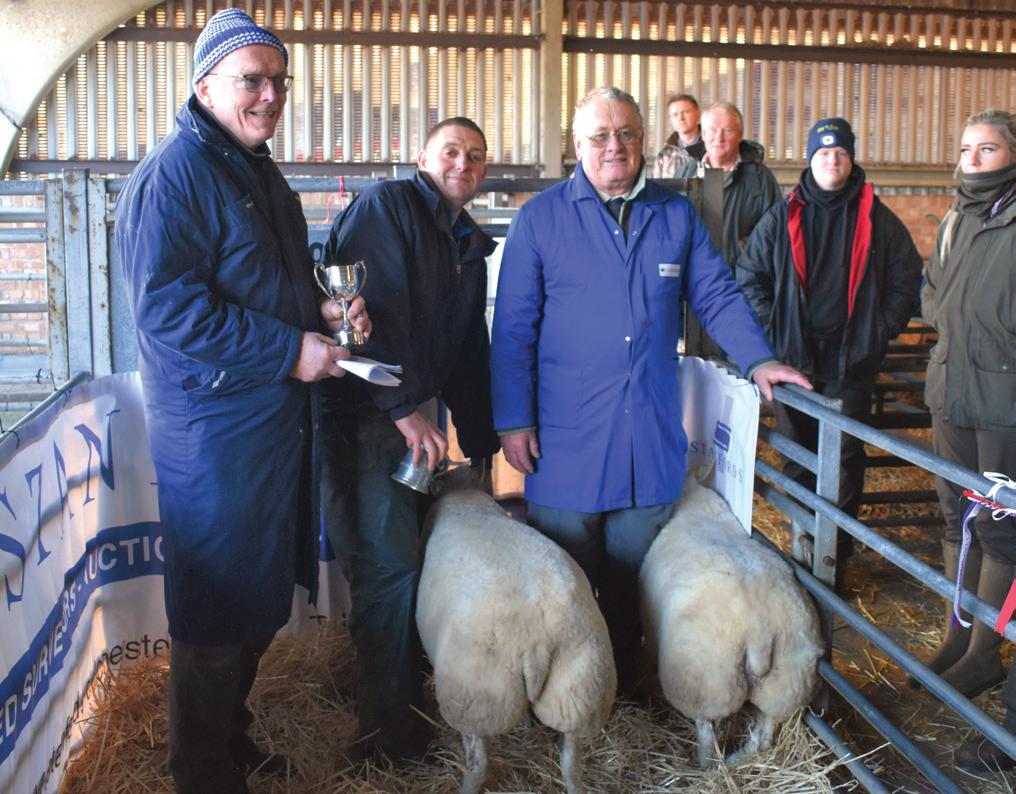
The Derek Abra Perpetual Trophy for Best Steer 550kg or Under was awarded to R & G
R Freeman, Bredfield, for another smart Limousin which sold to Colin Byford, Little Clacton, at 300p/kg (£1,593).
The Ketleys, returning to their winning ways, were awarded the Eric Stanion Memorial Trophy for Best Home Bred Beast of any weight, which went to a Limousin X heifer and was sold to Ben Whiting of East Anglian Trailers Ltd, Elmstead Market, at 325p/kg (£2,067). The Ketleys were also awarded the Best Home Bred Steer in Show, which sold to Allman Fowler at 310p/kg (£1,875.50).
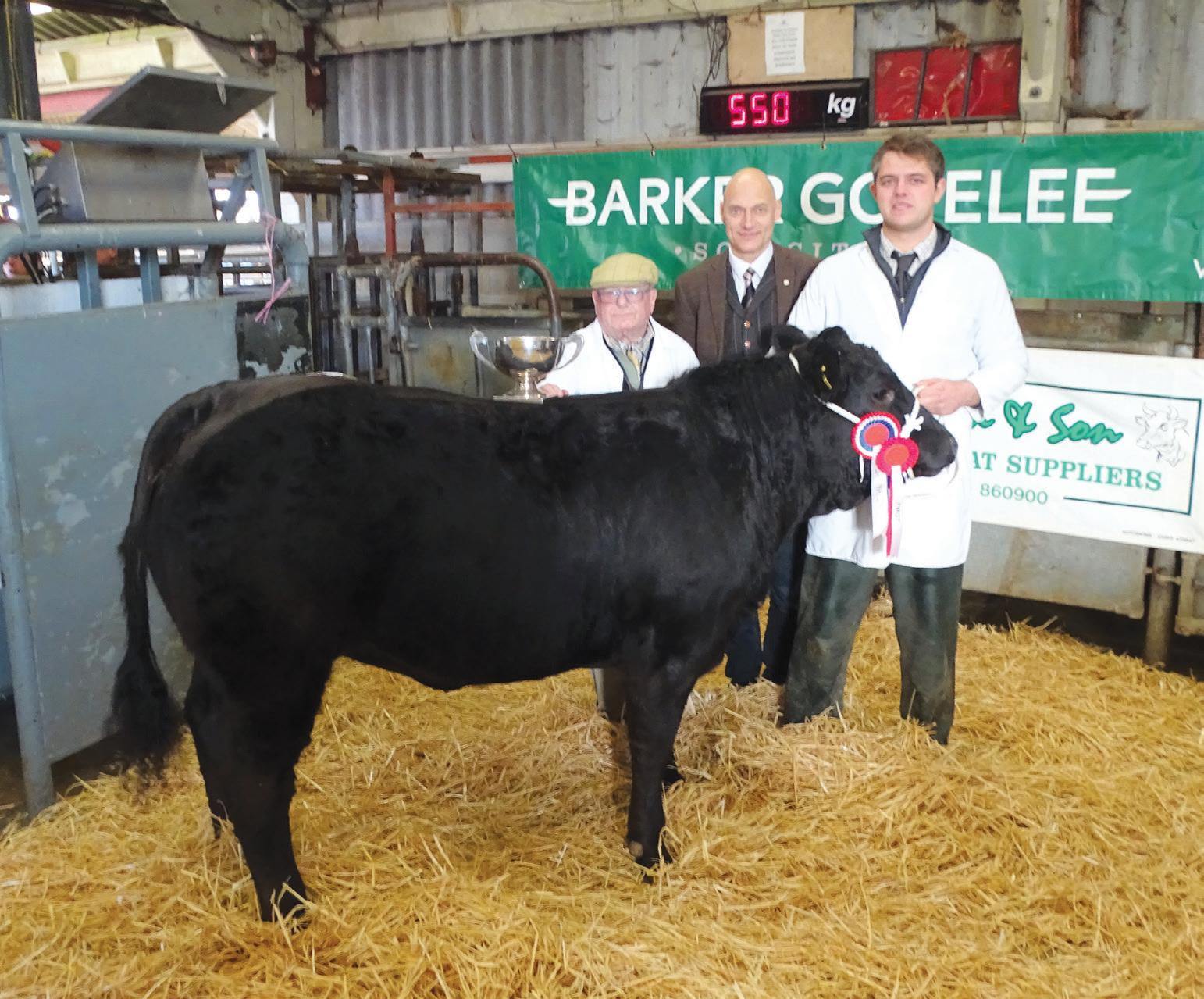
The Joe Papworth Memorial Trophy for Best Unhaltered Beast in Show was also awarded to the Ketleys and bought by the Judge, Andrew
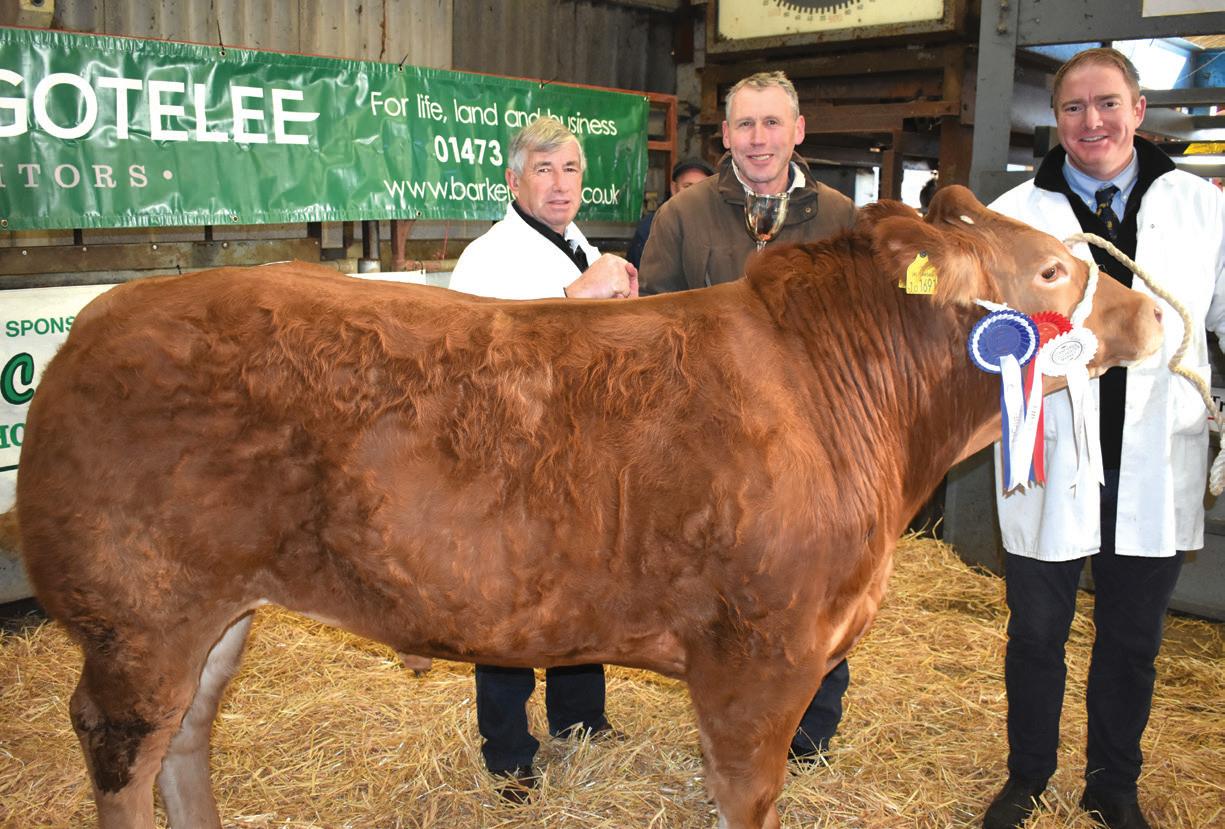
JANUARY 2023 | WWW.SOUTHEASTFARMER.NET
40
Champion Sheep: Vendor: Benn Lugsden Buyer: George Debman, Ipswich Graham Ellis, Stanfords
Reserve Champion Beast: Vendor: W A Ketley & Sons – Gerald & William Ketley Buyer: Allman Fowler, Fowler Bros, Burnham on Crouch
Champion Beast: Vendor: Lee Byam Buyer: John Coleman, Boxted Steve Wright, Stanfords
Clarke of H G Blake, at 300p/kg (£1,779).
The Best Unhaltered Heifer in the Show was awarded to Martin Byford, Weeley and sold to Colin Byford, Little Clacton, at 320p/kg (£1,632).
All prize-winning cattle averaged 322.62p/kg, reflecting the strong trade throughout.
Non prize-winning cattle also competed strongly, achieving 310/pkg for a handy weight Limousin heifer from Tony Keeling, Mendlesham Green, David Alpe achieving 305p/kg (£1,836.10) and the Ketleys to the same price per kg (£1,787.30).
All Show cattle forward saw an average of 291.95p/kg, with heifers to 307.89 and steers at 278.18p/kg.
Non-Show cattle were keenly sought. Prices achieved: Shorthorn steers to 251.5p/kg (£1,483.85) from R N Cansdale & Sons; Simmental steer from the same vendor to 249.5p/kg (£1,699.10); Shorthorn heifer from J W Gray to 232.5p/kg with Hereford X heifer from the same vendor to 246.5p/kg; Sussex heifer from Bob Manning to 234.5p/kg with Red Poll steer to 199.5p/kg.
Telmara Farm Ltd showed two small Simmental steers to 260.5p/kg and a heifer to 257.5p/kg and A Heath & Sons’ usual run of BBX dairy heifers went to 257.5p/kg, with the six averaging 248.17p/kg.
Ben Whiting of East Anglian Trailers Ltd was awarded second prize in the Home Bred Steer Class and agreed to donate all proceeds to the My Name is Doddie Appeal for Motor Neurone Disease. The beast was generously purchased by Graham and Chris Hinsley of Messrs Hinsley Transport at £1,504.50 the head (295p/kg).
The Freeman and Byam families also agreed to donate their prize money from the cattle classes as did Chris Meeks of La Hogue Farm Foods, and Stanfords will make the total donation up to £2,000.
Judge Cyril Byford cast his eye over 613 sheep and two goats, including 78 in the three Show Classes, and awarded the William Gray Perpetual Challenge Cup for the Best Pair of Lambs in the Show to Benn Lugsden of Thwaite for a pair of Texel lambs weighing 43.5kg and selling to £250 a head (565p/kg) to George Debman, Ipswich, for his retail shop. The pair also won the Wiston Trophy for Best Lambs Sired by a Texel Tup.
The Reserve Pen of Two Lambs prize was awarded to Scott Horton of Chess Valley Livestock for a pair of Charollais X lambs that was awarded the George Debman Perpetual Trophy for any Continental lamb other than Texel. They were purchased by Joe Lennox on behalf of Fowler Bros, Burnham on Crouch, at £150 a head (349p/kg).
The Best Pen of Traditional Lambs went to Chris Meeks of La Hogue Farm Foods for a pair of Suffolk X lambs purchased by George Debman at £160 a head (320p/kg), the lambs winning the Colchester District Meat Traders’ Association Trophy for Best Native Bred Lambs.
As has been the case for many weeks, sheep of 42 to 50kg are in strongest demand, regularly fetching 270 to 300p/kg with meat and conformation required.
Top price for non-prize winners was £173 a head for 56kg lambs from La Hogue Farm Foods.
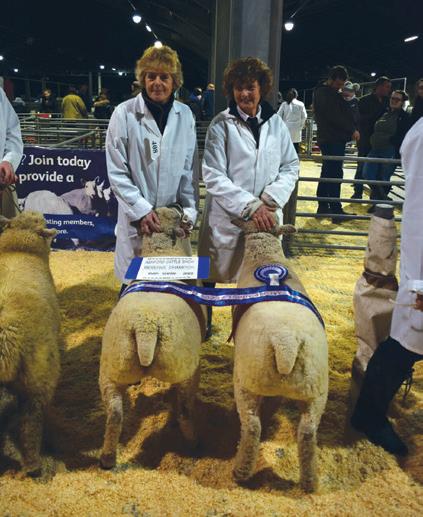
ASHFORD CATTLE SHOW
ASHFORD CATTLE SHOW SUCCESSES
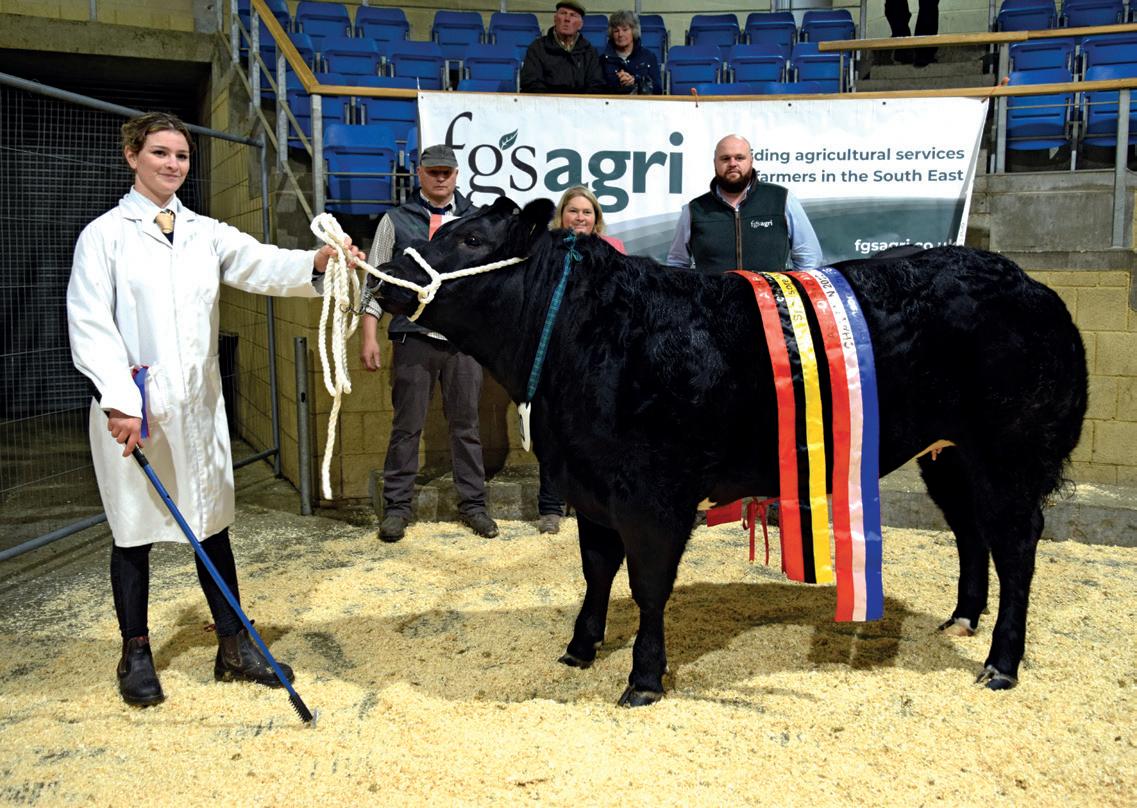
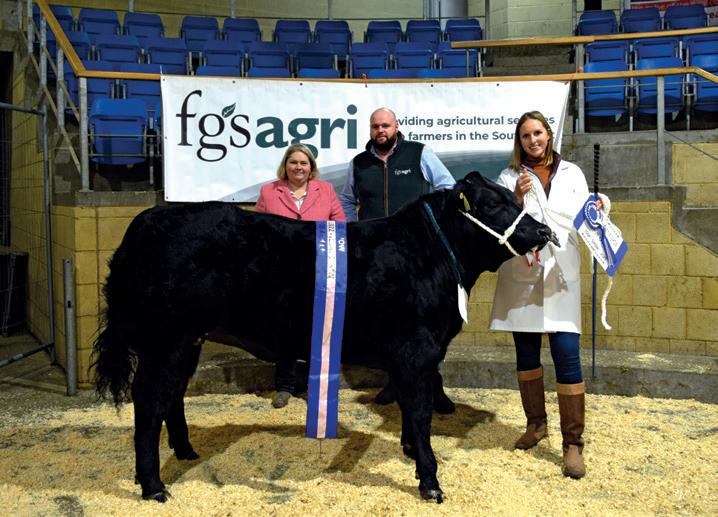
The pick of the winners at the historic 2022 Ashford Cattle Show:
• Supreme Champion Heifer (lot 20):
British Blue Cross – exhibited by Mr S and Miss P Marsh
• Reserve Supreme Champion Heifer (lot 19):
Limousin Cross – exhibited by Mr S and Miss P Marsh
• Champion Steer (lot 16):
Limousin Cross – exhibited by Mr S and Miss P Marsh
• Reserve Champion Steer (lot 2): Sussex – exhibited by Chandler & Dunn (not shown)
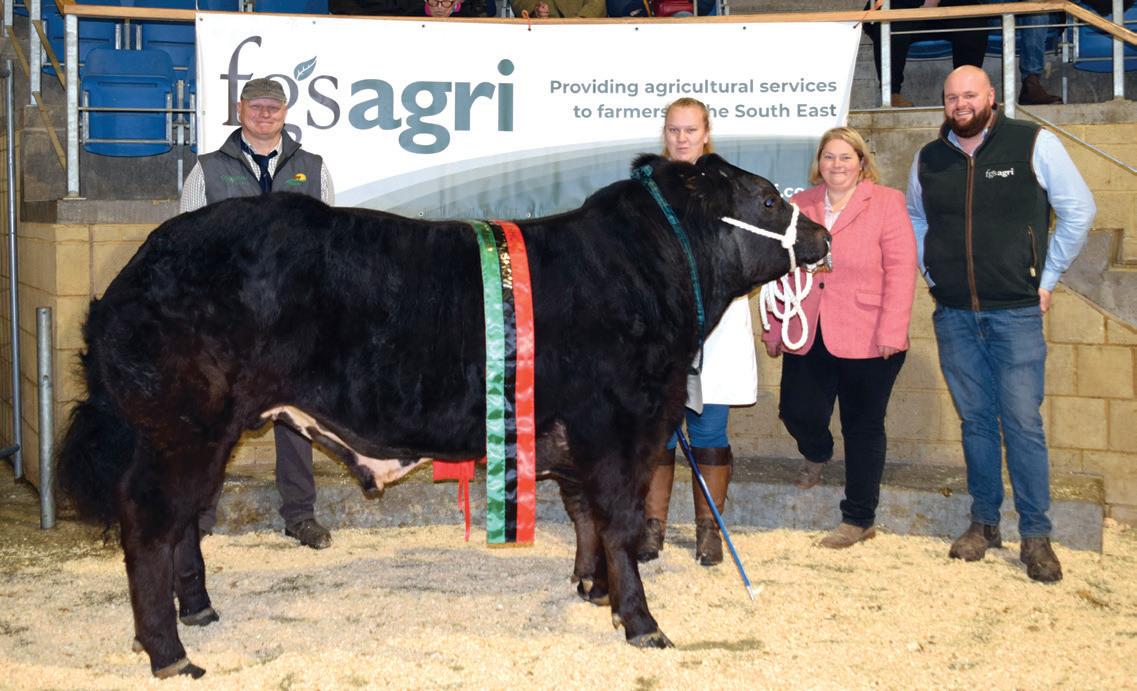
• Champion Pair Lambs (lot 447): Beltex – exhibited by Andy Town (not shown)
• Reserve Champion Pair lambs (lot 408): exhibited by Jenny Heathcote (with Hazel Long)
WWW.SOUTHEASTFARMER.NET | JANUARY 2023 41 TO ADVERTISE CALL 01303 233883
GRAHAM ELLIS FRICS FAAV
FLAA For and on behalf of Stanfords T: 01206 842156 E: info@stanfords-colchester.co.uk www.stanfords-colchester.co.uk
Supreme Champion Heifer Reserve Supreme Heifer
Champion Steer Reserve Pair
IMPRESSIVELY LARGE NUMBER OF GUESTS
The challenge of working with a government seemingly in a permanent state of flux was highlighted by NFU President Minette Batters during a wellreceived address at the 150th Ashford Cattle Show dinner.
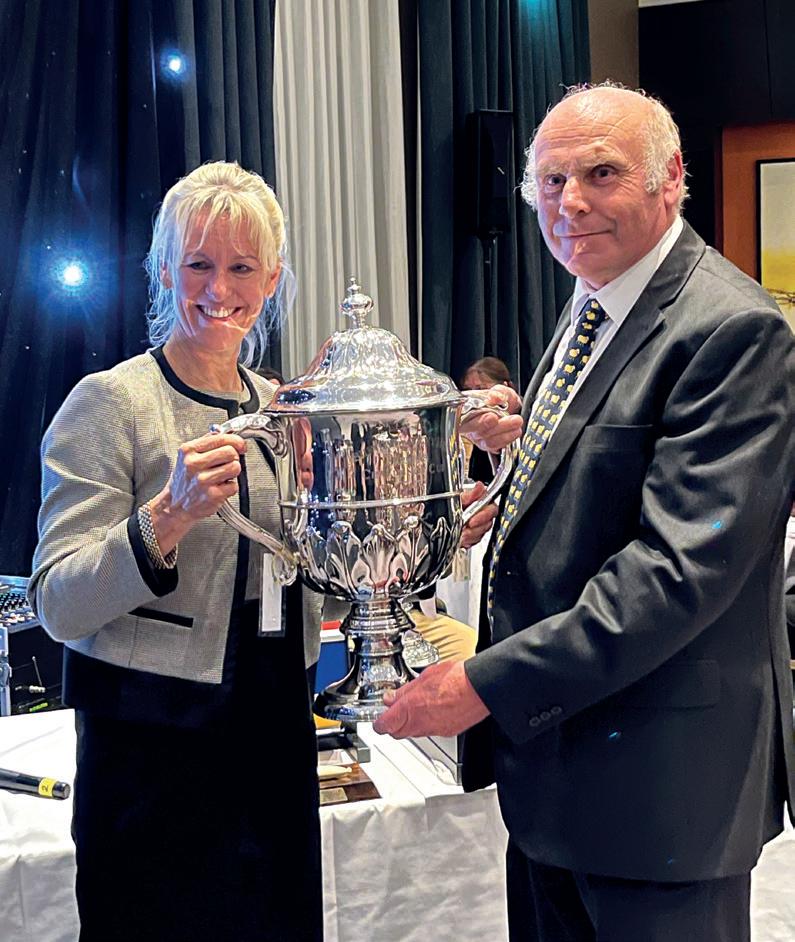

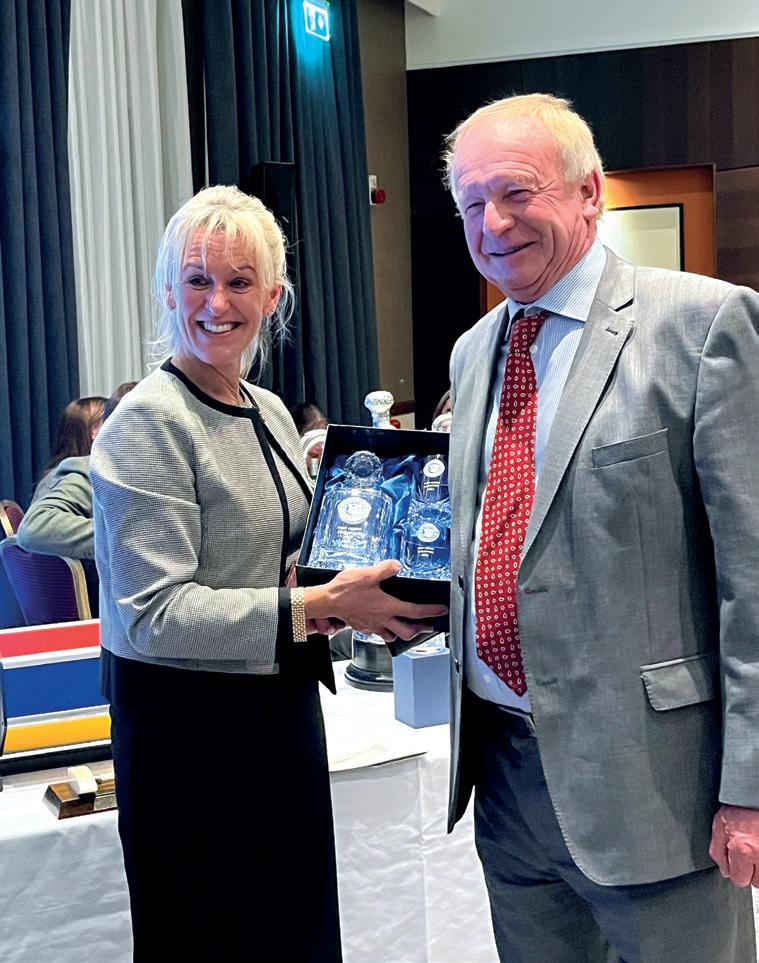
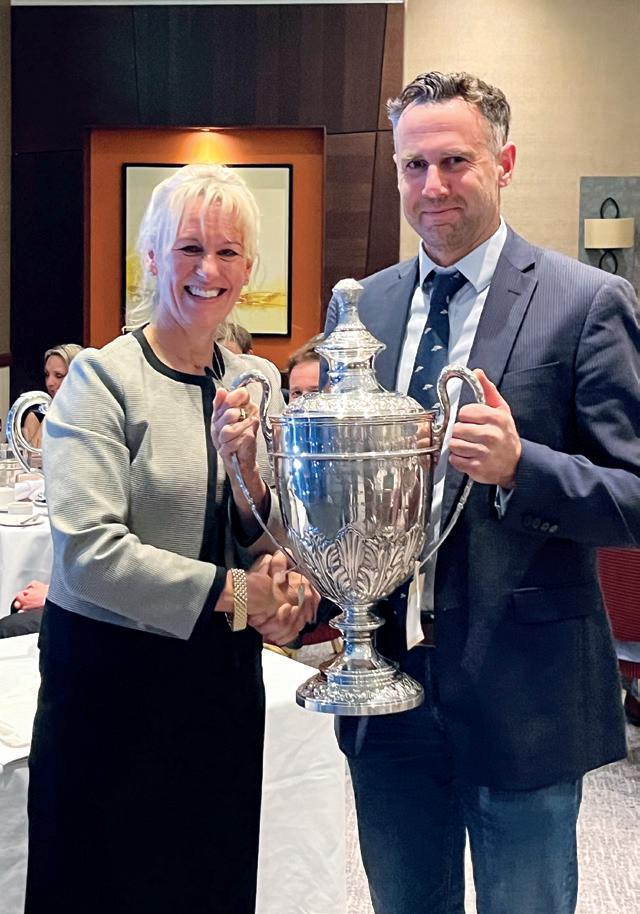
Speaking to an impressively large number of






guests at the event at the Ashford International Hotel, she referred to the “massive period of change” facing agriculture but said the ship had “steadied a bit” following the short-lived Premiership of Liz Truss and the arrival of Rishi Sunak in the top job.
In an unscripted and entertaining address,
she took a sideswipe at ex-Prime Minister Boris Johnson, pointing out that he and wife Carrie had “left a legacy – £18m for beavers”.
Liz Truss, she said, had done more damage by aligning DEFRA with the Department for International Trade (DIT), something which she pointed out had also upset former
James Ledger
Frank Langrish
JANUARY 2023 | WWW.SOUTHEASTFARMER.NET 42 ASHFORD CATTLE SHOW
Larry Cooke
ASHFORD CATTLE SHOW

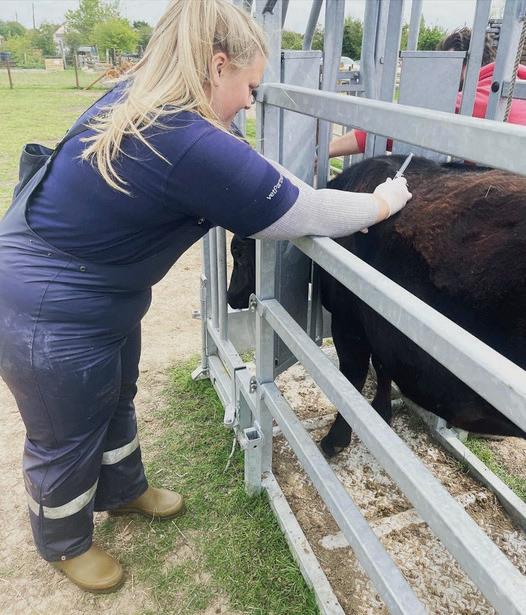
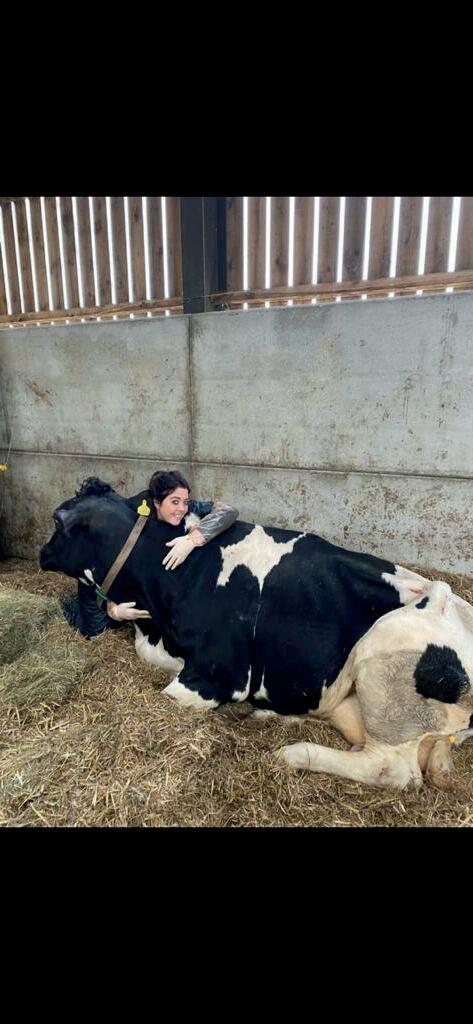

Environment Secretary George Eustice. Ms Batters also hinted at future challenges, pointing out that when she had reminded new Secretary of State Therese Coffey about Rishi Sunak’s earlier commitment to food security and putting food production at the heart of government, she had replied: “That was back in August.”
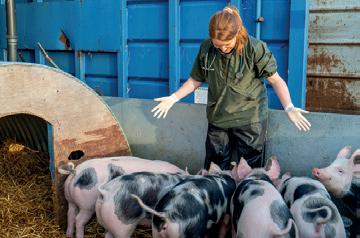



Looking both back and forward at the work of the NFU in support of agriculture in the UK, she ended her address with a rallying cry: “We’ve had to fight and we need to keep fighting.”
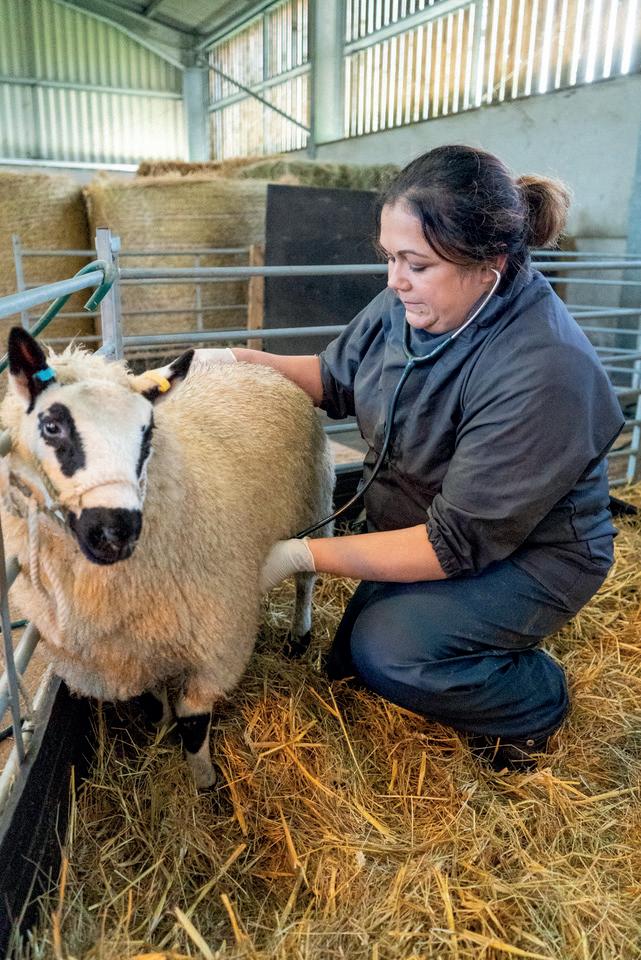
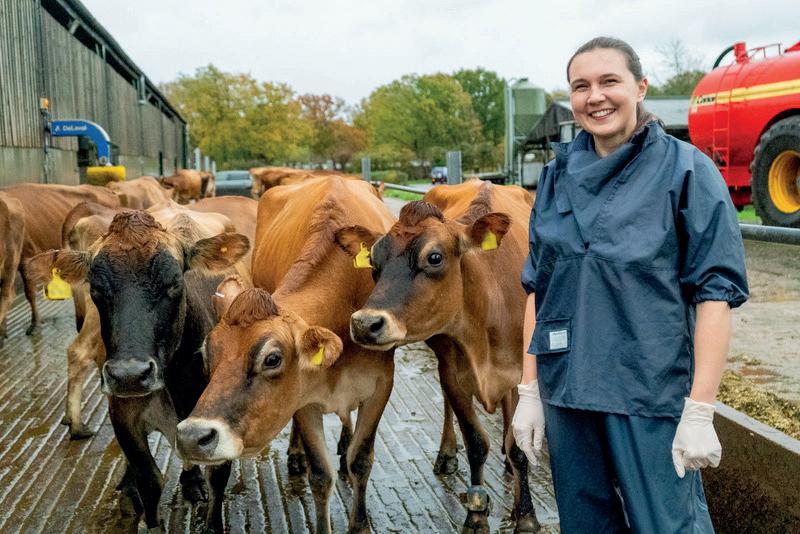
The witty talk by Ms Batters, who runs a tenanted family farm in Wiltshire with a 100-cow continental cross suckler herd, sheep and arable land, plus diversification interests including horse liveries and a conference and wedding venue, was the highlight of a successful anniversary dinner.
The sell-out dinner followed a successful two-day event, the 150th since the show was first held in 1857, with more than a dozen shows cancelled over the years as a result of Covid-19, bluetongue and foot and mouth disease.

Welcoming guests to the event, Show President Trevor Richards highlighted the impressive support given to the show by members of Young Farmers’ clubs. Like the guest speaker he also highlighted the challenges facing the industry, from Brexit to labour shortages, high inflation and overseas trade deals.
It was, though, an evening to be positive, with those present enjoying good food, good company and an impressive guest speaker who also presented the major show prizes to the winners.

A raffle during the evening also helped take the total raised so far for the President’s Charity, Macmillan Cancer Research, to approaching £5,500. Trevor Richards thanked everyone for their support during the year’s fund-raising.
Ms Batters also presented a number of prizes during the evening: The Ashford Valley Hunt Farmers’ Challenge Cup for the best managed flock was presented to Larry Cooke on behalf of W Cooke and sons; The Ashford Cattle Show Challenge Cup for the bestmanaged farm in Kent went to K & M J Attwood
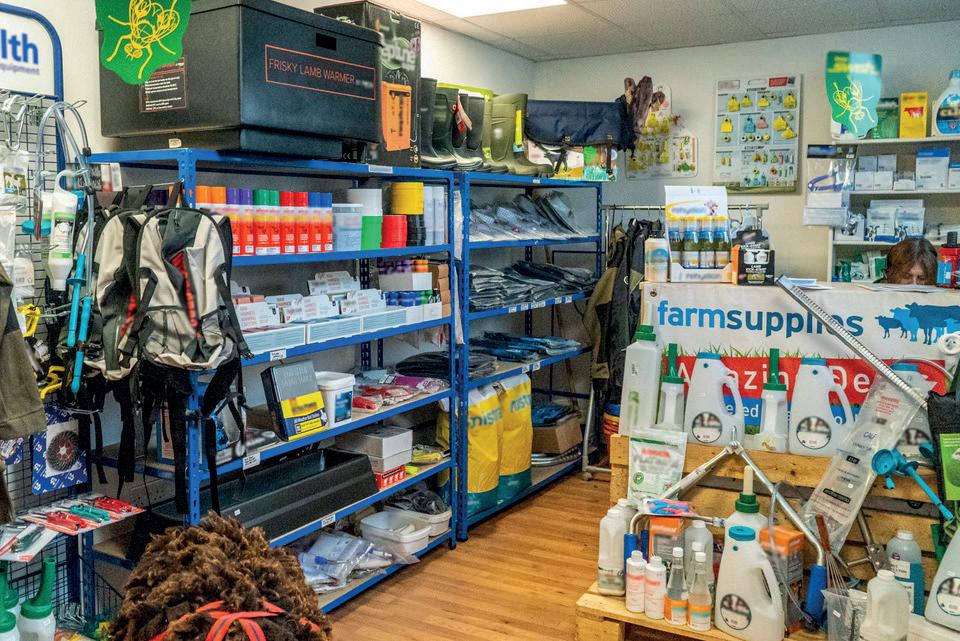
Ltd; The Ashford Cattle Show Challenge Cup for the reserve best managed farm in Kent was won by Little Mongeham Ltd and presented to James Ledger; Championship glassware sponsored by G Bates Ltd was presented to Frank Langrish of Langrish Farmers for winning the beef herds competition.
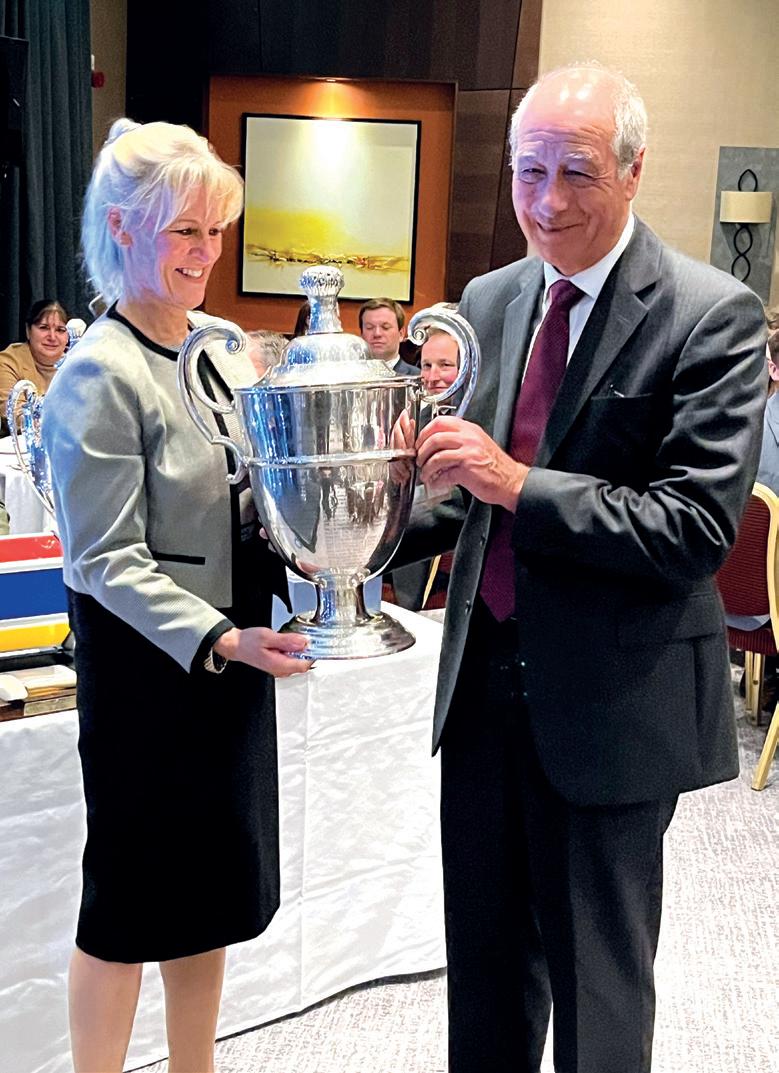
WWW.SOUTHEASTFARMER.NET | JANUARY 2023 43
Kevin Attwood
/westpointfarmvets @westpointfarmvets @westpoint vets A S H F O R D Providing a proactive vet service across the South East from our base in Ashford, close to the market. We are proud of our long standing relationship with the local farming community, and are committed to providing a timely, efficient and evidence based service to our clients, and preventing disease with collaborative health planning for all farm species. We aim to provide the best clinical and advisory services in order to maximise the health, welfare and productivity of your livestock. Ram vasectomy procedures Ram and bull fertility testing and semen analysis Synchronisation and scanning packages Great savings available with our fixed price service project for 2023 including discounts on: For more information on our dedicated, farm-focused service, call us on 01306 628 208 or email ashford@westpointfarmvets.co uk
INVESTMENT IN NEW INFRASTRUCTURE MUST BALANCE COST AND VALUE
Constructing new farm buildings costs money; that much is obvious, but beyond that undeniable fact, there are calculations to be made.
New buildings bring the opportunity for increased productivity, greater efficiency and, of course, a healthier bottom line.
The right new building, constructed expertly by a reliable contractor and designed as part of a carefully thought-out business plan can revolutionise a business and boost profitability considerably.
One of the most important considerations when designing livestock buildings is the
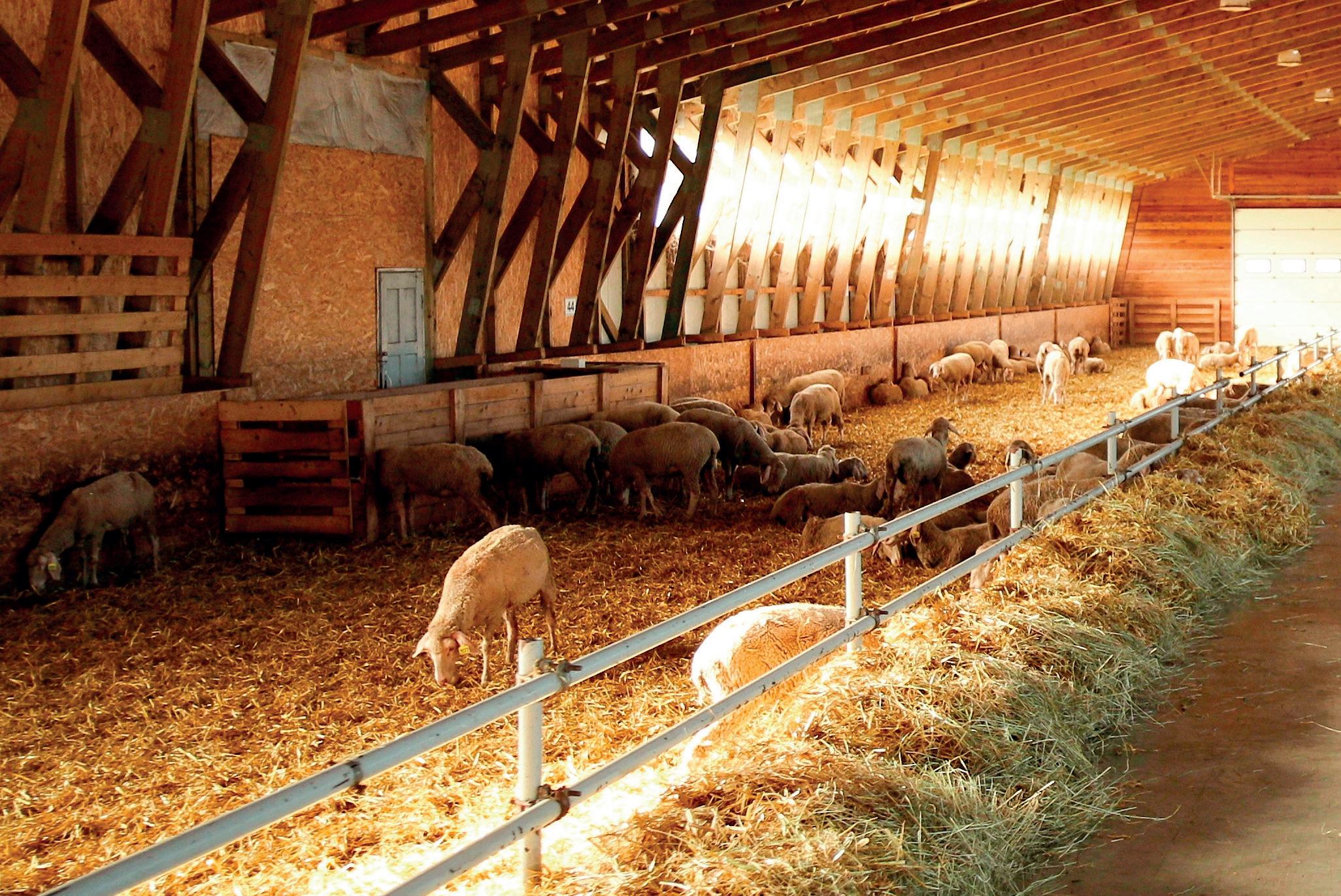
amount of space needed to maximise animal welfare. It’s a topic that was covered by Jamie Robertson, Livestock Consultant with the Rural & Industrial Design & Building Association (RIDBA) in the association’s spring journal.
South East Farmer is grateful to RIDBA and to Jamie for permission to quote from his article here:
“The interaction of space and animal welfare has been mentioned before, along with the suggestion that we need to recognise the value of the quality and quantity of space made available to animals.
In the early days of research into animal welfare and the development of animal systems, the defining physical attributes were space (m2) per animal, ambient temperature and not a lot more.
The optimum number of animals in a group (cows can ‘recognise’ up to 60 cohorts, not more) or the height of water troughs and feeders was evaluated (depends on age), and as the science improved the design of animal systems also included factors such as air changes per hour (based on CO2 production) and the design of sleeping areas (lunge space; cubicle design).
JANUARY 2023 | WWW.SOUTHEASTFARMER.NET 44 FARM CONSTRUCTION
Overall, there emerges an understanding that while we can easily define an equitable unit of space per animal, there is considerable value in the quality of that space, but the quality will often come at a cost. So, the question for the system designer is how much increased cost does the client value?
The UK cattle sector is the same as any other business in that it needs to invest to remain sustainable, and once the ear tags, fancy feed additives, power, water and all the other consumables have been paid for, there is a need to invest in buildings.
They represent a major, once-in-a-lifetime cost, but the aim is to bring in value to the business. The build design process needs to start with the number and size of animals to be housed, group size and feed system.
Immediately there will be conflict, because the industry experience is “We can/cannot keep 10/15/20 cattle per bay” and “We have always done it like this” and “We tried one of those and it did/didn’t work”.
It is not logical to make a once-in-a-lifetime series of technical decisions based on a string of opinions. Instead refer to the information provided by BS5502 and the RIDBA Farm
Buildings Handbook or AHDB guidance material.
The Dairy Housing: A best practice guide (AHDB, 2012) outlines the space requirements in cubicle housing. The book has been freely available for more than ten years and yet producers and builders will still build cattle housing that does not fit industry guidance or – the usual favourite – only use the guidance information they want.
The aim is to house a certain number of cattle at a cost and not at a value. We know that wider passageways, cubicles, feed and water spaces, cross-over passages and holes in the roof all increase the cost per cow, and we need to sell the value of these increased costs.
The benefits of good design outlined in the AHDB Dairy Housing booklet include:
• Longer lying times
• Better feet condition
• Reduced aggressive behaviours
• Reduced fouling
• Reduced risk of udder damage or disease
• Optimised feed and water intake
• Improved bedding conditions
• Reduced slurry pooling
• Reduced heat and cold stress
In addition to the above, improved fertility with adequate floor space and surface, lighting quality and impact of well-designed ventilation on the incidence and severity of respiratory diseases also apply.
The positive value of the cost of these design features on the lifetime of a building will run into the tens of thousands of pounds.
Provision of a large area building for single animal systems can be attractive as a means of restraining build costs per housed animal. Build costs per unit of space can be reduced as the total build space increases, up to a limit.
Builders need to be aware the engineering limits on a single build space are far higher than animal system limits on space. This has been mentioned previously, whereby an increased number of animals in a single airspace increases the risk of the spread of disease.
The poultry sector and, to a lesser extent the pig sector, manage this by designing buildings that match the throughput of animals to facilitate All IN, ALL OUT (AIAO) management of each room.”
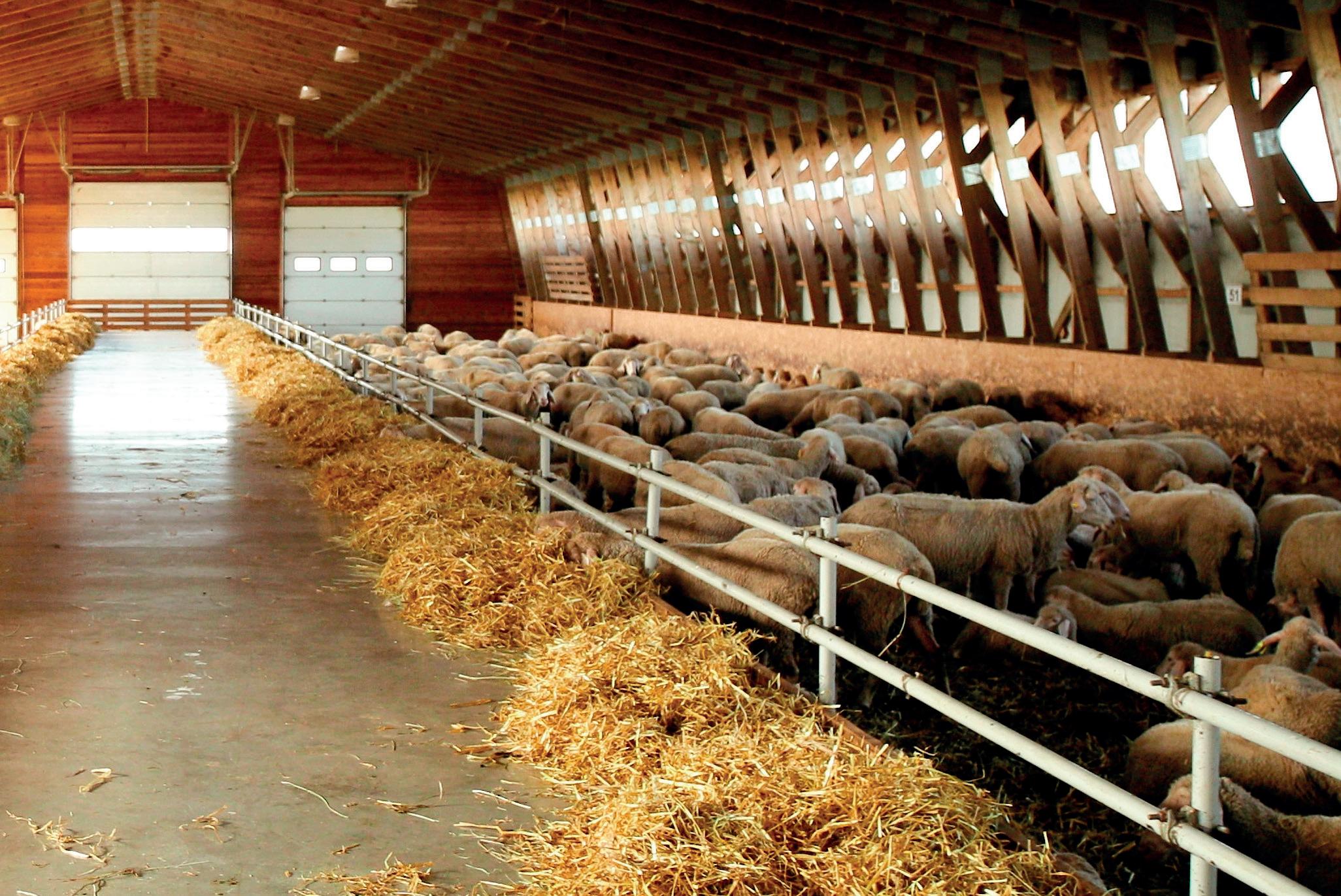
WWW.SOUTHEASTFARMER.NET | JANUARY 2023 45 TO ADVERTISE CALL 01303 233883
FARM CONSTRUCTION
Graham Elgar may not have pursued the farming career he once dreamed of, but his hands-on role as the driving force behind builders G J Elgar Construction has kept him firmly in the environment he loves.


And while Graham likes nothing better than to support the profession with sound advice and quality workmanship, the farming community benefits from practical building knowledge that is rooted in a love of the
industry he works alongside.
KNOWLEDGE AND EXPERIENCE

That knowledge and experience is particularly valuable when assessing the change of use potential of redundant farm buildings to industrial units, or alternative ways of creating another income stream.
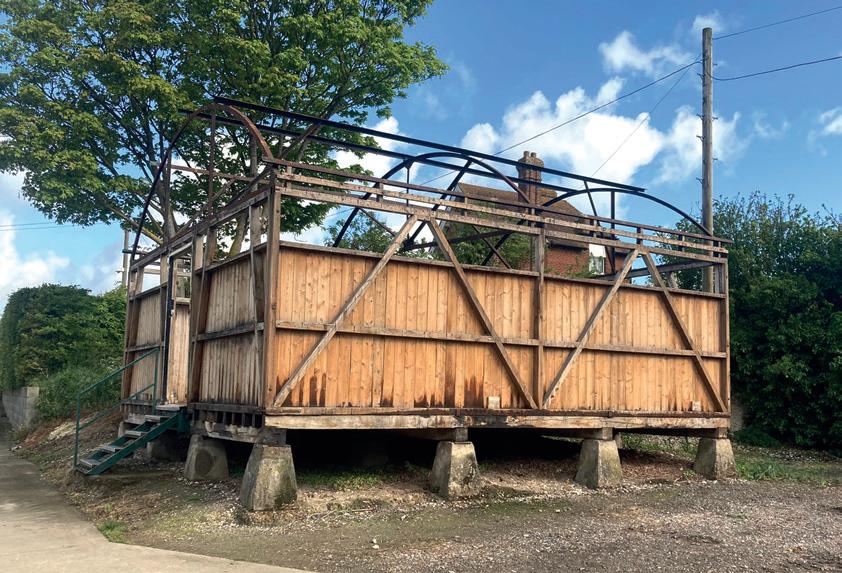
“You need experience to be able to look at a building and know what will work best in that space,” said Graham, who still gets into the office at 5.30 each morning, despite having turned 70. Not that he spends much time in the office, since he would rather be on-farm, chatting to customers and overseeing projects.
Ashford, Kent-based G J Elgar has continued to grow strongly over the years and now employs 38 people, delivering a comprehensive range of building services, from turnkey newbuild projects to conversions, extensions and groundworks.



Graham is particularly proud of the fact that many of the 38 employees have progressed through the company, beginning as a labourer and progressing to run their own teams. “It’s all about the people,” he stressed. “I like to give people the training and the
opportunity to develop their skills, and they often repay that trust by becoming key players in the business.


“G J Elgar has grown through word of mouth, and that’s down to the people who work for the business. You have to employ good people with the right skills – it’s not about me, it’s about them.”
One man who stands out in that regard is Neil Elliott, who joined G J Elgar eight years ago as a sheeter and is now a director of the company, looking after the steel framing and cladding side of the business, supported by Ben Gilbert, who has worked with Graham for 18 years. While some of the team go from labourer to team leader in quick order, Graham is keen to pay tribute to his entire workforce. “They make the company what it is,” he stressed.
The other side of the business, which looks after groundworks, is in the day-to-day control of Graham himself and Ian Jones, while Graham’s daughter-in-law Louse Elgar is the financial director. Wife Cynthia, his childhood sweetheart, looked after the accounts until she retired three years ago. The couple have been married for an impressive 47 years.
JANUARY 2023 | WWW.SOUTHEASTFARMER.NET 46 FARM CONSTRUCTION GRAHAM ELGAR T: 01233 623739 M: 07860 414227 Email: office@gjelgarconstruction.co.uk www.gjelgarconstruction.co.uk G. J. ELGAR CONSTRUCTION Ltd
Before Before After
Graham was brought up on a farm and studied fruit production at Hadlow College before working as assistant manager for Arthur Finn at Provender Farm, Faversham. After a spell contract pruning, he worked as a farm manager for Kent Salads in the Deal and Sandwich areas.
It was while working for Kent Salads that he met Bob Thomas, who later set up Intercrop Ltd at Betteshanger near Deal and has, ever since, regularly asked G J Elgar to support his company with its building projects.
It was around this time that Graham had a couple of opportunities to rent farmland in order to pursue his dream, but it “didn’t work out”. He had, though, begun to take on domestic building projects, with his first job installing a fitted kitchen in 1986.
His big break came in the early 1990s, when a new government directive aimed at cutting water pollution offered generous grants for dairy farms to separate dirty water from clean and tackle issues around slurry.
“I could see there was an opportunity there, with grants starting at 80% but then tailing off over the next couple of years, so I quickly established myself as the man for the job,” he recalled.
The company grew swiftly as Graham and his six-strong team toured Kent, Norfolk, Suffolk and the Isle of Wight installing weeping wall storage for slurry, silage clamps and low-rate irrigation systems. It was tough. “I spent much of eight years in a caravan living away from home,” he recalled.
It was a breakthrough for the business, which has continued to grow strongly over the years and has allowed Graham to continue his love of farming and combine it with the building trade. The company works across Kent, Surrey, Sussex, Essex, and Hampshire on both agricultural and industrial projects, specialising in steel-framed buildings and groundworks.
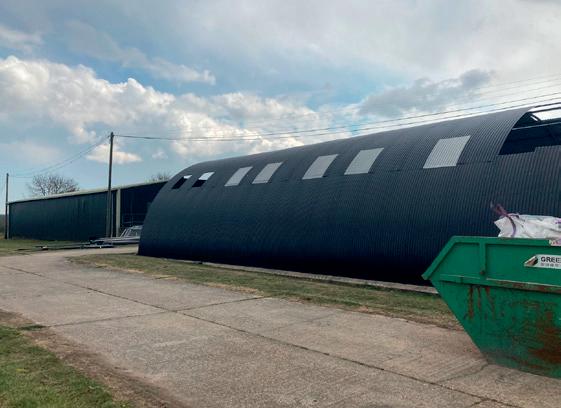

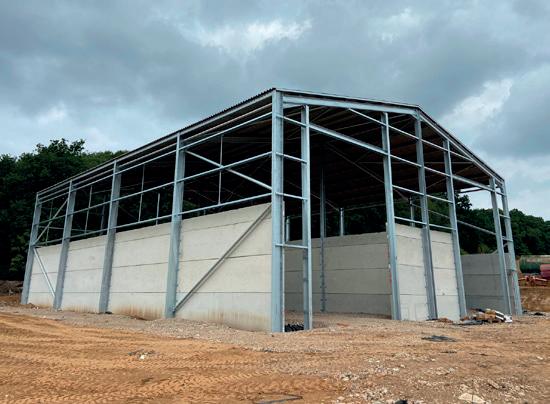

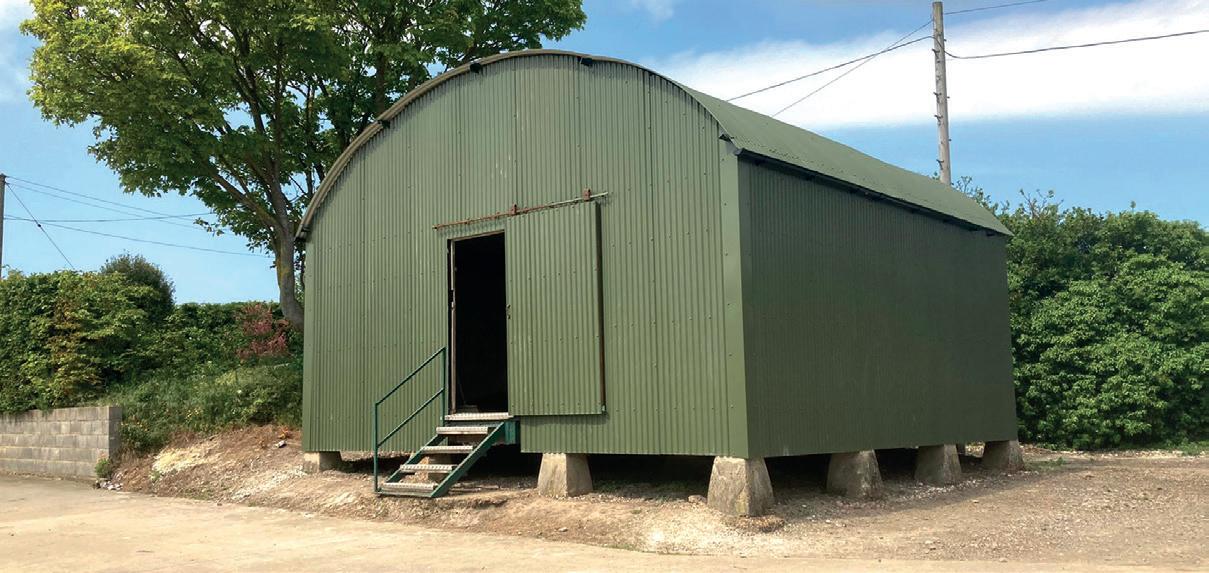
It also offers demolition services, asbestos fibre cement removal and disposal and a health and safety-compliant scaffolding service. “We always include nets and handrails,” Graham pointed out. “We won’t cut corners when it comes to health and safety.”
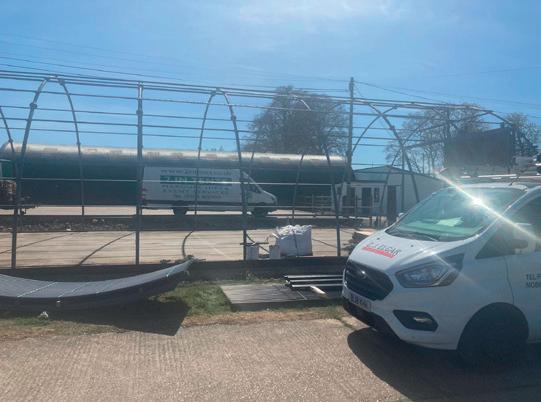
G J Elgar also supplies and installs windows, roller shutter doors and personnel doors, keeping everything in house to avoid delays and sub-contractor issues. The company’s comprehensive service includes planning, structural calculations, contract management and health and safety consultancy.

The skilled workforce – much of it home grown – is supported by modern and regularly upgraded plant, which includes excavators, rollers, dumpers, Genie booms, scissor lifts and high-reach forklifts. “I have always believed in reinvesting in the business, so the machinery is kept up to date and reliable,” Graham commented.
Like most businesses, the challenge at the moment is sourcing the right quality of materials at the right price, but business continues to boom and Graham is looking forward to a busy 2023.
WWW.SOUTHEASTFARMER.NET | JANUARY 2023 47 TO ADVERTISE CALL 01303 233883
After www.gjelgarconstruction.co.uk For more information contact us: t: 01233 623739 m: 07860 414227 e: office@gjelgarconstruction.co.uk • Steel frame buildings • Sheeting and cladding • Guttering and repairs • Groundworks and drainage • Demolition and asbestos removal • Refurbishment and change of use • Concrete frame and steel frame repairs • Insurance and general repairs • Concrete floor and block paving G. J. ELGAR CONSTRUCTION Ltd Before Before After After
TRACK RECORD OF ACHIEVING SUCCESS



Tetlow King’s Kent office welcomed the highly experienced Jonathan Lee to its team in May 2022.
Jonathan brings a wealth of rural and agricultural expertise to the company, having worked in Kent for most of his adult life, starting out as a planning officer in north Kent way back in 1989.
Over the years he has worked for many of the major farms and landowners in the South East, which means he will be no stranger to readers, many of whom will have come across him in the past.

With offices in West Malling and in Bristol, Tetlow King is a leading town planning consultancy which operates nationwide and celebrated its 35th Anniversary in 2020.
“I believe that is testament to our commitment to our clients and our track record of achieving success on their behalf and I am delighted to have joined such a highly skilled and dedicated team,” Jonathan commented.
For advice on planning issues contact: JONATHAN LEE



32 High Street, West Malling, Kent, ME19 6QR
T: 01732 870988
M: 07511 178001
Email: Jonathan.lee@tetlow-king.co.uk www.tetlow-king.co.uk
His planning work to date has included a 1,600 sq m bio-secure cattle building in an Area of Outstanding Natural Beauty, new farm buildings at Sissinghurst for the National Trust and a new dairy building for Otties Dairy in the East Kent Downs. Recently obtained this month is planning permission for agricultural buildings at John Howe Turkeys.


Jonathan has also handled numerous Agricultural Occupancy Condition removals,
listed building removals, conversions of farm buildings to business use and equestrian developments. He is also experienced in advising landowners on future development potential and submitting sites for allocation in a Local Plan.
In his spare time Jonathan enjoys beekeeping, shooting and fly fishing and is a firm believer in promoting and supporting local businesses and buying local.
JANUARY 2023 | WWW.SOUTHEASTFARMER.NET
FARM CONSTRUCTION
48
Jonathan Lee
Illustration: www.pandgarch.co.uk
Recent barn conversion to offices in the AONB


We
All Directors and Planners are Chartered Town Planners and are
by the regulations
We
We are accredited by
recognised benchmark of quality for public sector work. For any advice on planning issues please contact Jonathan at the Kent Office: 32 High Street, West Malling, Kent, ME19 6QR T: 01732 870988 M: 07511 178001 Email: Jonathan.lee@tetlow-king.co.uk ⚪ Strategic Land Promotion ⚪ Planning Policy Advice and Representation ⚪ Planning Appraisals ⚪ Planning Applications ⚪ Planning Appeals/Expert Witness ⚪ Community Engagement ⚪ Advertisements ⚪ Environmental Assessment (SEA) ⚪ Monitoring ⚪ Research/Good Practice ⚪ Housing Needs Assessments ⚪ Education/Training KENT OFFICE: 01732 870988 BRISTOL OFFICE: 01179 561916 www.tetlow-king.co.uk Tetlow King Planning Ltd is a leading town planning and development consultancy operating nationwide
WHAT WE DO?
provide professional advice to a range of clients across the public and private sectors with experience in planning for all types of development. WHAT QUALITY GUARANTEES CAN WE PROVIDE?
bound
of the Royal Town Planning Institute.
are proud to support our graduates in achieving Chartered status.
Constructionline, which is a widely
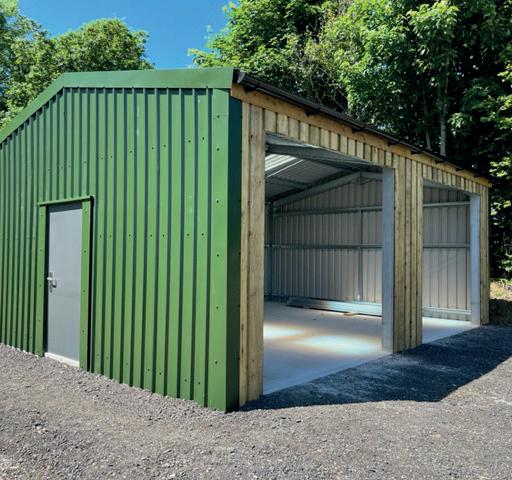

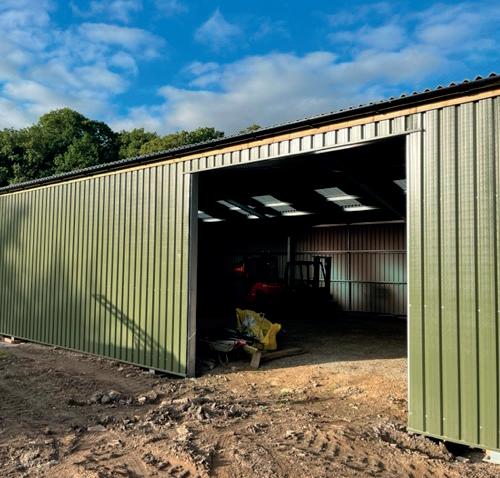
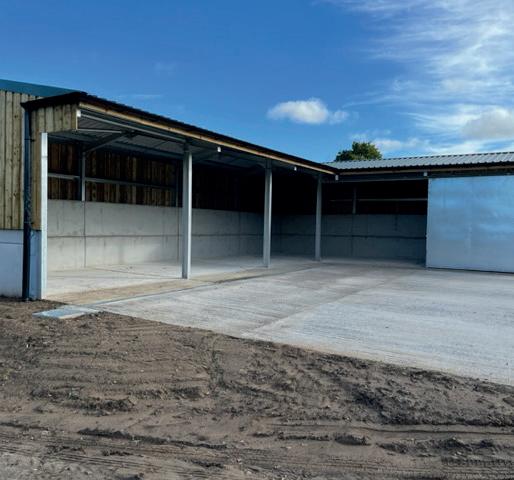

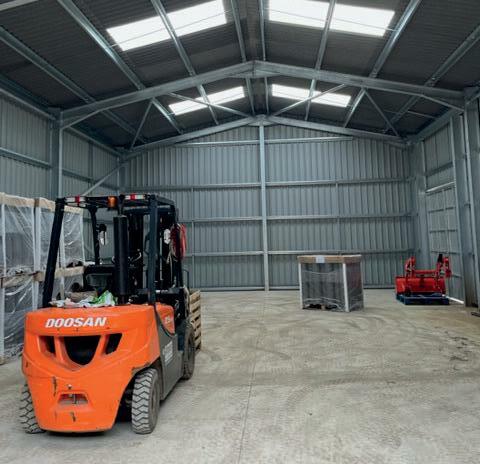

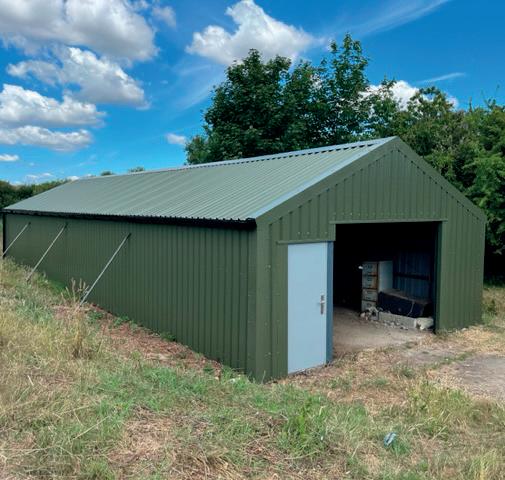

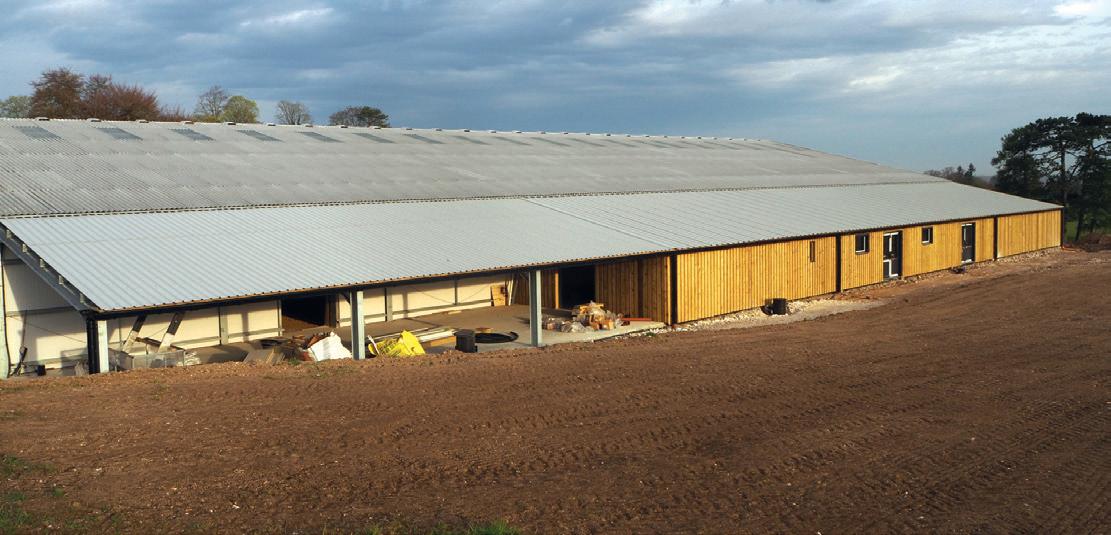
Office 01273 492404 � info@formabuild.co.uk www.formabuild.co.uk Thank you to all our 2022 customers during this challenging year. To everyone, have a safe, happy and prosperous 2023. 100% British designed & built Over 35 Year’s experience Site visits Call to arrange a site survey 7 Working days for quote submission formabuild.co.uk STEEL FRAMED BUILDINGS, RECLADDING, REPAIRS AND GROUNDWORK @formabuild.co.uk @info_forma Forma offer a range of commercial and agricultural services and all our buildings are fully CE marked. Our buildings are galvanised unless another finish is required. Industrial buildings conform to BS EN 1993 and agricultural buildings to BS 5502-22-2013 and fabricated in accordance with EN1090 Execution class 2.
“I’M SORRY, I DON’T SPEAK PLANNER!”
Most people have little experience of the planning system until they’re catapulted into it because they have a project, their neighbour is extending or a housebuilder decides to locate new homes near them. So often these experiences aren’t positive.
The system can feel impenetrable from the start. Documents contain so much jargon that people often feel it’s impossible to understand what’s expected of them. But what does it really mean and how do you know if you’re on the right track? Too often the answer is wait until a decision is made to find out.

I recall talking to someone whose extension in the Green Belt had been refused, having been judged to be “disproportionate” in size. But no-one would tell him what would be proportionate. Experiences like this mean planning is seen as a game of smoke and mirrors, designed to confuse.








This is true of the constant use of impenetrable acronyms too. I’ve been as guilty of using them as anyone, and as penance was once tasked with producing a glossary for councillors to avoid any more exasperated groans from around the room. I found and explained 147.
Even completing the application form can put you off for life. It asks you to answer the same 29 questions whether you want to run a holiday let or build 1000 houses. Forms aren’t tailored to individual projects and if you make one mistake it could take weeks to correct.














So often the assessment is formulaic too. I know one councillor who would utter the same phrase at every committee meeting: “There’s just no place for common sense in planning”. So often it felt like she was right. This is where so much frustration in the system comes from and
it’s even truer for rural projects, where you could be dealing with planners with little or no relevant experience. If you happen to get an officer with some relevant background it helps, but it’s a game of chance.
I once dealt with the conversion of five listed barns to houses, where the simple drawing of a red line on a plan meant that the site area triggered financial contributions, sinking the viability of the project and leaving the owner with a huge liability. That project succeeded through common sense prevailing, by problem-solving, not box-ticking.







When you get to the point of a decision, every council has different rules. If you end up at planning committee, you’re in the hands of councillors who know their patches well but aren’t planners and are often expected to make decisions in highly charged rooms of angry voters.


I once attended a committee meeting debating a polytunnel application that lasted almost six hours. It would have been longer, but the Chairman’s dog was whelping and she was keen to get home. The very last speaker was the applicant. After hours of listening to people object, she had just three minutes to secure the

































future of a business she’d worked so hard to create.
Many people trying to grapple with all this feel that if only they could speak to someone, it would help, but gone are the days where you could turn up at your local office and get some free, friendly advice from a duty planner.
Planning departments are stripped to the bare bones, struggling to meet targets and certainly are not allowed to give any free advice. In these days of remote working you may even be dealing with someone who works in a different part of the country, relying on Google Street View. There’s no doubt they’re working incredibly hard in difficult circumstances but that’s not much of a comfort when you’ve got builders to book, bills to pay and lives to lead.
These issues aren’t likely to resolve themselves any time soon, but there are ways of working with the system. Never assume that those deciding your application will understand what you’re trying to achieve or that they’ll ask you if they don’t. Ask for advice and ask for it early. Remember, there’s almost always a solution to any planning problem; sometimes it just needs someone to think outside the box rather than simply ticking them.
The Rural Planning Practice extends a warm welcome to Emma Keefe, a Chartered Town Planner experienced in all types of rural planning matters. She has worked at a senior level for a Kent local authority and for the Department for Levelling Up, Housing and Communities. She will be a great asset to our highly professional and dedicated team.
WWW.SOUTHEASTFARMER.NET | JANUARY 2023 51 TO ADVERTISE CALL 01303 233883 FARM CONSTRUCTION
office@therpp.co.uk CIRENCESTER 01285 323200 CRANBROOK 01580 201888 www.therpp.co.uk Chartered Town Planners Image courtesy Olson Design Group






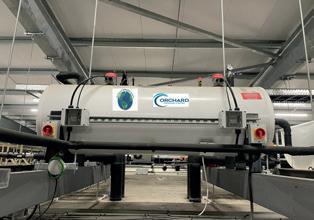












































































































































































































































































































































































































































































































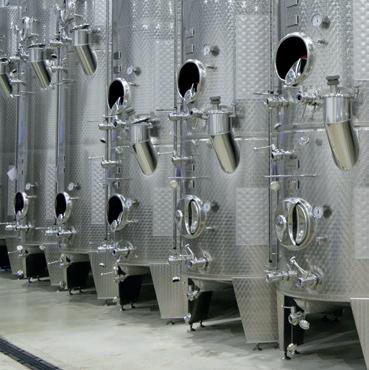




























































JANUARY 2023 | WWW.SOUTHEASTFARMER.NET 52 LANDRAIS E Do you need... › A new building? › To build a noise bund? › To create a hardstanding to store silage or straw? › To build up an area to prevent flooding › To fill in an old lagoon? We may be able to help We can subsidise your costs by building up areas with subsoils classed as non-hazardous inert waste. We can gain all planning permissions needed so give us an opportunity to reduce some or all of your costs on your next project or improvement. East Sussex area preferred. RAISE THE LEVEL OF YOUR LAND Robins of Herstmonceux (Est 1962) 01323 833181 Email: helen@robinsofherstmonceux.co.uk Specialists in controlled atmosphere stores Rapid chilling systems soft fruit and fresh produce Secondary cooling systems with minimal defrosting Energy saving solutions, gas leak detection systems Electrical engineers and contracting Mains power solutions for distribution and installations Testing and certification to NICEIC Service and Maintenance, breakdown cover Refrigeration Service and Maintenance, breakdown cover Temperature controlled wine storage TEL: 01622 861989 www.orchardcooling.co.uk info@orchardcooling.co.uk Rumwood Green Farm, Sutton Road, Langley, Maidstone, Kent ME17 3ND Excellence in Electrotechnical & Engineering Services Dave Reynolds Director Electrical advise on mains and distribution, power network installation 07418 005959 Rob Burbridge Director Electrical installations and testing 07858 195633 Sean Macoy Service Director For all service and maintenance 07872 557934 Paul Kennett F.Inst.R Refrigeration systems For sound advice, full design quotations 07903 462933 Heather Borland Admin Office administration/accounts 01622 861989 FUTURE PROOF COOLING SOLUTIONS “Ecologicool” RefrigerationSystems Expertise where it counts is critical in providing the right cooling system to ensure produce is kept in tip top condition during storage. Orchard Cooling has many years experience in the field: GROW YOUR BUSINESS WITH US. Reach your target audience in 2023 by advertising your products/services in our popular titles. Book now by calling Jamie on 01303 233883 or email jamie.mcgrorty@kelsey.co.uk E S Y m e d a E S Y m e d a K S E m e d a m 2023 Size0.62’–6’3” –1.9m See inside front cover YOU ARE INVITED TO HAYNES NEWBURY OPEN DAY Date: 19th January 2023 Time: 10:30 19:00 Address: Ridgeway Works, Ball Pit Road, East Ilsley, Berkshire RG20 7DJ LAND & PROPERTY CONSULTANTS Expert Site-finding acquisitions Planning Environmental schemes grants Matthew 765323 matthew@c-l-m.co.uk INSIDE Event buzzing with enthusiasm Keeping ahead of the game Sampling English wine The Grange Winery in Hampshire is a place where past, present and future are inextricably linked. JANUARY Past, present and future Vineyard01Jan23.indd estate management Planning & development Subsidies Land sales acquisitions Succession Ecology Natural capital commercial property www.c-l-m.co.uk Farm business consultants with our roots in the South East Full review begins on page 16 NEW YEAR, NEW OPPORTUNITIES FARM CONSTRUCTION Investment in new infrastructure must balance cost and value CATTLE SHOW REVIEWS THE INDUSTRY COMES TOGETHER TO TACKLE ABATTOIR CAPACITY ISSUES VISIT US: www.southeastfarmer.net | www.farmmachinery.co.uk | www.vineyardmagazine.co.uk
As planning consultants, the experts at Batcheller Monkhouse often get asked by clients: “Is seeking pre-application advice before submitting a planning application worth the effort?” The simple answer is, more often than not, yes, it is. However, the value of doing so will vary considerably depending on the context of the project, the nature of pre-application advice offered and the quality of the information submitted.
We have recently seen the direct benefits of discussing a proposal before submitting an application, particularly on rural and semi-rural/edge of settlement sites where the principle of development is, in many cases, in debate.
In one example, extensive pre-application dialogue was entered into with the local authority following a previous, unsuccessful application for a residential conversion/ redevelopment scheme of a redundant care home (see image). The site was in an area of outstanding natural beauty and a green belt location and the existing building was a non-designated heritage asset (a continuing issue worthy of its own column!).


Multiple meetings with the heritage and planning officers were held and many iterations of design discussed. As a result, when a second application was finally submitted, the application received no objection from any statutory consultee, including the conservation team, and the application was resolved without any amendments being needed - an almost complete reversal of the previous position.
It is worth noting that not all suggestions made by the heritage and planning officer were adopted, but it shows that sometimes the value of pre-application engagement is
THE VALUE OF PRE-APPLICATION ADVICE








as much about giving the local authority the opportunity to be involved in the formulation of a scheme as it is about them directing the specific content. In many cases, having a strong steer on the council’s preference will be helpful, and the best way of securing this is through effective dialogue and consultation.
If we want to know whether something is likely to be acceptable in principle without working through detailed issues, we will often make a simple request for written advice as a low-cost means of securing an ‘in-principle’ view from a local authority. On the other hand, if there are more detailed issues of concern then we may advise that more detailed submissions are made to be discussed in person at a meeting. The choice, of course, must be tailored to the needs of the individual and their project, but there is almost always value in engaging at an early stage.
The quality of submissions made to the council has a direct impact on the value of the process. In loose terms, the more information you can provide and the better prepared you
are in presenting your proposal to the council, the better the quality of advice you can expect to receive.
At a time where local authority planning departments are but one of the many areas of local government feeling the pressures of under resourcing and lack of funding, the level of pre-application service that is provided can be varied. In some cases, the council may not offer the service at all, but where it is available it is worth considering as a means of steering your scheme in the right direction and heading off any issues and concerns from the outset. To discuss your project please contact Christine Dadswell.
WWW.SOUTHEASTFARMER.NET | JANUARY 2023 53 TO ADVERTISE CALL 01303 233883 FARM CONSTRUCTION
CHRISTINE DADSWELL Batcheller Monkhouse T: 01892 509280 E: c.dadswell@batchellermonkhouse.com www.batchellermonkhouse.com
Yard with consent for conversion
Fomer care home with consent to convert
PROVIDING CLIENTS WITH THE BEST PLANNING ADVICE
At Hobbs Parker, we do lots of things for our clients. You will be familiar with many of our services and hopefully will have used them with satisfaction. But did you know we also undertake planning consultancy work?

Upstairs at the market where our property consultants team is housed, alongside our surveyors, we also keep our planners. We currently have two chartered town planners, but it is not just the urban jungle in which they are at home. With their knowledge of the Town and Country Planning Act, it is not unsurprising that they are equally at ease roaming the countryside too.
You may ask why you need to know this. Well, so much these days revolves around planning, including every form of development; what you do on your land, what you use your buildings for or what you fancy constructing is controlled by the planning system.
I bet you have at some point asked yourself: “How did that get planning permission?” Well, we have the people who can advise you and know the system, having worked on either side of the fence, at one point for the council and now potentially for you.
So, what do our planners do and for whom? Well, quite a lot and for a whole
range of clients. 2022 has been another busy year for our planning team, working tirelessly to provide clients with the best planning advice and prepare and submit their development proposals.
We have made more than 60 applications, with a success rate of over 80%. It can take time for the decisions to come through from the council, but so far this year we have received 36 approvals, as well as securing allocations for residential and commercial development in Local Plans across Kent and East Sussex.
The types of permissions we have obtained are wide ranging. In the countryside we have obtained planning permission for barn conversions, new farm buildings and residential and commercial uses via prior notification, leisure uses, including camping and glamping sites, removal of agricultural occupancy conditions and a ‘Paragraph 80’ dwelling recently approved by Ashford Borough Council. We have also achieved permission for a swimming pool and outbuildings in the grounds of a Grade II Listed house.
Away from the countryside we are equally involved, working to obtain planning permission for many houses, from detailed planning permission for single plots to outline planning permission for large sites
STEVE DAVIES Associate Director

E: steve.davies@hobbsparker.co.uk
T:
for 100 houses or more.
We are also busy in the world of commercial development, with proposals for new business premises for shops, offices and factory units, extensions to business parks and solar PV schemes. With our local knowledge, we are well placed to advise on how to bring forward development proposals within the Stour catchment, where applications continue to be delayed by the ongoing nutrient neutrality situation.
If you have got yourself into difficulty by doing something that you should perhaps not have done, we can advise you on what to do next and whether or not it is possible to regularise your transgression with a lawful development certificate.
As for our clients, you will find some surprisingly well-known names amongst them; we are always pleased to highlight our successes, but we like to approach things discreetly.
Now you realise what we do and the services we can offer, hopefully you want to meet our planners, Steve Davies and Elizabeth Welch. Our website includes some case studies highlighting their work. They have the right experience to help obtain planning permission for you. If you're thinking about your next project in 2023 then please do not hesitate to get in touch.
ELIZABETH WELCH Associate Director
E: elizabeth.welch@hobbsparker.co.uk

JANUARY 2023 | WWW.SOUTHEASTFARMER.NET 54
01233 506201 www.hobbsparker.co.uk
FARM CONSTRUCTION
DON’T MISS OUT ON R&D TAX CREDITS
A specialist in helping firms benefit from research and development (R&D) tax breaks has highlighted the low uptake of the tax credits available, pointing out that just 2% of agricultural businesses currently access the scheme.
Speaking after one of his clients received almost £200,000 through the Government’s HMRC Tax Incentive, Mark Joyner, director of Research and Development Specialist Ltd (RDS) commented: “Agriculture and farming is an area where there are so many more companies that could be benefitting from R&D.
“The sector needs innovation to survive, especially given the constantly changing rules



and regulations enforced within the industry, so if you work in this arena and you’re not sure if you qualify for R&D, it’s highly likely that you will. The fact that more companies aren’t engaged with the R&D tax incentive simply boils down to awareness.”
The client company, which designs and constructs poultry buildings, qualified as a result of its continuous research and development in designing buildings and components for the construction of poultry housing. It didn’t initially realise that continuing to improve the product counted as “R&D” and was therefore eligible for tax relief through the HMRC Tax Incentive.
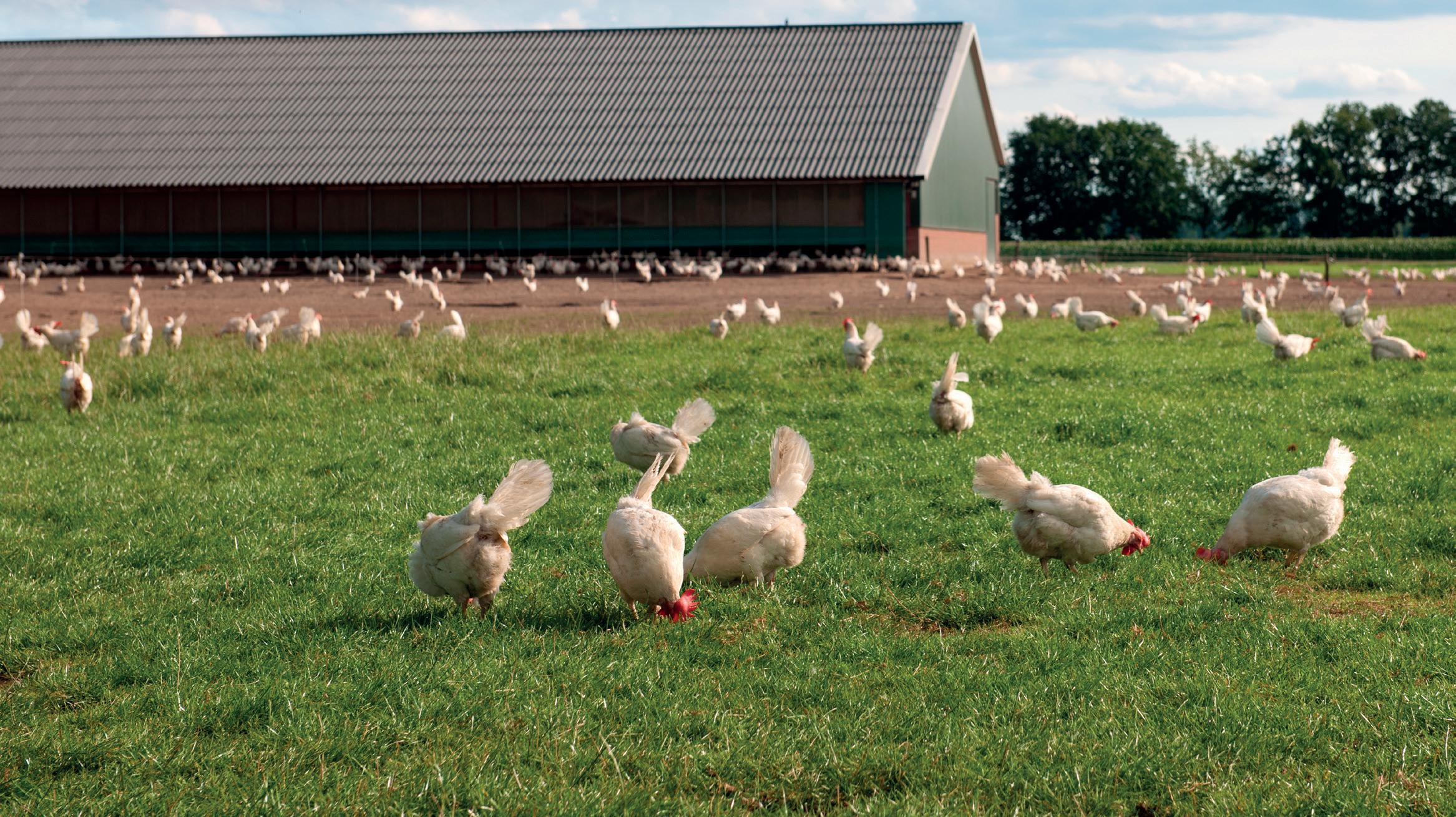
RDS supported the company’s application and was also able to use its expertise to advise on costs that could be included, increasing the amount of the final claim.
Mark Joyner said he wanted to “spread the word throughout each region that there is a legitimate, government-backed scheme that can be accessed to inject thousands back into businesses.
“It’s particularly relevant right now given that many are really struggling against the current economic backdrop – things are always tough as a business owner but accessing this scheme can go a long way towards successfully navigating these unprecedented times.”
WWW.SOUTHEASTFARMER.NET | JANUARY 2023 55 TO ADVERTISE CALL 01303 233883 FARM CONSTRUCTION
Photo: Shutterstock.com
Legal services for farmers & rural businesses
Call us today or visit our website: 01227 763939 furleypage.co.uk
ILLEGAL RODENTICIDE USE COULD THREATEN FUTURE AVAILABILITY
Access to a powerful rodenticide could be restricted unless the number of incidents affecting wildlife, some of them illegal, are halted, farmers have been warned.
The warning has come from the Chairman of the Campaign for Responsible Rodenticide Use UK (CRRU), Dr Alan Buckle, following a sudden and marked increase in the numbers of wildlife incidents involving the rodenticide brodifacoum.
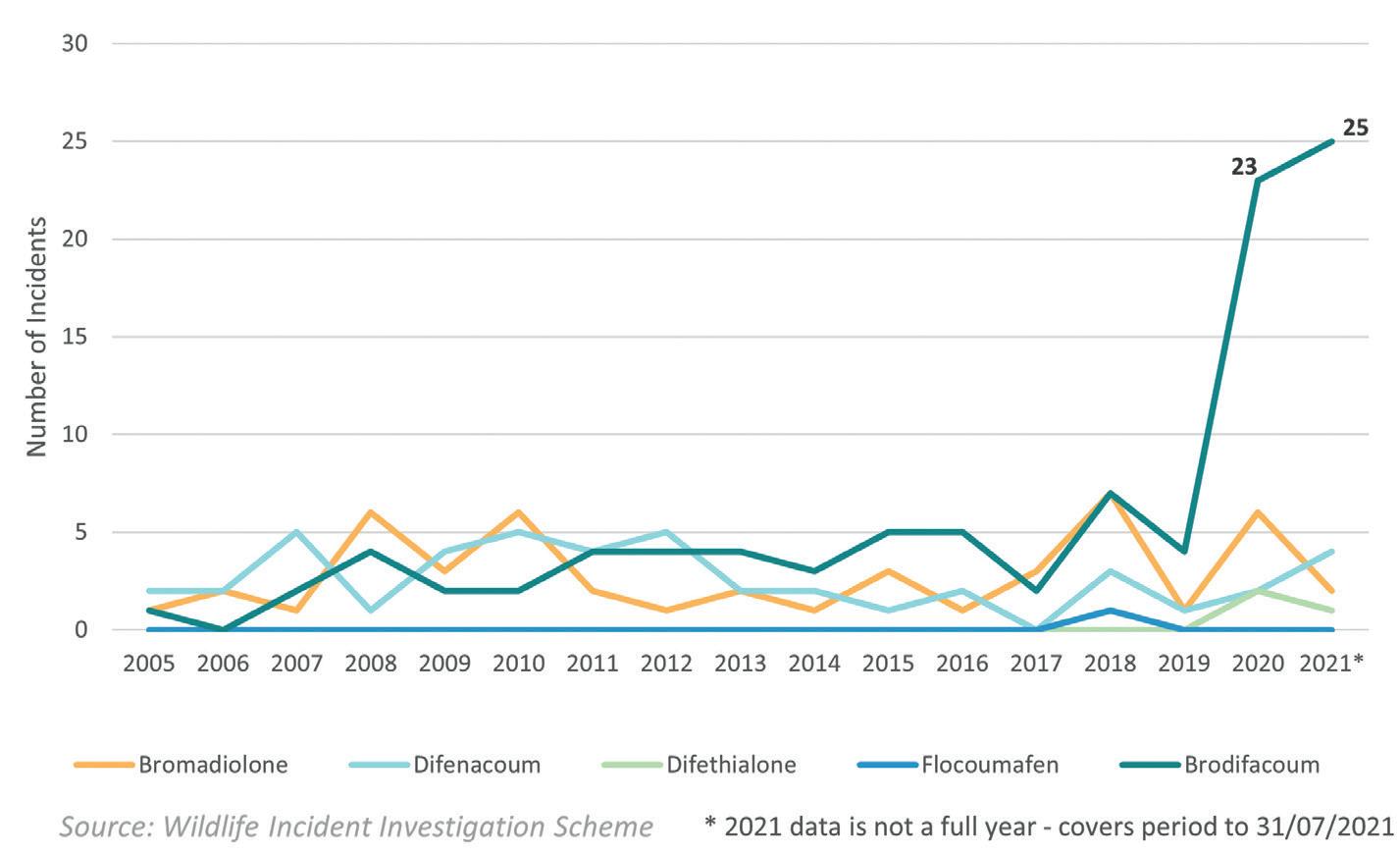
The organisation has pointed out that some of the incidents identified by the government-run Wildlife Incident Investigation Scheme (WIIS) have involved either negligent misuse or deliberate attempts to harm wildlife.
Pointing out that continued misuse and abuse of rodenticides risked more restrictive regulation, Dr Buckle said it “could mean some user groups no longer have access to these products, or that some use scenarios are no longer allowed, possibly both”.

He went on: “The recent high-profile death of a rare bird of prey, for example, was the result of one such incident, and WIIS has evidence of many more involving other raptor species.”
On all rodenticide product labels, manufacturers have to include specific instructions required by the government regulator, the Health and Safety Executive (HSE). Failing to follow these instructions, whether that is deliberate or unintended, is illegal and risks users being prosecuted.
To address wildlife poisonings and help rodenticide users avoid prosecution, CRRU is issuing clarification of what is allowed under what is says are three “commonly misunderstood or ignored label phrases”.
Dr Buckle explained that the label phrases applied to products “used outdoors, either around buildings or in open countryside, and in rodent burrows”. The phrases, and their meanings, are:
OUTDOORS – AROUND BUILDINGS
‘Outdoors – around buildings’ allows bait to be deployed ONLY to treat an infestation of a building. The ‘outdoors’ part means that baits can be put down outside the building to control an infestation within, provided all label instructions about protection of bait placements are followed.
With a similar meaning, ‘In and around buildings’ is also used on some labels. This phrase also allows use outdoors to control an infestation of a building and also permits bait application within the building.
OPEN AREAS
‘Open areas’ allows treatment for an infestation of rats, but never mice, that is NOT DEMONSTRABLY associated with a building. Among anticoagulant products, ONLY those containing difenacoum and bromadiolone are authorised for use in ‘open areas’. Products containing brodifacoum, difethialone and flocoumafen must never be used in ‘open areas’ away from buildings. It is an offence to do this and may lead to prosecution. This is to
protect wildlife from these more potent substances.
BURROW BAITING
‘Burrow baiting’ is permitted on some product labels and means that baits can be applied directly into rodent burrows, generally outdoors. This is ONLY allowed away from buildings IF the product label says that BOTH burrow baiting AND ‘open areas’ use are allowed.
Dr Buckle added: “These critical instructions apply to all users of rodenticide products that carry these phrases. Continued misuse and abuse of rodenticide products risks more restrictive regulation.”
To help rodenticide users avoid prosecution for illegal use, even if unintended, and protect the future availability of second-generation anticoagulants, CRRU is also preparing a factsheet to distribute as widely as possible over at least the next six months. Its core message will be that farmers should always read labels carefully before using rodenticide products and follow all applicable label requirements.
JANUARY 2023 | WWW.SOUTHEASTFARMER.NET 56
RIGHT TO WORK CHECKS
In 2020, an estimated 90% of the 75,000 seasonal workers in edible horticulture in the UK were EU migrants. There remains a high dependency on seasonal migrant workers within the agricultural industry, which means it is important to carry out right to work checks correctly and to be aware of recent legal changes.
During the pandemic, the Home Office made temporary changes to the right to work checks from March 2020. These changes relaxed the rules to allow checks to be carried out over video calls. Additionally, job applicants and existing workers were able to send scanned copies or photos of documents, rather than sending physical copies of originals.
If the employee was unable to provide any accepted documents, the employer could use the Home Office Employer Checking Service as an alternative.
CHANGES TO RIGHT TO WORK CHECKS
Recent changes to the right to work checks came into effect from 1 October 2022.
Agricultural employers should be aware that there are three methods of checking that can be undertaken; online checks via the government website, manual checks and using an identity service provider (IDSP).
Employers should note:
• The online method should only be used for specific types of documentation, including biometric residence permits (BRPs), biometric residence cards (BRCs), frontier worker permits and e-visas
• For other forms of identification, a manual check should be undertaken to check, copy and verify original documentation.
This method is only available for British and Irish nationals, and others will have to continue using the Home Office Employer Checking Service
• Alternatively, an employer may wish to appoint an IDSP to check the documentation on their behalf, using identification document verification technology (IDVT).
WHAT SHOULD EMPLOYERS CONSIDER?
Agricultural employers should think carefully about how they implement controls to ensure they comply with the law when hiring seasonal workers. It is a criminal offence for an employer to employ an individual who it knows or has “reasonable cause to believe” does not have appropriate immigration status. It may also attract a £20,000 fine for each individual employed who does not have the right to work in the UK.
Employers should consider their staff turnover rate and how many of their employees and workers currently hold immigration documentation. This will inform a decision as to whether they feel they need to appoint an IDSP.

If an agricultural employer decides not to use an IDSP, it is strongly advised that guidance is created for those carrying out the right to work checks to ensure they are conducted correctly.
SEASONAL WORKER HOLIDAY ENTITLEMENT
Following a case in July 2022, part-year workers must now have their holiday pay calculated in the same way as colleagues who work the full year, and must not be pro-rated. This may impact seasonal workers within the agricultural sector if they have permanent employment contracts that require them to work only certain periods of the year, such as fruit pickers. It will require employers to give these employees at least 5.6 weeks of holiday every year and will apply even if the worker only works a few weeks each year.
HOW MUCH HOLIDAY AND HOLIDAY PAY ARE SEASONAL EMPLOYEES ENTITLED TO?
The calculation will depend on how many days that employee worked each week. Seasonal workers who work for a specified number of hours per week are entitled to 5.6 weeks’ leave based on those hours worked.
Pay for the entitled holiday will be calculated using the average of the previous 52 weeks’ pay. Any full weeks in which no pay was earned should be disregarded for the purposes of this calculation.
This is only a selection of the issues of which rural employers need to be aware. To carry out a more in-depth health check on your business, ensure compliance and support ongoing growth and sustainability, seek advice from your legal advisor.
WWW.SOUTHEASTFARMER.NET | JANUARY 2023 57 TO ADVERTISE CALL 01303 233883 LEGAL ABIGAIL BRIGHTWELL Associate, Brachers LLP T: 01622 655281 E: abigailbrightwell@brachers.co.uk www.brachers.co.uk
AGRICULTURAL EMPLOYMENT LAW ROUND-UP
Maidstone | Canterbury www.brachers.co.uk Proud
Chambers
Partners
Legal 500 A “knowledgeable and responsive” team of “excellent solicitors who know their specialisms inside out”
October 2022 changes.
to be recognised for our agricultural expertise in leading directories,
and
and The
PLANNING UPDATE


The future of planning
Ben Young, a Planning Associate at Bloomfields identifies what some of these changes are likely to entail:


■ The retention of a method for calculating local housing need figures, which will be an advisory starting point, not mandatory.
■ Local authorities will be able to determine how many homes can be built, considering what should be protected in each area (such as Green Belt, national parks, the character of an area, or heritage assets).

■ Instructions to the Planning Inspectorate that they should no longer override sensible local decision making so as to give communities a greater say in what is built in their area.
■ Local authorities will no longer be required to maintain a rolling fiveyear supply of land for housing where their plans are “up-to-date”, or at a well-advanced stage in producing a new plan.
■ Community protections afforded by a neighbourhood plan against developer appeals will be increased and the power of local and neighbourhood plans will be enhanced.
■ Planning fees are likely to be increased, including doubling fees
www.bloomfieldsltd.co.uk
for retrospective applications where breaches of planning have occurred.
■ Measures will be introduced to ensure developers build out developments that already have planning permission and local authorities could refuse applications from developers who have built slowly in the past with potential financial penalties also being considered for slow build out rates.
■ Local authorities may be given powers to potentially stop developers getting permission where they have previously persistently ignored planning rules and failed to deliver legal commitments to the community.
■ Existing brownfield first policy will be reinforced through potentially applying lower Infrastructure Levy rates and different affordable housing requirements for brownfield sites, than greenfield.
■ Further protection will also be given to important agricultural land for food production.

In the midst of a recognised national housing crisis, these changes have the potential to significantly affect where new development can be brought forward. Good relationships with planning officers and mangers, policy

teams, Councillors and of course local communities will be more important than ever as the balance of power shifts back to local decision makers. An in-depth knowledge of permitted development rights will also be important. Instinctively this may make readers feel that if you can’t achieve something locally then it’s a lost cause; but we perceive the emphasis now is knowing when to appeal or not, and if you decide to appeal you can’t do it half-cocked. Previously developed land will of course give readers greater leverage.
With further detail to come in the shape of a National Planning Policy Framework (NPPF) prospectus, which by the time you have read this will have likely been published, it is imperative that those wanting to progress projects know they have the right team of advisers round them. We are able to provide further assistance and guidance to help you through the changes and advise on any areas of opportunity. Do get in contact for a no obligation discussion on how we can help.
■ BEN YOUNG Bsc (Hons) MA

ASSOCIATE
Email. ben.young@ bloomfieldsltd.co.uk Tel. 01303 814 444
EMAIL
KENT OFFICES: Paddock
831 600 Hythe 01303 814 444 SUSSEX OFFICE:
01435 873 999
info@bloomfieldsltd.co.uk
Wood 01892
Wadhurst
It was perhaps unsurprising that the third Prime Minister of the year and his newly (re)appointed Secretary of State for the Department of Levelling Up, Housing and Communities (DLUHC), Michael Gove, would be proposing further changes to the planning system, and on the 6th December 2022 a Ministerial Statement was published.
IN ASSOCIATION WITH
SEVEN TRENDS TO WATCH IN 2023
The economic downturn, the shifting sands of agricultural policy, climate change, the biodiversity crisis and soaring input prices are likely to be critical influences within the rural sector in 2023, according to land and property specialists Strutt & Parker.

1. HIGHER WORKING CAPITAL REQUIREMENTS
Higher working capital requirements for harvest 2023 will put a squeeze on profitability and have a big impact on cashflow. Harvest 2022 is likely to have been a profitable year for those arable growers who purchased the bulk of their inputs before the massive increases in input costs and benefited from the significant increases in grain prices, but the input costs for harvest 2023 will be significantly higher.
Navigate the financial challenges of the year ahead by assessing if you are likely to have sufficient working capital over the coming months, and to see where the dips in your cashflow potentially may be.

2. MITIGATING THE ENERGY CRISIS
The energy crisis is opening up significant opportunities for landowners in the delivery of both large and small scale renewable energy schemes. Developers of large-scale solar projects are prepared to pay rents of around £1,000/acre (index linked) along with a percentage of turnover. Battery storage site rents are typically between £2,000/MW and £2,500/MW. Roof-mounted solar PV schemes are back in the spotlight as a way for farmers and landowners to cut their electricity bills by reducing the amount of energy they buy in.
An energy review is useful to analyse your consumption profile and investigate which renewable energy technology is most appropriate. Farmers who already have a solar array, but do not have an export meter fitted, should consider getting one installed, as there are now some excellent rates being paid for exported electricity.
3. NATURE RECOVERY

It’s not just about carbon when it comes to responsible environmental management. The issue of biodiversity loss is one that is likely to become increasingly high profile in the wake of the UN Biodiversity Conference (Cop 15). As we move forward, active habitat management will become more important. A big challenge that needs to be overcome is securing appropriate finance to enable this to happen, although there is strong research evidence that shows that, due to the positive effect on crop production from wildlife habitats, farm profits can increase even if the area cropped is reduced.
4. RISE IN BAD DEBT
Official government figures show rising levels of business insolvencies, so it has never been more important to know your customers and manage the risk of bad debts closely. Monitor any

changes in business practices which might signal buyers are suffering cashflow problems. State terms of business clearly on invoices and set up reminders so you know when you need to start chasing for payment.
5. LET PROPERTY MANAGEMENT CHALLENGES
Everyone is feeling the effects of the cost-of-living crisis, but anyone with a property portfolio will also need to be particularly mindful about its impact on tenants. It is likely there will be commercial and residential tenants who may find themselves struggling to meet their rent. Keeping the lines of communication open is vital.
Landlords are also facing the prospect of major legislative changes associated with improving energy efficiency and ensuring a fairer deal for tenants. Raising EPC ratings in traditional buildings is a complex area and with significant cost implications for rural landlords so it is important to get expert, independent advice.
6. SEEK OUT GRANTS



It makes sense to take advantage of grant support to future-proof your business where it is available. For example, we know that tighter environmental legislation is likely and grants of up to £250,000 are currently available for farmers in England to replace, build or expand existing slurry stores so they have six months’ storage capacity. Farmers have until 31 January to enter their details into an online checker to see if they will be eligible for the scheme.
7. EXPECT GREATER VOLATILITY
The effects of climate change are becoming more obvious to us every day – we’ve had heatwaves, and flooding and the disease risks seem to be increasing for the arable, livestock and forestry sectors. The forestry sector is seeing Ips typographus (a beetle) and oak processionary moth spread in the South East of England. Eradicating these pests and diseases is impossible, but containment is possible, so woodland owners need to actively monitor their woodlands and plan ahead.
59 SECTION TO ADVERTISE CALL 01303 233883
WWW.SOUTHEASTFARMER.NET | JANUARY 2023
LAND AND FARMS SPONSORED BY BATCHELLER MONKHOUSE
South East
Market
WANTED RENTED PROPERTIES! TEL: 01536 524808 EMAIL: info@daviesandco.co.uk www.daviesandco.co.uk Do you own a rented property that you wish to sell? We wish to buy them for a substantial retained investment client – with cash funds available All enquiries treated in the strictest confidence –No fees charged to the seller DAVIES CO.
The
Farmland
Experts
COMPETITION TO BUY


Watsons’ spring got off to a busy start with the launch of Whippletree Farm, Carters Corner, near Hailsham. This 82-acre farm, with its well presented and deceptively spacious three bedroom Agricultural Occupancy Condition (AOC) bungalow, large, new steel-framed barn, traditional Dutch Barn and 82 acres of pasture with some woodland and ponds received a tremendous response to advertisements placed online, in farming journals and from the many hopeful buyers registered on Watsons’ mailing list.
If the normal rule of thumb is that AOC properties attract fewer buyers, the interest generated by Watsons for this property made that hard to believe. A number of very good offers were received and, as a result, an excellent result was achieved.
The rest of the spring saw more land coming to the market which, through successful marketing campaigns, attracted large amounts of interest and thus competition to buy. Sales instructions, as so often seen by Watsons, included a diverse selection of land types. This included marshland grazing close to the hamlet of Wartling and another, larger parcel of the same in the popular area of Normans Bay.
Other pieces of land that attracted a particularly large amount of interest were 41 acres of mixed woodland and pasture at Hurst Green on the Sussex/Kent borders, just over 13 acres of pasture in an elevated position between Ticehurst and Stonegate with superb views, and five acres close to Mayfield with
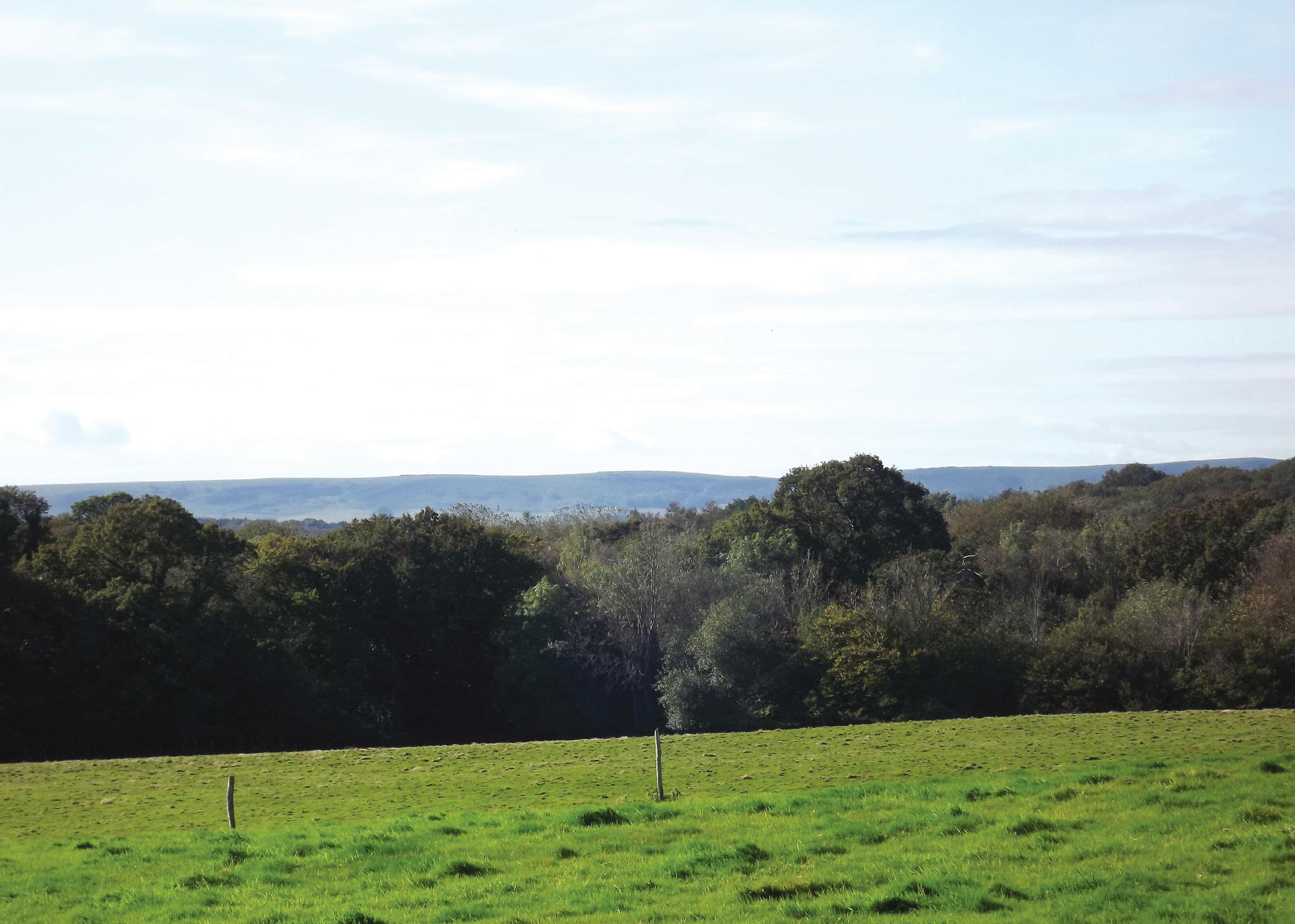
similarly good views. This small parcel of amenity land not only offered a mixture of wood and pasture but had direct access onto a network of bridleways extending out to the far side of Mayfield, passing through large areas of woodland and open areas of picturesque Sussex countryside.
A more unusual offering was a builder’s storage yard near Heathfield, set within an area of ancient woodland, which has been in the same ownership for over 35 years. As expected, an extensive marketing campaign generated a huge amount of interest from equally large diverse types of potential purchasers.
Undoubtedly, there are more people wishing to buy land with private conservation projects in mind, but unlike the growing interest in land for rewilding, which will not feed the nation, there are buyers from this group that ask Watsons to arrange grazing licences, meaning agriculture can continue alongside flora and fauna preservation, thus not taking the land out of production totally.
As usual, the school summer holiday proved quiet, especially with so many people choosing to go abroad again after two years of Covid-19 restrictions and three years since the last freemovement summer season. Despite this, in July Watsons’ launch of one of the prettiest farms seen for sale in East Sussex for quite some time and a well-orchestrated local, national and online advertising campaign saw Spring Farm near Mayfield attract a lot of attention.
The farm, with its charming, six-bedroom Grade II listed farmhouse, agricultural and
equestrian buildings, 42 acres of principally grassland and wonderful setting, had the rural appeal that so many people seek. Numerous viewings from interested parties inevitably led to a buyer being found.
In October Watsons was instructed to market High House Farm between Ninfield and Bexhill. This small, former dairy farm comprised a three-bedroom detached house in need of refurbishment and subject to an AOC, cowshed with milking stalls, storage room and dairy, covered livestock yard and a concrete-framed hay barn. In total the property extended to about 40 acres and was predominantly pasture land with a small wood on the eastern boundary.
Despite the poor condition of the house and the fact that the farm did not have registered title, it attracted a huge amount of enthusiastic potential purchasers, which yet again concluded in an excellent result being achieved.
The uncertainty in the property market towards the end of the year, following the disastrous ‘mini-budget’, may have left people wondering what 2023 will bring, but Watsons has found over the years that demand for land seems to remain reasonably constant and correctly priced farms, rural and equestrian properties will find buyers due to their limited supply and availability.
For Watsons, sales this coming spring will include the launch of a 70-acre grassland farm in East Sussex with a good sized farmhouse and a range of well-kept agricultural buildings.
JANUARY 2023 | WWW.SOUTHEASTFARMER.NET
LAND AND FARMS
60
Whippletree Farm
A valuable block of farmland in a very accessible location on the outskirts of Lindfield and Haywards Heath with good road frontage and access is on the market with Batcheller Monkhouse.
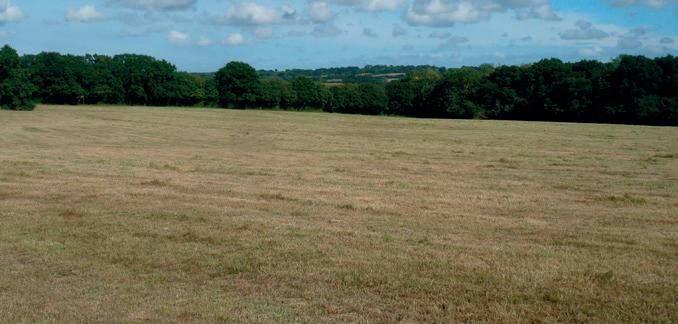
In all approximately 36 acres for sale in two Lots. Lot 1 is approximately 11.4 acres and Lot 2 is approximately 24.3 acres.
The land at East Mascalls Lane is conveniently located just past Great Walstead School on the outskirts of Lindfield and Haywards Heath. The area is well served with easy transport links and there is a wide variety of countryside within easy reach, including by vehicle, for riding on the Ashdown Forest and the South Downs.
Lot 1 comprises a level block of pasture with private access off East Mascalls Lane with a stream running along the northern edge. The land extends in all to approximately 11.4 acres.

Lot 2 adjoins Lot 1 and comprises a gently sloping block of pasture with two private access points off East Mascalls Lane. The land extends in all to approximately 24.3 acres.
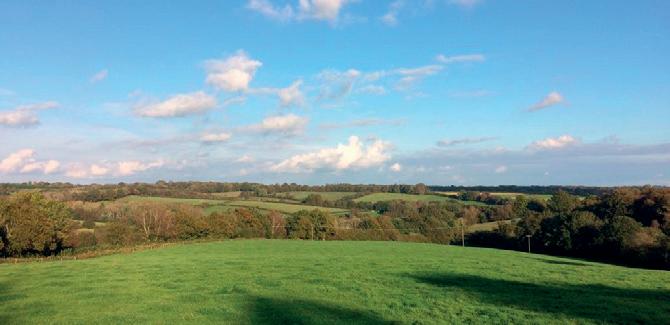
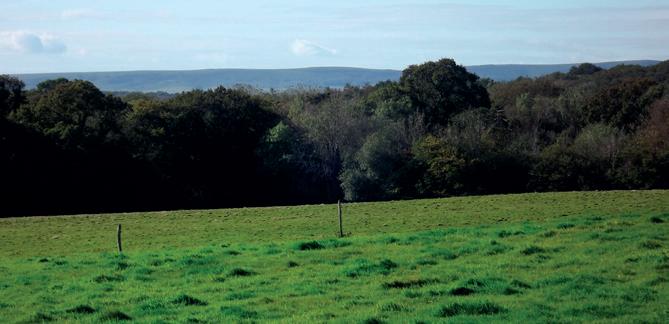
The site is offered for sale freehold with vacant possession on completion.
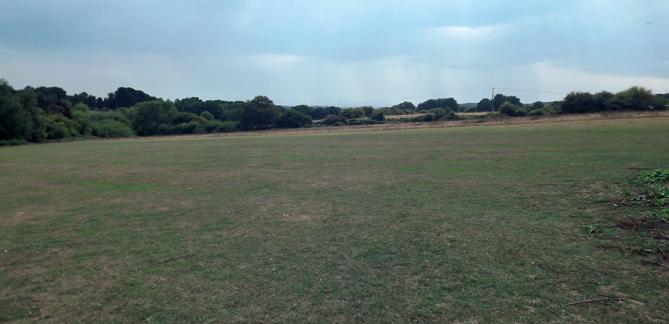
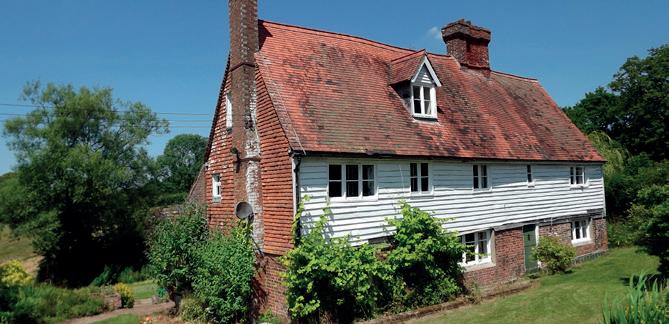
WWW.SOUTHEASTFARMER.NET | JANUARY 2023 61 TO ADVERTISE CALL 01303 233883 LAND AND FARMS VALUABLE BLOCK OF FARMLAND GUIDE PRICE: £510,00 FOR THE WHOLE – LOT 1 £165,000 / LOT 2 £345,000 36 ACRES HAYWARDS HEATH | WEST SUSSEX Full details are available at www.batchellermonkhouse.com i
Tel: 01435 865077 The Estate Office - Burwash Road, Heathfield, East Sussex TN21 8RA www.watsonsestates.co.uk WATSONS EST. 1873 COUNTRY PROPERTY AGENTS AUCTIONEERS CHARTERED SURVEYORS VALUERS CLEAR AND RELEVANT PROFESSIONAL ADVICE WHEN YOU NEED IT THINKING OF SELLING - CONTACT US NOW FOR A FREE MARKET APPRAISAL 82 ACRE FARM SOLD HAILSHAM 13 ACRES SOLD STONEGATE 22 ACRES SOLD ROBERTSBRIDGE EAST SUSSEX 42 ACRE FARM SOLD MAYFIELD 40 ACRE FARM SOLD NINFIELD AVAILABLE SPRING 2023 70 ACRE GRASSLAND FARM FARMHOUSE GOOD FARM BUILDINGS



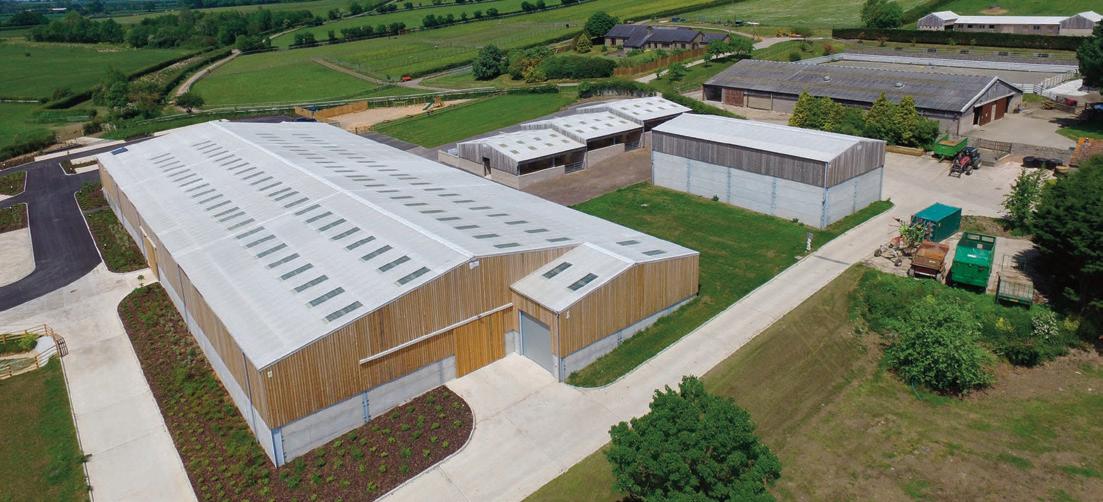
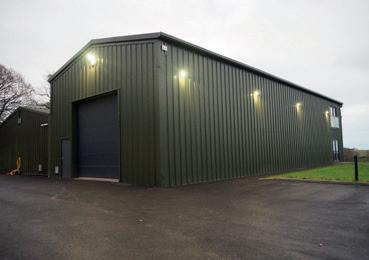
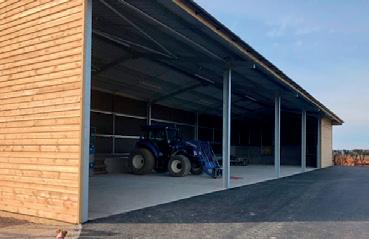
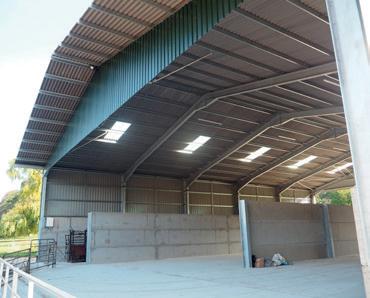
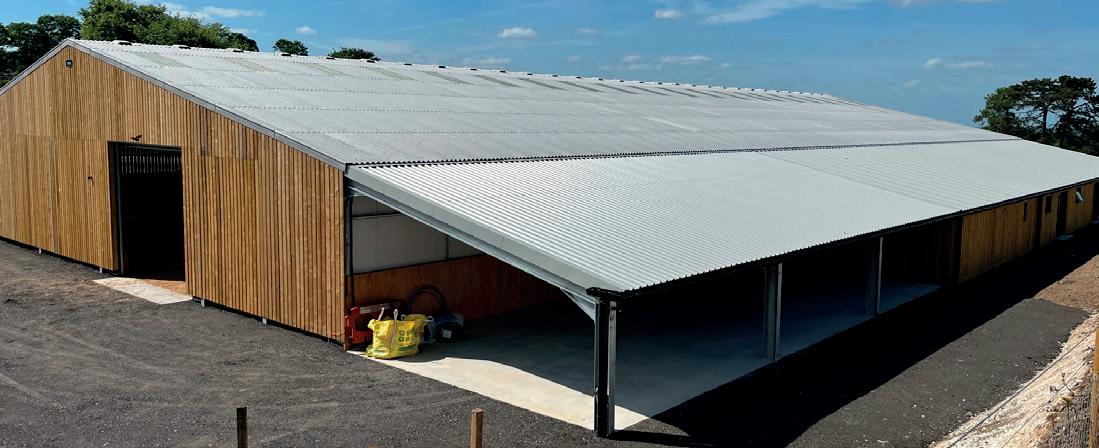

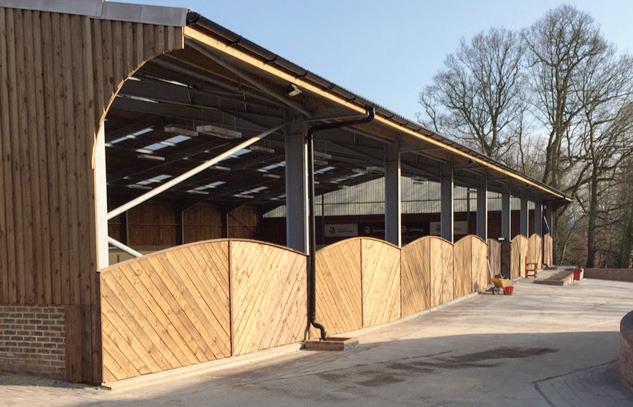

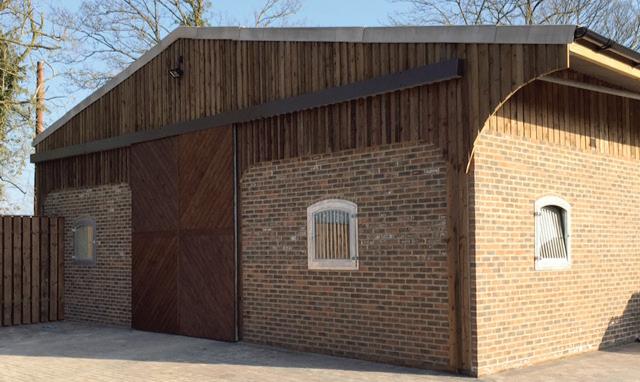







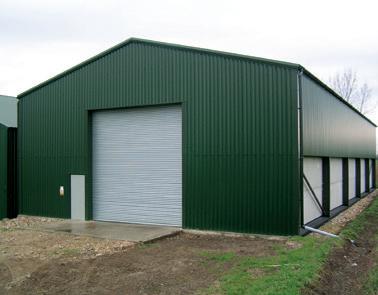
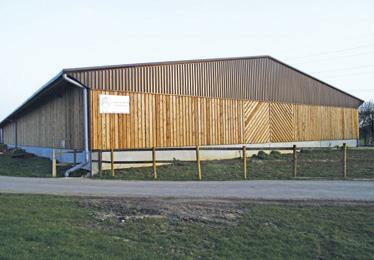



JANUARY 2023 | WWW.SOUTHEASTFARMER.NET 62 CLASSIFIEDS CONSTRUCTION CONSTRUCTION Industrial & Commercial | Structural Steelwork | Agricultural & Equestrian Contact us for a free quotation 01269 831831 enquiry@shufflebottom.co.uk www.shufflebottom.co.uk Shufflebottom Ltd Cross Hands Business Park, Cross Hands, Llanelli, Carmarthenshire SA14 6RE Shufflebottom Agricultural Buildings Steel-frame buildings for your farm + Supply only or supply & erect + Construction all over the UK + Award winning company Strength, Security, Style Office 01273 492404 � info@formabuild.co.uk www.formabuild.co.uk We specialise in the supply and construction of steel framed buildings together with the repair and refurbishment of existing farm buildings. Based in the heart of Sussex, covering the South East. Sussex builders since at least 1605. Forma offer all aspects of steel framed construction and cladding together with groundworks and electrical fit out if required. formabuild.co.uk 100% British designed & built Over 35 Years experience Site visits Call to arrange a site survey All our panels are marked Gary White 07812 599679 Jason White 07941 274751 Based in Lewes, East Sussex G.E.WHITE & SONS Ltd All refurbishments & repairs undertaken. Call for a free quote today. AGRICULTURAL, EQUESTRIAN & INDUSTRIAL STEEL FRAMED BUILDINGS We supply CONCRETE PANELS – Any size to suit your needs All aspects of steel work, cladding & groundwork. Family run business with 45 years experience. “You tried the others, now try the brothers” All our buildings are marked www.gjelgarconstruction.co.uk For more information contact us: t: 01233 623739 m: 07860 414227 e: office@gjelgarconstruction.co.uk • Steel frame buildings • Sheeting and cladding • Guttering and repairs • Groundworks and drainage • Demolition and asbestos removal • Refurbishment and change of use • Concrete frame and steel frame repairs • Insurance and general repairs • Concrete floor and block paving G. J. ELGAR CONSTRUCTION Ltd





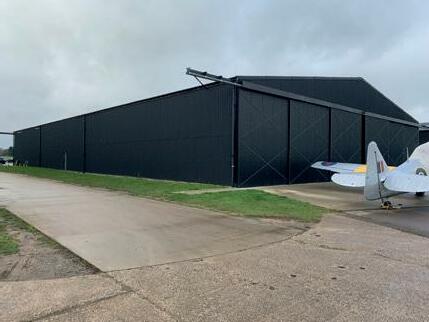






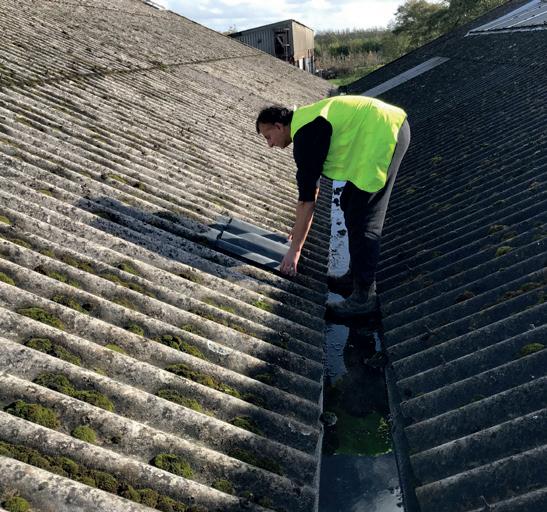
WWW.SOUTHEASTFARMER.NET | JANUARY 2023 63 TO ADVERTISE CALL 01303 233883 CLASSIFIEDS CONSTRUCTION CONSTRUCTION CONSTRUCTION Agriculture ~ Cold Storage ~ Equestrian ~ Industrial ~ Waste Recycling • Agricultural Buildings • Cold Store Buildings • Equestrian Buildings • Industrial Buildings • Waste Recycling Buildings • Structural Steel • Drawing Services • Design Services • Mezzanine Floors • Custom Steelwork 01323 890403 www.danddconstruction.co.uk info@danddconstruction.co.uk To advertise in South East Farmer telephone 01303 233883 Steel frame buildings for all your farming and agricultural needs. Visit our website or find us on social media to learn more... Supplying profiled roofing products to contractors, builders and farmers visit www.southernsheeting.co.uk for our full range or call 01342 590 357 to speak to our friendly sales team Our main products off the shelf include: • Metal sheeting • Insulated panels • Fibre cement • Rooflights • Onduline • Fixings and accessories southernsheeting.co.uk NATIONWIDE DELIVERY • EXTENSIVE RANGES IN STOCK CS3152 SS SE Farmers 190mm x 133mm advert v2.indd 2 23/11/2022 15:47 Arrange a site visit with one of our contracts managers to discuss your project in more detail by emailing enquiries@kenwardgroundworks.co.uk or call 01403 210218 www.kenwardgroundworks.co.uk Kenward Construction based in Horsham, West Sussex offer a full design and build service for your next steel framed building including composite cladding, concrete panels, roller shutter doors and bespoke designs to meet individual planning conditions. Kenward Construction also offer a wide range of services offering a truly one stop shop for your next farm building project. Demolition, plant hire, access roads, drainage, sewage treatment plants, rainwater harvesting, biobed wash downs, paving, concrete foundations / slabs, walling and site landscaping. ENWARD FREEPHONE: 01233 659129 from BT land-line charlie.woodger@btinternet.com REFURBS, BIG 6 ROOF SHEETS, ROOF LIGHTS, RIDGES, VERGES, VALLEY GUTTERS, BOX GUTTERS, BOUNDARY GUTTERS, ASBESTOS, SHEETING Single Sheet To Whole Roof Roller Shutters Accidental or Storm Damage Works Demolition Refurbishments Waste Clearances CALL TO DISCUSS YOUR PROJECT! ALL WORKS KENT & SUSSEX Professional Services to the Agricultural, Industrial & Equestrian Sectors FARM BUILDING REPAIRS


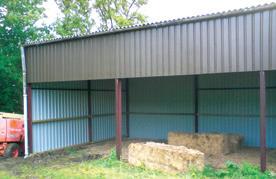
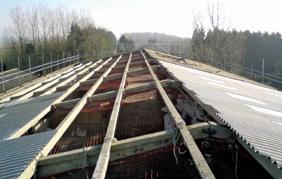
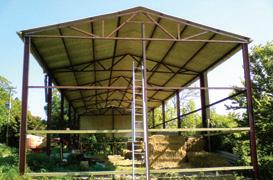


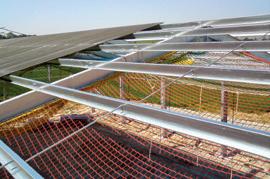
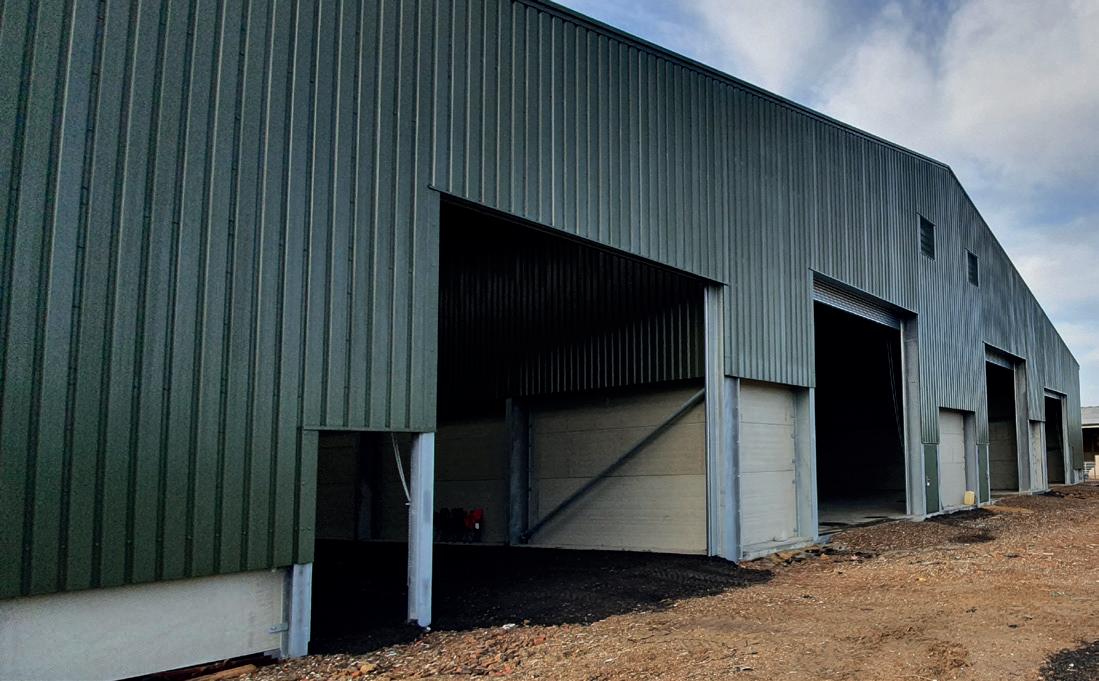
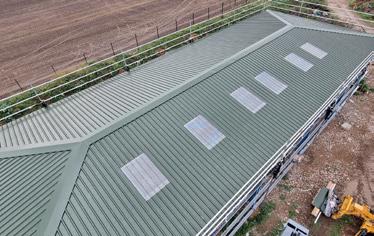






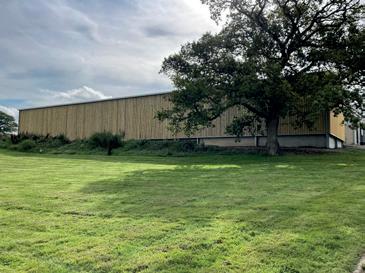
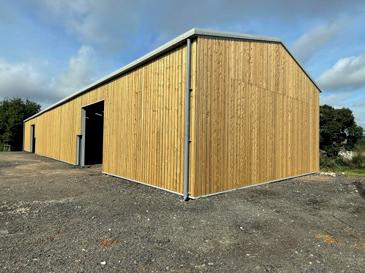


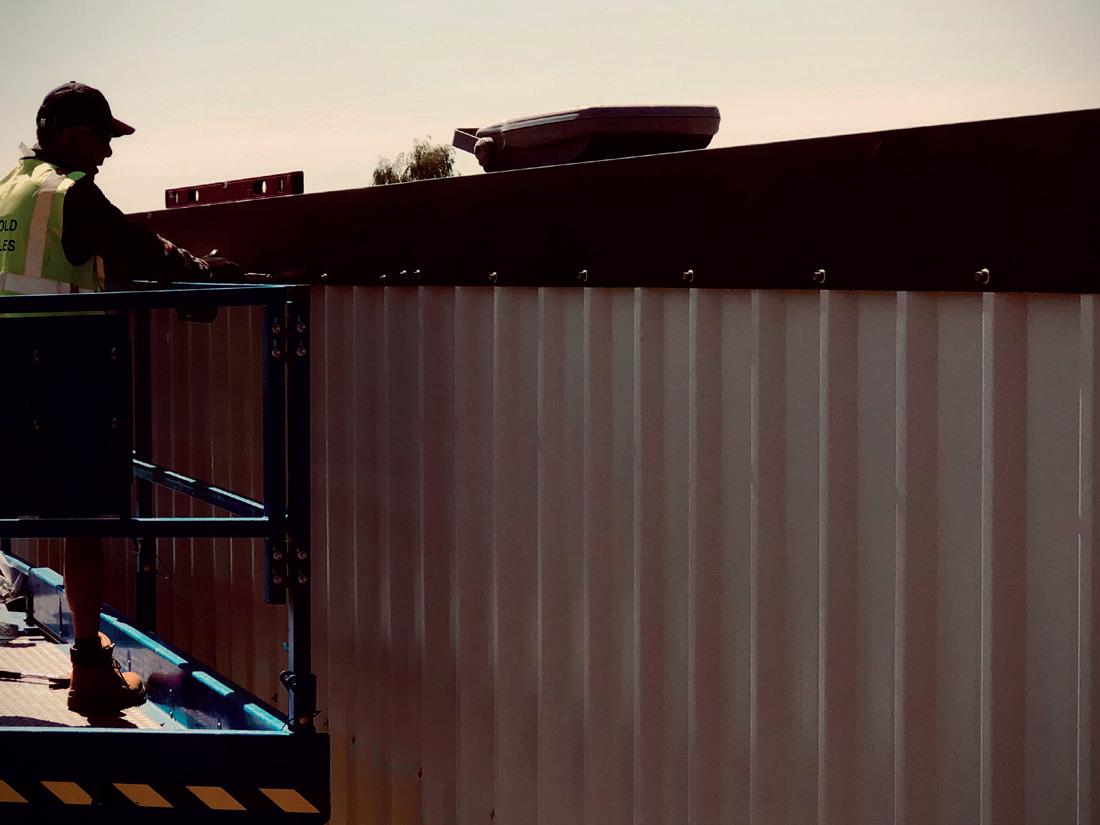






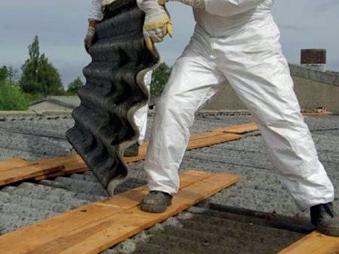

JANUARY 2023 | WWW.SOUTHEASTFARMER.NET 64 CLASSIFIEDS JPR ROOFING & CLADDING… Professional Services to the Agricultural, Industrial & Equestrian Sectors ROOFING & CLADDING Including: • Sheeting & Cladding to New & Existing Buildings • Roof repairs, Replacements and over sheeting • Insulated or single skin plastic coated sheeting in a wide range of colours • Concrete fibre sheeting, Big 6 profile etc • Asbestos sheeting removal & disposal, using registered waste carrier • Valley gutters, concrete or metal, repaired or re-lined • Roof lights replaced or covered • Maintenance Programmes to avoid the problems that occur with neglect • Conversions & extensions to existing buildings • Groundworks, Access Roads, Drives, concrete bases, Drainage etc FIRE,FLOOD & STORM DAMAGE Including: • 24 Hour Call out service • Making site/building/premises safe • Structural safety assessment • Emergency clear-up operations • Emergency procedures to reduce impact on your business or premises • Demolition/site clearance • Asbestos removal/clearance & disposal, using registered waste carrier • Re-instatement works • Insurance Claims ALL WORKS GUARANTEED Specialists in: FREEPHONE: 0800 756 9886 Covering Kent, East/West Sussex and the South East from BT land-line MOBILE: 07813 142 145 CONSTRUCTION Specialist in the Agricultural, Industrial and Equestrian sectors. Steel frame supply and erect or just supply. Sheeting, cladding and oversheeting. Gutter replacement, repairs and lining. Steel frame, concrete frame alterations and repairs. Asbestos removal. Roof light and sheet changes. Refurbishments and usage changes. Demolition, groundworks and site clearance. 24 hour call out in the event of fire or break in. Roller shutters, sliding and personnel doors. All works are guaranteed Drone surveys Aerial photography 01227 918723 Quality of work Reliability and honesty Unbeatable on price 07784 619603 jez@JRJconstruction.co.uk www.JRJconstruction.co.uk We are a Hampshire-based family run company specialising in the refurbishment, renovation, alteration and upgrade to the external envelope of buildings within the industrial, commercial and agricultural sectors. Our services Structural Steel Cladding Systems Roof Repairs Doors Gutter Maintenance Asbestos Removal Tel: 02380 617383 Email: info@symesindustrial.co.uk Web: www.symesindustrial.co.uk Units 6 & 7, Upper Norton Farm, Sutton Scotney, Hampshire SO21 3QF Industrial Commercial Agricultural Penfold’s commercial, agricultural and residential building specialists with over 40 years experience – Standing seam – Snaplock systems – Aluminium – Zinc – Copper METAL ROOFING – Composite cladding – Metal cladding – Fibre cement cladding – Timber cladding CLADDING – Removal – Disposal – Surveys ASBESTOS REMOVAL 07864 823 476 07889 481618 Nextgen Cladding Ltd www.nextgencladding.co.uk

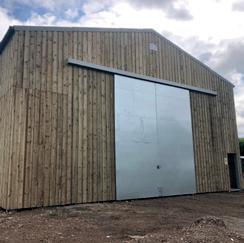








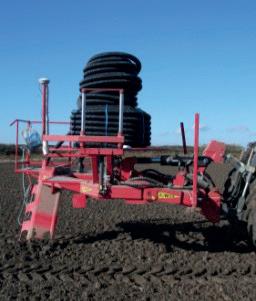

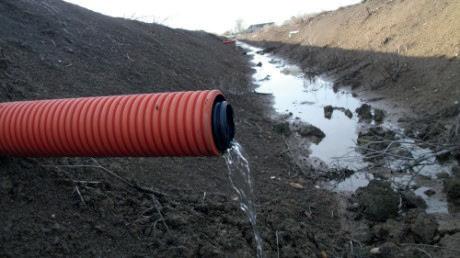
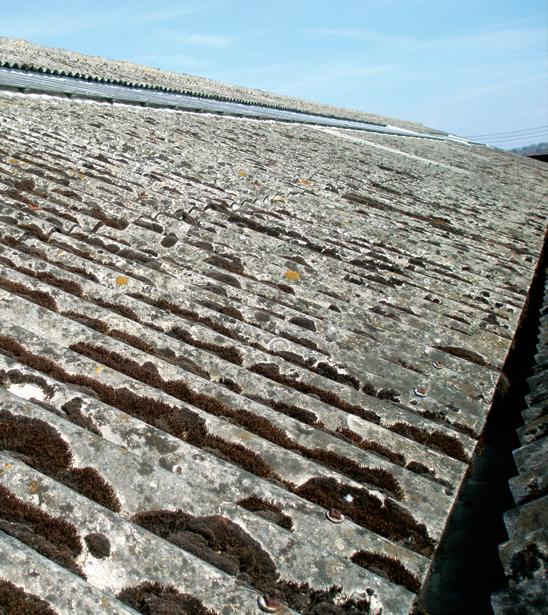
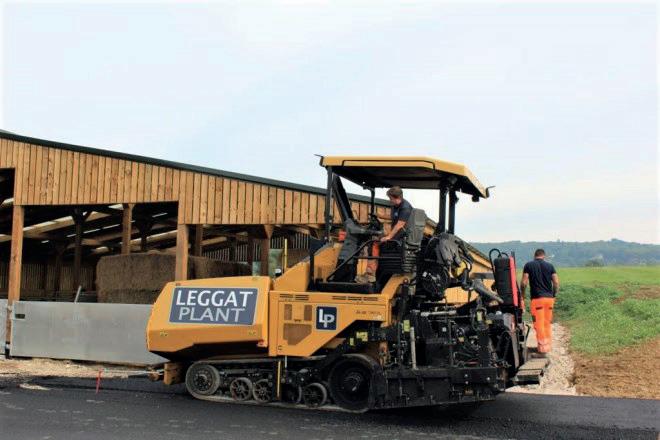
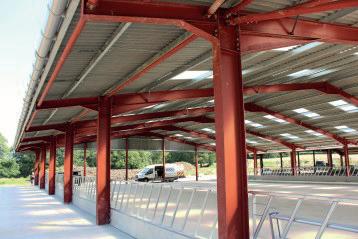

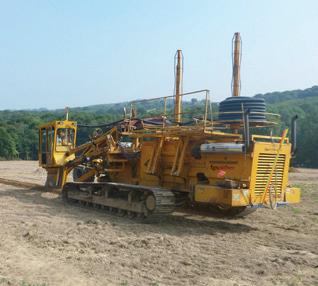
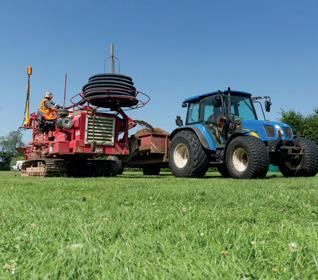
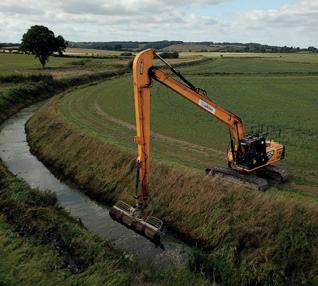
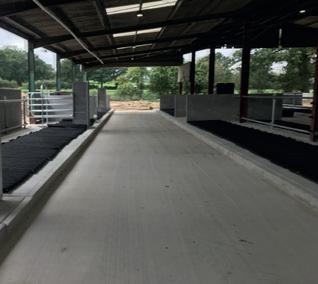
WWW.SOUTHEASTFARMER.NET | JANUARY 2023 TO ADVERTISE CALL 01303 233883 CLASSIFIEDS CONTRACTORS Mobile: 07976 287836 Email: sales@shortlandstructures.com www.shortlandstructures.com • STEEL FRAMED BUILDINGS • CLADDING • ERECTING • • EXTENSIONS • ALTERATIONS • CONCRETE PANELS • ROLLER/SLIDING/PERSONNEL DOORS • SHORTLAND STRUCTURES LTD ● LAND DRAINAGE ● DITCHING ● POND WORK ● WATER SUPPLIES ● SEWAGE TREATMENT PLANTS ● GROUNDWORKS ● PLANT HIRE 360° EXCAVATORS FOR ESTIMATES & ENQUIRIES (01622) 890884 G & S BROWN Drainage Contractors Working with farmers since 1947 Email: info@brownsdrainage.co.uk www.brownsdrainage.co.uk SWA SW ATTWOOD & PARTNERS • FIELD MAPPING • DRAINAGE SURVEYING • DESIGN • DRAINAGE FOR FURTHER INFORMATION OR VISIT OUR WEBSITE TOM: 01795 880441 or 07943 192383 EMAIL: james@swattwood.com S W ATTWOOD & PARTNERS LAND DRAINAGE james@swattwood.com PLEASE CONTACT US OR VISIT OUR www.attwoodfarms.com GRAIN STORAGE & LAND DRAINAGE PLANT HIRE INERT TIPPING CLAY SALES FROM £220 PER ACRE FIELD MAPPING DRAINAGE SURVEYING DESIGN DRAINAGE LAND DRAINAGE www.swjfattwood.com S W ATTWOOD & PARTNERS LAND DRAINAGE PHONE: 01795 880441 EMAIL: james@swattwood.com FOR FURTHER INFORMATION PLEASE CONTACT US OR VISIT OUR WEBSITE: www.attwoodfarms.com GRAIN STORAGE & TESTING LAND DRAINAGE PLANT HIRE INERT TIPPING CLAY SALES FROM £220 PER ACRE DRAINAGE SURVEYING S W ATTWOOD & PARTNERS LAND DRAINAGE EMAIL: james@swattwood.com PLEASE CONTACT US OR VISIT OUR www.attwoodfarms.com GRAIN STORAGE & TESTING LAND DRAINAGE PLANT HIRE INERT TIPPING FROM £220 PER ACRE DRAINAGE SURVEYING DRAINAGE CONSTRUCTION CONTRACTORS FREEPHONE: 01233 659129 from BT land-line charlie.woodger@btinternet.com Asbestos roof sheeting removals Asbestos encapsulation Asbestos fire damage, clearance & re-instatement works Asbestos clearance & de-contamination Asbestos disposals by licenced registered company New metal roofs installed over old asbestos roofs Roof light & sheet repairs Gutter repairs Gutter replacements & re-lining Strip & refurbishment works Change of use projects Demolition & Groundworks CALL TO DISCUSS YOUR PROJECT! Professional Services to the Agricultural, Industrial & Equestrian Sectors ALL RISKS LTD ASBESTOS ROOF REMOVALS CIVIL ENGINEERING GROUNDWORKS CONSTRUCTION BUILDING ERECTION LIVESTOCK & CROP STORAGE SOLUTIONS LAND DRAINAGE SYSTEMS NEW SERVICES INSTALLATIONS FOUNDATION EXCAVATIONS ASPHALT PAVING & SO MUCH MORE! sales@leggatplant.com @leggatplant @leggatplant 01342 325738 | leggatplant.com LAND DRAINAGE, EARTHWORKS, GROUNDWORKS & CONSTRUCTION FULL LAND DRAINAGE SERVICE Sportsfields, amenity and irrigation systems using Mastenbroek trenchers PONDS, LAKES & RESERVOIRS Construction and maintenance GROUNDWORKS & CONSTRUCTION Primary excavations, aggregate sub-base, agricultural construction and concreting ENVIRONMENTAL HABITATS Water course maintenance and improvement works For all enquiries call 01233 860404 or 07770 867625 (Harvey) T P DRAINAGE AND GROUNDWORKS Treatment Plants, slurry pits, ditches, field irrigation, concrete bays and footings, cattle grids, grubbing out hedges and trees. Call 07494 269848 Email tommypenfold24@gmail.com
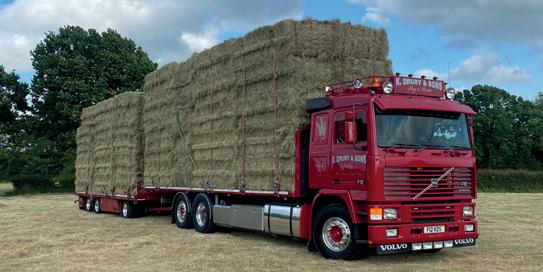


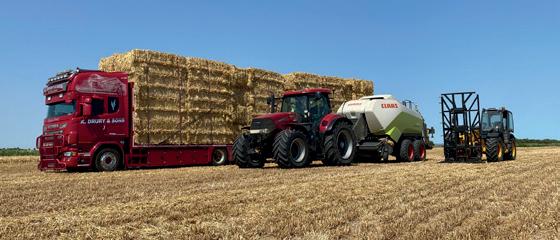


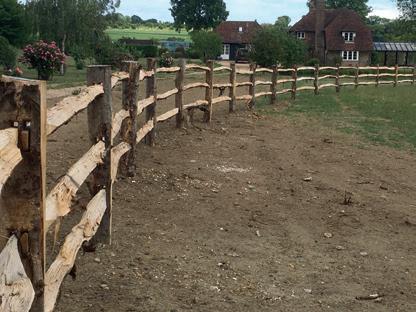

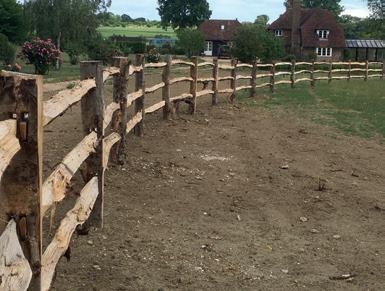


















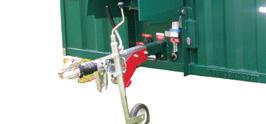






















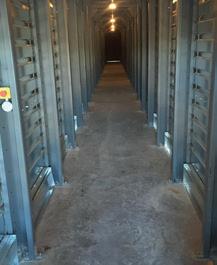
JANUARY 2023 | WWW.SOUTHEASTFARMER.NET 66 CLASSIFIEDS To advertise in South East Farmer telephone 01303 233883 HAULIERS CONTAINERS FENCING HAY & STRAW IN STOCK | ROUND & BIG SQUARE BALES 07860 728204 Hay & Straw Merchant | Machinery Haulage Find us on Facebook FOR HIRE CROP DRYING FOR SALE CWP fencing Tel: 07985 298221 colin@cwpfencing.co.uk Standing Sweet Chestnut Wanted Cleft post and rail Cleft field gates Fencing stakes Straining posts Chestnut fencing Tel: 07985298221 colin@cwpfencing.co.uk Standing Sweet Chestnut Wanted Cleft post and rail Cleft field gates Fencing stakes Straining posts Chestnut fencing Tel: 07985298221 colin@cwpfencing.co.uk Standing Sweet Chestnut Wanted Cleft post and rail Cleft field gates Fencing stakes Straining posts Chestnut fencing Redhill Farm Services: Fencing Division ALL TYPES OF FENCING & GATES Supplied and erected & Repairs Tel: 01737 821220 Mob: 07768 931891 Email: redhillfarmservices@gmail.com STORAGE TANKS Visit www.smdd.co.uk or call 01594 833308 Buy from stock. Visit us to collect or same day dispatch with nationwide delivery. New and recycled IBC tanks. Plastic and steel drums. Water tanks & plenty of fittings. Smiths of the Forest of Dean The Tank and Drum Experts Visit www.smdd.co.uk or call 01594 833308 Buy from stock. Visit us to collect or same day dispatch with nationwide delivery. New and recycled IBC tanks. Plastic and steel drums. Water tanks & plenty of fittings. Smiths of the Forest of Dean The Tank and Drum Experts • Toilets & Showers for hire • Large range of Temporary canteens, stores & welfare units • E uent Tank Emptying • Events also catered for with chillers & toilets FOUR JAYS GROUP Tel: 01622 843135 Fax: 01622 844410 enquiries@fourjays.co.uk www.fourjays.co.uk HIRE SPECIALISTS ACROSS THE SOUTH EAST Container Sales & Rental New & Used Guaranteed Wind/Watertight equipment 10ft, 20ft & 40ft Equipment available Crawley – viewing by appointment only Freight Container Services (FCS) 01403 268723 • 01636 616335 • 07831 142 401 sales@fcs-uk.co.uk www.freightcontainerservices.com ENT Machines E: enquiries@kentmachines.co.uk T: 01732 884 551 • Mini Diggers • Telehandlers • Forklifts • Trailers @kentmachines.co.uk for SALE @KentMachines Kent Machines Ltd www.kentmachines.co.uk www.pellcroft.com | sales@pellcroft.com | 01526 342466 PELLCROFT Manufacturers of centrifugal, low volume and portable fans, air tunnels, drive over oors, grain stirrers and gas burners
ACROSS
Mistimed explosion in the exhaust (8)
Surplus to requirement (5)
Cumbrian Fell on shore of Derwent Water (8)
A member of lowest order of the British nobility (5)
Wound dressing (7)
A range of chalk hills in southern England (8,5)
Highest mountain in Wales (7)
Boneless piece of meat (6)
Item of clothing (1,5)
Become liquid by heating (4)
Misleading, underhand, untruthful (9)
Romantic nocturnal illumination (9)
The person who receives guests at a party (4) DOWN

Cured pork (5)
Successfully receive a throw (5)
Body parts (4)
Let go of something (7)
Put something down specifically (5)
Unruly (7)
Money (4)
Happy (4)
Belief in oneself (9)
---- of Wight (off the south coast of England) (4)
Inventive, thoughtful humour (3)
Causing death (5)
Sight organ (3) 20 Rows of houses separated by a road (6)
Thin strip used to light fire (5)
Decaying leaves, bark or compost for plants (5)
MONTH’S ANSWERS:
Correct answer: Treponema
LAST MONTH’S WINNER: Shirley Avis from Stone in Oxney, Kent
WWW.SOUTHEASTFARMER.NET | JANUARY 2023 67 TO ADVERTISE CALL 01303 233883 1 2 3 4 5 6 7 8 9 10 11 12 13 14 15 16 17 18 19 20 21 22 23 24 25 26 1 2 3 4 5 6 7 8 9 10 11 12 13 14 15 16 17 18 19 20 21 22 23 24 25 26 ® VI NE YA R DS COMPLETE OUR CROSSWORD TO WIN Booze free Biddenden box VI NE YA R DS I M P E R F E C T B R A N A A X L L P R I N C I P L E O F F A U N E L R A A T O T E R A P P O R T L S I T F C O M M O N T O A D F L A X O U R S N U G G L E C H I V E S G A O P W A E S C U F F L E F E U D R A E O E V D E C E P T I O N V I E E G E C C L E A R A N C E R A G E
PRIZE ANAGRAM: Rare breed pig (7,10) CROSSWORD
LAST
5
8
9
To enter, simply unscramble the anagram (7,10) using the green squares.
your replies with your
and
If dry January is on the cards we’re offering readers the chance to win a booze free Biddenden box. Enter the crossword to be in with a chance of winning four bottles of our favourite wine, Ortega. For more information about the vineyards, please visit www.biddendenvineyards.com or call 01580 291726. *Subject to availability
1
12
14
16
18
21
23
24
25
26
1
2
3
4
6
7
10
13
14
15
17
18
19
22
23
Email
name, address
phone number to sef.ed@kelsey.co.uk Correct entries will be entered into a draw which will take place on 24 January. The winner will be announced in the February edition.
Crossword by Rebecca Farmer, Broadstairs, Kent

All the latest livestock and arable machinery from the biggest manufacturers in one place! West Country Farming & Machinery Show Brought to you by Sponsored by: Auction Sponsor: AGRI & PLANT DIVISION AGRI & PLANT DIVISION HUGE RANGE OF NATIONAL MANUFACTURERS ANDDEALERSREGIONAL Terms and conditions apply: *Subject to final approval. ^Limited availability, other food options available. STOP Live auction of over 200 farm machinery items STOP Handling demonstrations by Case IH, Merlo, John Deere, Manitou, Zetor and JCB STOP Extensive indoor/outdoor exhibitor area –covering more than 9,000 sq m of exhibition space STOP FREE to attend STOP BASIS, FACTS and NRoSO points available* STOP Dedicated NAAC lounge for professional farm contractor members and visitors STOP FREE Devon bacon roll^ for all early bird arrivals! STOP Experience the latest John Deere Gator with all proceeds going to charity STOP Series of seminars on topics relevant to farmers and farming today Wednesday 22 February 2023 at Westpoint Exeter REGISTER FOR YOUR FREE TICKET AT www.westcountryfarmmachineryshow.co.uk Everyone who registers and attends will be entered into a prize draw to win an iPad worth £499! Register toWin




















































































































































































































































































































































































































































































































































































































































































































































































































































































































































































































































































































































































































































































































































































































































































































































































